Risultati: 84

Area Politica internazionale
Competenze: economia della Cina, espansione commerciale cinese, geo-economia, guerre commerciali, investimenti cinesi all’estero, Nuova Via della Seta, relazioni economiche e commerciali tra Europa e Asia
Parole chiave: Cina, coronavirus, Covax, Covid-19, Covid-19: impatto socio-economico, diplomazia dei vaccini, guerra commerciale sui vaccini, investimenti cinesi all’estero, relazioni Europa-Cina, reti di commercio internazionale
Regione: Lombardia
Funzione/Ruolo
Co-Head Asia Centre e Senior Associate Research Fellow ISPI, Professoressa associata di Politica Economica presso l’Università del Piemonte Orientale, vice-direttrice del Master in Politics, Economics and Culture of China, Università Cattolica di Milano
Percorso professionale
Dopo un incarico come Associate Economist presso l’UNCTAD dal 2003 al 2006, diventa professoressa di Economia Politica e dal 2015 Senior Associate Research Fellow e Co-Head del Programma Asia dell’ISPI
Risultati scientifici
Coordinatrice Scientifica di progetti di ricerca sulle relazioni economiche e commerciali tra Europa e Asia per il Parlamento Europeo e il Ministero degli Affari Esteri. I principali filoni di ricerca riguardano le reti di commercio internazionale e di investimenti esteri, l’espansione cinese attraverso commercio e investimenti.
Attività editoriali e pubblicazioni
(2018) Amighini A., "China’s New Economic Powerhouse", in Amighini A. (ed.), China champion of (which) globalisation?, ISPI.
(2017) Amighini A., "The Belt and Road Initiative: A Game Changer in International Trade?" in Amighini, A. (ed.), The Belt and Road Initiative: A Game Changer?, ISPI.
(2017) Amighini A., McMillan M., Sanfilippo M., FDI and Capital Formation in Developing Economies: New Evidence from Industry- level Data, NBER Working Paper No. 23049.
(2016) Amighini A., "Dream a Little Dream of China?", in Amighini, A. (ed.), China Dream: Still Coming True?, ISPI.
(2016) Amighini A., Trade and economic relations with Asia, Policy Department, Directorate-General for External Policies of the European Parliament, available at https://polcms.secure.europarl.europa.eu/cmsdata/upload/e7716c4a-5bdb-4f42-aa21- 2ed45dc0f51f/Workshop-Asia-trade.pdf (with E. Borghi, R. Helg, L. Tajoli)
(2016) Amighini A., The EU external trade strategy vis-à-vis Asia, Policy Department, Directorate-General for External Policies of the European Parliament, available at https://polcms.secure.europarl.europa.eu/cmsdata/upload/e7716c4a-5bdb-4f42-aa21- 2ed45dc0f51f/Workshop-Asia-trade.pdf
(2016) Amighini A., The EU-Korea FTA: implementation and lesson learning, Policy Department, Directorate-General for External Policies of the European Parliament, available at https://polcms.secure.europarl.europa.eu/cmsdata/upload/e7716c4a-5bdb-4f42-aa21-2ed45dc0f51f/Workshop-Asia- trade.pdf
(2015) Amighini A., "China’s Economic Growth: Heading to a ‘New Normal’", in Amighini A. and Berkofski A. (eds), Xi’s policy gambles: The bumpy road ahead, ISPI, 2015, ISBN 978-88-98014-63-7
(2015) Amighini A., Is labor flexibility a substitute to offshoring? Evidence from Italian manufacturing, International Economics Vol. 142, pp. 81-93 (with Presbitero A. F. and M. G. Richiardi)
(2015) Amighini A., Multinational Enterprises from Emerging Economies: What theories suggest, what evidence shows. A literature review, Economia e Politica Industriale, Vol. 42 (3), pp 343-370.
(2014) Amighini A., Sanfilippo M., Impact of South-South FDI and Trade on the Export Upgrading of African economies,World Development, Vol. 64, pp. 1-17.
(2014) Amighini A., Gorgoni S.,The International Reorganization of Auto Production, World Economy, Vol. 37 (7), pp. 923-952.
(2013)Amighini A., Rabellotti R., Sanfilippo M., Do Chinese state-owned and private enterprises differ in their internationalisation strategies?, China Economic Review, Vol. 27, pp. 312-325.
Riconoscimenti e premi
Uno dei suoi articoli scientifici sull’espansione cinese all’estero attraverso gli investimenti delle imprese cinesi, private e pubbliche, pubblicato sul China Economic Review, è stato premiato come il più letto del 2015.

Area Politica internazionale
Competenze: Bab el-Mandeb, conflitto in Yemen, eserciti arabi e relazioni civili-militari, partnership tra NATO e monarchie del Golfo, penisola arabica, politica interna ed estera delle monarchie del Golfo
Parole chiave: Arabia Saudita, Bahrein, Emirati Arabi Uniti, Golfo arabico, Kuwait, Oman, Qatar, sicurezza marittima, Yemen
Regione: Lombardia
Funzione/Ruolo
Analista geopolitica. Associate Research Fellow, Istituto per gli Studi di Politica Internazionale (ISPI). Cultrice della materia, Università Cattolica di Milano. Gulf Analyst, NATO Defense College Foundation. Docente a contratto, Alta Scuola di Economia e Relazioni Internazionali (Aseri, MIMES)
Percorso professionale
Laureata triennale in Scienze linguistiche per le Relazioni Internazionali all’Università Cattolica di Milano, ha conseguito la laurea magistrale in Politiche Europee e Internazionali presso lo stesso ateneo. Diplomata in Affari Europei all’Istituto per gli Studi di Politica Internazionale (ISPI), ha conseguito un Master di primo livello in Middle Eastern Studies presso Aseri (MIMES-Alta Scuola di Economia e Relazioni Internazionali, Milano). Dal 2012 è analista geopolitica per numerose riviste specializzate e istituti di ricerca, italiani e stranieri. Dal 2013 collabora regolarmente con ISPI, Aspenia online e AffarInternazionali. Dal 2016 è commentatrice di politica internazionale per il quotidiano italiano Avvenire(Medio Oriente) e realizza studi di approfondimento per il Parlamento italiano (“Osservatorio Parlamentare”). Dal 2018 svolge altresì attività seminariali e di docenza su Yemen e relazioni civili-militari nel mondo arabo all’Università Cattolica di Milano, all’Aseri e presso ISPI.
Risultati scientifici
Tra i pochissimi analisti e ricercatori italiani con competenze sullo Yemen, Eleonora Ardemagni ha approfondito in particolare le dinamiche interne, tribali-militari e di sicurezza, nonché il ruolo delle potenze regionali nel paese, soprattutto Arabia Saudita ed Emirati Arabi Uniti. Nel 2019, ha pubblicato una monografia sugli huthi (gli insorti sciiti del nord dello Yemen) per il CRiSSMA (Centro di Ricerche sul Sistema Sud e il Mediterraneo Allargato dell’Università Cattolica di Milano). É autrice di alcune pubblicazioni, anche in uscita, sulla politica estera e sulla geopolitica di Arabia Saudita ed Emirati Arabi Uniti. Ardemagni si occupa inoltre del tema della sicurezza ibrida nel mondo arabo, nonché del rapporto fra eserciti e milizie; a riguardo, ha co-editato per ISPI una serie di pubblicazioni online con Carnegie Middle East Center (Beirut) e realizzato un policy brief sull’ipotesi di istituire una Guardia Nazionale in Yemen, frutto di uno scambio di idee con l’Ufficio dell’Inviato Speciale del Segretario delle Nazioni Unite in Yemen (OSESGY). Sta attualmente approfondendo l’introduzione della leva militare obbligatoria e il ruolo dei militari nell’evoluzione politica delle monarchie del Golfo (con focus su Emirati Arabi Uniti, Qatar, Kuwait e Oman), come autrice del capitolo “Arab Gulf States: Expanding the Role for the Military-From Rulers Protectors to Nation-Builders”, che apparirà nella “Oxford Encyclopedia of the Military in Politics”, curata da William R. Thompson per la Oxford University Press. Tra i suoi interessi di ricerca, nonché fra le recenti pubblicazioni, vi è anche il tema della sicurezza marittima nel triangolo Penisola Arabica-Bab el Mandeb-Golfo di Aden, con particolare riferimento alle implicazioni strategiche dei porti commerciali e agli stretti marittimi (choke-points).
Attività editoriali e pubblicazioni
Gli articoli, saggi, papers, nonché pubblicazioni scientifiche di Eleonora Ardemagni sono apparsi in:
Afriche e Orienti, International Studies Journal, NATO Defense College, NATO Review, ORIENT-German Journal for Politics, Economics and Culture of the Middle East, LSE Middle East Centre Blog, Arab Gulf States Institute in Washington (AGSIW), Gulf Affairs-Oxford University, Future Centre (FARAS, UAE), Carnegie Sada, Carnegie Middle East Center, Middle East Institute (MEI), Istituto Affari Internazionali (IAI), ITSTIME-Catholic University (Milan), Eastern Mediterranean Policy Notes-University of Nicosia, Storia Urbana, Orizzonte Cina-T.wai, CeSi, Limes, Fondazione Oasis, World Energy, Reset-Dialogue On Civilizations.
Tra le principali pubblicazioni (anche scientifiche):
[2015] Ardemagni E., La politica estera come sistema di ri-generazione dei sistemi autoritari: lo Yemen fra mutamento e continuità, Afriche e Orienti, No. 1-2
[2016] Ardemagni E., United Arab Emirates’ Armed Forces in the Federation-Building Process: Seeking for Ambitious Engagement, International Studies Journal47, Vol.12, No. 3, Winter
[2016] Ardemagni E., Framing AQAP’s intra-jihadi hegemony in Yemen: shifting patterns of governance and the importance of being local, Sicurezza, Terrorismo e Società, International Journal, Italian Team for Security, Terroristic Issues & Managing Emergencies (ITSTIME), Vol.4, 2
[2016] Ardemagni E., Emiratization of Identity: Conscription as a Cultural Tool of Nation-Building, Gulf Affairs, OxGAPS-Oxford Gulf & Arabian Peninsula Studies Forum, Oxford University, St Antony’s College, Autumn
[2018] Ardemagni E., Oltre la rendita: la politica estera interventista dell’Arabia Saudita, in Colombo A., Magri P., Sempre più un gioco per grandi. E l’Europa?, ISPI
[2018] Ardemagni E., “New Armies for a New Era. Decrypting post-2011 Arab Military Reforms”, (con Umberto Profazio), NATO Defense College, Research Paper n°145
[2018] Ardemagni E., The Persian Gulf Rimland: Federalism, Geostrategy and Patronage in Contemporary Southern Yemen, International Studies Journal 56, Vol.14, No. 4, Spring
[2019] Ardemagni E., Yemen’s nested conflict(s): Layers, geographies and feuds, ORIENT-German Journal for Politics, Economics and Culture of the Middle East, No.2, pp. 35-41.
[2019] Ardemagni E., Hormuz e Bab el-Mandeb, le porte del petrolio, in Gulf Vision, World Energy, n°42,.
[2019] Ardemagni E., The Huthis: Adaptable Players in Yemen’s Multiple Geographies, CRiSSMA-Centro di Ricerche sul Sistema Sud e il Mediterraneo Allargato dell’Università Cattolica di Milano, Educatt, N° 25, ISBN: 978-88-9335-465-3.

Funzione/Ruolo
Direttrice di Canergie Europe
Percorso professionale
Laurea in Storia all’Università di Cambridge, Master in Studi europei e Dottorato in Relazioni internazionali, entrambi alla London School of Economics and Political Science, Rosa Balfour ha unito gli studi con il lavoro come ricercatrice a Roma e a Bruxelles all’European Policy Centre, dove ha diretto il programma ‘Europe in the World’ e si è occupata principalmente di politica estera europea (relazioni EU-Est Europa, Mediterraneo, allargamento dell’Unione europea, tra le altre tematiche), oltre ad avere co-diretto l’istituto. Il suo lavoro ha compreso ricerca, gestione di ricercatori, analsi delle policies, fund-raising, public speaking. Nel 2015 Balfour inizia a lavorare al German Marshall Fund of the US, a Bruxelles, dove espande il suo profilo di ricerca dalla politica estera alla politica europea, focalizzandosi sul nesso tra politica interna europea e politica internazionale.
Nel 2018 e nel 2019 lavora sul programma Europe's Futures presso l'Istituto di Scienze Umane di Vienna.
Nel 2020 diventa direttrice di Carnegie Europe, uno dei più influenti think tank di Bruxelles, parte della rete mondiale di Carnegie Endowment for international peace, con sedi a Washington, Pechino, Mosca, Nuova Delhi e Beirut.
Dal 2021 è anche patrona onoraria dell'Associazione universitaria per gli studi europei contemporanei (UACES).
Risultati scientifici
Oltre a numerose pubblicazioni, che hanno contributo al dibattito e alle scelte di policy nell’Unione europea, Rosa Balfour è consultata regolarmente da governi, istituzioni dell’Unione europea, parlamenti, e società civile su molte tematiche legate al suo lavoro. E’ stata membro di comitati di ricerca e consultativi (ad esempio del Joint Research Centre della Commissione europea e dell’Advisory Committee di Save the Children a Bruxelles). Rosa viene tiene corsi di formazione, lezioni universitarie e discorsi presso le istituzioni, le università, le organizzazioni non-governative.
Attività editoriali e pubblicazioni
Rosa Balfour ha pubblicato libri accademici, policy paper, e contribuito ai dibattiti sulla politica europea e internazionale con articoli brevi e commenti. Qui sotto una selezione di pubblicazioni recenti:
[2019] Balfour R., Article 50 extension: Why time for the UK to live through its crisis is also good for Europe, LSE Brexit Blog, https://blogs.lse.ac.uk/brexit/2019/03/20/long-article-50-extension-why-time-for-the-uk-to-live-through-its-crisis-is-also-good-for-europe/
[2019] Balfour R., Bouchet N., and Forbrig J.,Improving EU-U.S. Cooperation in Civil Society Support in Eastern Europe and the Western Balkans, GMF Policy Paper, http://www.gmfus.org/publications/improving-eu-us-cooperation-civil-society-support-eastern-europe-and-western-balkans
[2019] Balfour R.,What the Brexit shambles says about the state of British democracy,http://www.gmfus.org/blog/2019/01/17/what-brexit-shambles-says-about-state-british-democracy
[2019] Balfour R., A progressive and European foreign policy in a hostile environment, The Progressive Post, No. 11, Spring 2019.
[2018] Balfour R., ‘Human Rights in the European Neigbhourhood Policy’, in Tobias Schumacher, Andreas Marchetti and Thomas Demmelhuber (eds.), The Routledge Handbook on the European Neighbourhood Policy, London: Routledge, pp. 481-493.
[2018] Balfour R., ‘Polarization in Europe: Public Opinion and European Foreign Policy’, in Dan S. Hamilton and Teija Tiilikainen (eds.), Domestic Determinants of Foreign Policy in the European Union and the United States, Washington, DC: Centre for Transatlantic Relations, pp.79-95.
[2017] Balfour R.,What are think tanks for? Policy research in the age of anti-expertise, published by LSE, http://www.lse.ac.uk/ideas/research/updates/think-tanks
[2015] Balfour R., Carta C. and Raik K. (eds.), The European External Action Service and National Foreign Ministries: Convergence or Divergence?, Farnham: Ashgate.
[2012] Balfour R., Human Rights and Democracy in EU Foreign Policy. The Cases of Ukraine and Egypt, London: Routledge, reprinted as a paperback in 2014.
Riconoscimenti e premi
A settembre 2018 Rosa entrata a far parte del programma Europe’s Futures presso l’Istituto di Scienze Umane a Vienna come non-resident fellow. Rosa è anche membro dello Steering Committee di WIIS-Brussels (Women In International Security), una Associate Fellow presso LSE Ideas, e una Senior Adviser to the European Policy Centre, tra i suoi incarichi attuali.

Funzione/Ruolo
Professoressa Associata in Scienza Politica all'Università di Bologna.
Percorso professionale
Elena Baracani consegue il dottorato in Scienza Politica presso l'Università di Firenze nel 2006. Viene nominata vice direttrice del Centro di Ricerca Interuniversitario di Ricerca sul Sud Europa (CIRES) presso l'Università di Firenze (2006-08). Nel 2008 vince una borsa di ricerca post-dottorato nell'ambito del programma ‘European Foreign and Security Policy Studies’, finanziato dalla Compagnia di San Paolo. Svolge la sua ricerca post-dottorale presso l’Istituto Italiano di Scienze Umane (attualmente Scuola Normale Superiore). Nel 2008 risulta vincitrice di una Visiting Fellowship presso l'Istituto di Studi sulla Sicurezza dell’Unione europea. Svolge le funzioni di segretaria scientifica del Dottorato di Ricerca in Scienza Politica presso l'Istituto Italiano di Scienze Umane (adesso Scuola Normale Superiore) a Firenze (2011-14). Insegna numerosi corsi di Scienza Politica a livello di laurea triennale, magistrale e di dottorato, presso università italiane (Università di Firenze, Università per Stranieri di Perugia, Istituto Italiano di Scienze Umane e LUISS) e americane (Rutgers University, Kent State University e California State University). Dal 2012 insegna un corso intitolato EU Politics and Crisis presso la Stanford University a Firenze. Nel 2013 diventa ricercatrice in Scienza Politica presso il Dipartimento di Scienze Politiche e Sociali dell’Università di Bologna, dove nel 2019 diventa Professoressa Associata. Nel 2022 vince la Cattedra Jean Monnet EUGlobA (The EU as a Global Actor).
Risultati scientifici
Al momento è responsabile scientifica del progetto Erasmus Jean Monnet EUGlobA (The EU as a Global Actor) e co-responsabile scientifica per l’Università di Bologna del progetto Erasmus Youth RE-ACT IN (Rethinking Arts for Cohesion, Trust and Inclusion). Nel corso della sua carriera ha partecipato a numerosi progetti di ricerca nazionali e internazionali.
Attività editoriali e pubblicazioni
[2022] Baracani E, Sarotto V. The European Commission’s role in EU-Turkey migration: political leadership through strategic framing, West European Politics, https://doi.org/10.1080/01402382.2022.2066934
[2022] Baracani E, EU Democracy Promotion in Times of Crisis. In: The Foreign Policy of the European Union: Assessing Europe’s Role in the World, Brookings
[2021] Baracani E. EU-Turkey Relations: A New Direction for EU Foreign Policy?. Edward Elgar Publishing
[2021] Baracani E. Evaluating EU Actorness as a State-Builder in ‘Contested’ Kosovo’, Geopolitics, 25(2): 362-386
[2021] Baracani E. Le sfide per la politica estera dell’Unione europea in tempi di crisi. In: Relazioni internazionali. Dalle tradizioni alle sfide. Carocci Editore
[2020] Baracani E, Mingardi C. L’asse franco-tedesco nel nuovo ciclo politico dell’Unione Europea, Aggiornamenti Sociali, 71(2): 112-121
[2019] Baracani E, Calimli M. Shifting Dynamics in Turkish Foreign Policy in the Trans-European Space. In: The EU in a Trans-European Space External Relations across Europe, Asia and the Middle East. Cham: Palgrave Macmillan [2017]
[2017] Baracani E, Calimli M. (eds) European Perspectives on Turkey's Domestic Politics and Foreign Policy. Trento: Bruno Kessler Foundation Press
[2017] Baracani E. Graham Allison: Conceptual Frameworks of Foreign Policy Decision Making. In: Classic Works in International Relations. Bologna: Il Mulino
[2016] Baracani E, Calimli M. Evaluating Effectiveness in EU Democracy Promotion: The Case of Turkey, Rivista Italiana Di Politiche Pubbliche, 2016 (3): 427-455
[2016] Baracani E. The European Union and conflict prevention. What Europeanization?. World Political Science Review, 12: 219-239
[2015] Baracani E. L'Unione Europea e la prevenzione dei conflitti Quale Europeizzazione?. Rivista Italiana Di Politiche Pubbliche, 2015 (1): 5-30 [2014] Baracani E. L’Unione europea e la prevenzione dei conflitti. Un’analisi comparata di tre casi di studio: Cipro, Kosovo e Palestina. Bologna: Il Mulino.
Riconoscimenti e premi
Il suo libro più recente EU-Turkey Relations (Edward Elgar 2021) ha vinto il premio UACES 2022 per il miglior libro.
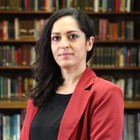
Funzione/Ruolo
Ricercatrice presso il Royal United Services Institute sul Medio Oriente nel Dipartimento di studi sulla sicurezza internazionale. Visiting Fellow presso il King's College London e Consulente della NATO sull’Afghanistan.
Percorso professionale
Aniseh Bassiri Tabrizi è ricercatrice al Dipartimento di sicurezza internazionale del Royal United Services Institute (RUSI). E’ anche Visiting Fellow presso il Dipartimento di War Studies del King's College a Lobndra e consulente presso un panel di esperti sponsorizzato dalla NATO sull’Afghanistan. Si occupa di sicurezza nel Medio Oriente, focalizzandosi in particolare su politica interna ed estera iraniana, gruppi armati, proliferazione nucleare e droni.
Ha completato il PhD presso il War Studies Department al King’s College London, focalizzandosi sull’iniziativa diplomatica di Francia, Germania e Gran Bretagna sulla questione nucleare iraniana.
Prima di iniziare la sua attività presso RUSI, era un’Associate Fellow allo European Council on Foreign Relations (ECFR), dove si è specializzata sulla politica estera europea e sulle relazioni transatlantiche sull’Iran, in particolare guardando all’impatto delle sanzioni.
Prima di ECFR, ha lavorato come ricercatrice sull’Iran a Oxford Research Group, mentre contribuiva ad analisi di rischio politico per varie agenzie di consulenza.
Risultati scientifici
Aniseh Bassiri Tabrizi scrive frequentemente su riviste quali Foreign Policy, BBC News, The Telegraph, The International Spectator, The Middle East Eye, Al-Monitor, Aspenia Online, e appare come commentatrice sulla BBC, Al Jazeera, Sky News, Bloomberg, The Wall Street Journal, CNBC, CNN, The New York Times e France 24.
Spesso viene incaricata di fornire briefings a ufficiali politici che si occupano di Medio Orientee, tra cui quelli di Foreign Office, State Department, NATO, EEAS Iran Task Force e Permanent Missions all’ ONU.
Attività editoriali e pubblicazioni
[2019] Bassiri Tabrizi, A. Written evidence, UK Foreign Affairs Select Committee, 8 November.
[2019] Bassiri Tabrizi, A. Iran Still Doesn’t Want an Escalation, Foreign Policy, 13 May.
[2019] Bassiri Tabrizi, A. Gulf of Oman tanker attacks: What could be Iran's motive?, BBC News, 14 June.
[2018] Bassiri Tabrizi, A. and Bronk, J. Armed Drones in the Middle East: Proliferation and Norms in the Region, RUSI Occasional Paper, December.
[2018] Bassiri Tabrizi, A. Informal Groups of States: A Growing Role in EU Foreign Policy After Brexit? The RUSI Journal, 163:4, 62-70, DOI: 10.1080/03071847.2018.1522046.
[2018] Bassiri Tabrizi, A. Iran and the West after the Nuclear Deal: High Hopes, Low Returns, RUSI Conference Report, 26 February.
[2016] Bassiri Tabrizi, A. and Pantucci, R. Understanding Iran's role in the Syrian conflict, RUSI Occasional Paper, August.
[2016] Bassiri Tabrizi, A. 'The nuclear deal: Exploiting its potential’, in Paolo Magri and Annalisa Perteghella (eds) Iran after the deal: The road ahead, Italian Institute for International Political Studies.
[2014] Bassiri Tabrizi, A. and Alcaro, R. Europe and Iran’s Nuclear Issue: The Labours and Sorrows of a Supporting Actor, The International Spectator: Italian Journal of International Affairs, Volume 49, Issue 3.
[2014] Bassiri Tabrizi, A. The EU’s sanctions regime against Iran in the aftermath of the JPA, European Council on Foreign Relations, 4 June.
Riconoscimenti e premi
2013-2015: Continuation scholar at King‟s College London(tuition/maintenance)
2012-2013: Walton scholar at King‟s College London(tuition)
2009-2011: Fulbright scholar at Syracuse University, Carlo Maria Santoro (tuition/maintenance)

Area Politica internazionale
Competenze: culture e società del Medio Oriente e Nord Africa, femminismi, giustizia internazionale, lingua araba, migrazioni, minoranze etno-religiose, sistemi di accoglienza e asilo dei migranti, studi di genere
Parole chiave: associazionismo, cultura, diaspora, diritti umani, donne, esilio, Giordania, giustizia, Iraq, Medio Oriente e Nord Africa, Siria, Tunisia
Regione: Sicilia
Funzione/Ruolo
Ricercatrice indipendente, esperta di questioni di genere in Medio Oriente
Percorso professionale
Marta Bellingreri si laurea alla Triennale in Lingue e Civiltà Orientali (lingua araba) all’Università La Sapienza di Roma nel 2008, dopo aver svolto un anno all’ INALCO (Institut de Langues et Civilisations Orientales) di Parigi. Ottiene il diploma DITALS per l’insegnamento dell’italiano a stranieri dell’Università di Siena nel 2009, prima di proseguire per la laurea Magistrale in Scienze delle Lingue, Storia e Culture dei paesi Arabi e del Mediterraneo all’Università L’Orientale di Napoli, dove si laurea nel 2012. Dopo aver lavorato per scuole, istituti e diverse organizzazioni internazionali, vince nel 2014 un Dottorato di Ricerca in Studi Culturali all’Università di Palermo, svolto principalmente all’estero: un anno alla University of Jordan di Amman nel 2015, più una Academic Hospitality alla SOAS (School of Oriental Studies) di Londra nel 2016, specializzandosi in Studi di Genere in Medio Oriente. A conclusione del dottorato nel marzo 2017, lavora come ricercatrice indipendente e giornalista freelance, scrivendo per diverse testate italiane e internazionali, e continuando a collaborare con diverse Università per conferenze e pubblicazioni.
Risultati scientifici
Marta Bellingreri è esperta studiosa di studi di genere e femminismi nel Medio Oriente e Nord Africa contemporaneo. Per la sua tesi di laurea magistrale ha analizzato le associazioni e i movimenti femministi prima e durante la rivoluzione tunisina del 2010-2011, mentre per la ricerca di dottorato si è concentrata sulle pratiche artistiche e produzioni culturali nate a cavallo delle rivoluzioni arabe in Giordania. In entrambi i casi il lavoro di ricerca è stato svolto come una etnografia partecipata, unendo una metodologia femminista alla conoscenza della lingua araba e del contesto che ne ha permesso la partecipazione. Un secondo filone di ricerca, sviluppatosi piuttosto in ambito giornalistico, è stato quello dei diritti umani, diritto all’asilo, e giustizia internazionale, per cui ha seguito non soltanto i processi a donne e uomini appartenenti a gruppi terroristici in Iraq e Siria, ma anche i processi siriani per crimini contro l’umanità svoltisi in Germania, grazie al principio della giurisdizione universale. Altre ricerche in corso: pratiche artistiche indipendenti in Iraq.
Attività editoriali e pubblicazioni
[2022] Bellingreri M, Tarkib’s Contemporary Arts Festival in Baghdad: Women Artists Play and Perform Memories and New (Hi)stories of Iraq. Journal of Middle East Women's Studies, Duke University Press, 18 (3): 424–432.
[2020] Bellingreri M, ‘Body Performance and the Engagement within the City: Women Artists Reframing Gender Roles in Amman’, in Borrillo S, Souliman M (eds.), Artivism, Culture, and Knowledge Production for Egalitarian Citizenship in the Middle East and North Africa post 2011, Studi Magrebini, 18 (2): 180-202.
[2019] Bellingreri M, “Our Dreams Are Not Different from Yours”: Between Arab Uprisings and Migrations”, South Atlantic Quarterly, Duke University Press, 118 (3): 654–660.
[2017] Bellingreri M, ‘Tunisian Women: A Polyphonic Choir in a Heterogeneous Society’, in Di Tolla A, Francesca E (eds.), Emerging Actors in Post- Revolutionary North Africa. Gender Mobility and Social Activism, Studi Magrebini, Vol. XIV/2016, Università di Napoli L’Orientale, Napoli 2017, Italy.
[2014] Bellingreri M, Il sole splende tutto l’anno a Zarzis, Navarra Editore.
[2013] Bellingreri M, Lampedusa. Conversazioni su Isole, Politica, Migranti, co-author Giusi Nicolini, Edizioni Gruppo Abele.
Riconoscimenti e premi
Marta Bellingreri ha vinto il Premio Maria Grazia Cutuli nel 2019 e il Premio Ivan Bonfanti nel 2022.

Funzione/Ruolo
Esperta Senior del progetto di Public Diplomacy and Outreach della Delegazione dell’UE in India. Associate Researcher, Centre for European Policy Studies (CEPS). Associate Fellow, Istituto Affari Internazionali (IAI).
Percorso professionale
Dopo aver conseguito la Laurea Triennale in Relazioni Internazionali e la Laurea Specialistica in Economia e Politica delle Istituzioni Internazionali presso l’Università di Pavia, prosegue la sua formazione presso la School of Advanced International Studies (SAIS), Johns Hopkins University con un MA in Studi Strategici. Durante gli anni di studio compie diverse esperienze internazionali in Francia (Science Po Grenoble), Spagna (progetto Leonardo da Vinci), USA (Ambasciata d’Italia, SAIS e San Francisco State University) e Israele (International Institute of Counter-Terrorism). Nel 2009 si trasferisce a Bruxelles dove inizia la sua carriera presso la NATO Parliamentary Assembly, e poi presso la Commissione Europea nel team di rappresentanza presso il Comitato politico e di Sicurezza (COPS), e successivamente come rappresentante della Commissione presso il Comitato Politico Militare (PMG). Tra il 2014 e il 2017 si trasferisce a New Delhi dove lavora come consulente e ricercatrice sulle relazioni UE-India con focus nella cooperazione di difesa presso la Friedrich Ebert Stiftung e presso l’Istituto Affari Internazionali (IAI). Nel 2017 ritorna a Bruxelles dove lavora come Esperta Senior del progetto di Public Diplomacy and Outreach della Delegazione dell’UE in India e come Associate Researcher presso il Centre for European Policy Studies (CEPS) e Associate Fellow presso l’Istituto Affari Internazionali (IAI). Collabora anche occasionalmente con il Ministero degli Affari Esteri Italiano.
Risultati scientifici
La sua attività di ricerca verte sulle relazioni internazionali e di difesa, con specializzazione nelle relazioni tra UE e India. Il suo approccio mira, attraverso la creazione di scenari futuri, a definire e raggiungere obiettivi strategici chiari e coordinati, identificando gli attori chiave e delineando le linee di strategia migliore.
Attività editoriali e pubblicazioni
Pubblica regolarmente policy papers per Think Tanks (IAI - Roma, CEPS - Bruxelles e ORF- Delhi), e OpEd in varie testate Europee.
[2019] Benaglia S., Is Italy reshaping China-EU relations? April 1, 2019, orfonline.org
[2019] Benaglia S., India-Pakistan: dal confronto ad un nuovo processo di pace, March 3, Affarinternazionali.it
[2018] Benaglia S., Modi-Conte meeting strengthens Indo-Italian relations, 30 October, orfonline.org
[2018] Benaglia S., EU strategy for connectivity in Asia presented at the 12th ASEM Summit, 20 October, orfonline.org
[2018] Benaglia S., Italy and the EU: Brussels must start thinking outside the box, 6 June, orfonline.org
[2017] Benaglia S., EU-India summit: slow progress, except for security deal, 9 October, euobserver.com
[2017] Benaglia S., UE-India: Federica Mogherini a Nuova Delhi, 23 April, affarinternazionali.it
[2017] Benaglia S, Casarini N. & Patil S., Moving Forward EU-India Security Dialogue: Traditional and Emerging Issues,February, Ed. Nuova Cultura
[2016] Benaglia S., Ungaro A. EU-India defence cooperation: A European Perspective, December ‘16, Istituto Affari Internazionali Working Paper
[2016] Benaglia S., How to boost EU– India relations, 29 March, CEPS
Riconoscimenti e premi
Nel 2007 riceve Enzo Grilli Fellowship. Nel 2019 è stata nominata Top 40 Under 40 EU India Leader.

Area Politica internazionale
Competenze: storia delle relazioni internazionali del Medio Oriente, storia del Medio Oriente, storia, istituzioni e società del Medio Oriente moderno e contemporaneo
Parole chiave: biopolitica, cosmopolitismo, Egitto, impero, modernità, nazione, questioni di genere
Regione: Emilia-Romagna
Funzione/Ruolo
Ricercatrice presso il Dipartimento di Scienze Politiche e Sociali dell’Università di Bologna.
Percorso professionale
Francesca Biancani si laurea in Storia Orientale presso l’Università di Bologna nel 2003. Prosegue i suoi studi presso la SOAS (School of Oriental Studies) di Londra, dove ottiene un MA in Near and Middle Eastern Studies nel 2005. Nel 2012 ottiene un PhD in Government presso la London School of Economics and Political Science. Dal 2010 insegna Storia e Istituzioni del Medio Oriente, Sviluppo Politico e Relazioni Internazionali del Medio Oriente presso l’Università di Bologna. Nel 2017 è visiting post-doctoral researcher presso IFAO (Institut français d’archéologie orientale) e CEDEJ (Centre d'études et de documentation économiques, juridiques et sociales) del Cairo, Egitto. Dal novembre 2018 è Ricercatrice a tempo determinato B presso il Dipartimento di Scienze Politiche e Sociali dell’Università di Bologna.
Risultati scientifici
Francesca Biancani è esperta di storia, istituzioni e società del Medioriente moderno e contemporaneo. Si è occupata prevalentemente della storia coloniale del Medio Oriente moderno con particolare interesse per l’Egitto coloniale e semi-coloniale (1882-1952) ed il ruolo che concezioni bio-politiche di genere, sesso e razza hanno svolto nella formazione di dispositivi di governamentalità e forme di modernità locali o vernacolari. Il principale contributo alla produzione accademica sul tema è costituito da una monografia intitolata “Sex Work in Colonial Egypt. Women, Modernity and the Global Economy” (IB Tauris 2018), ovvero una storia della regolamentazione del lavoro sessuale nell’Egitto coloniale come progetto bio-politico, centrale, si sostiene, per la comprensione del processo di modernizzazione egiziana all’intersezione tra politiche imperiali e nazionaliste. Un secondo filone di ricerca più recente si è parzialmente sviluppato da questo ed esplora il rapporto tra genere, mobilità, lavoro e il ruolo delle migrazioni femminili trans-mediterranee nella costruzione dell’ordine cosmopolita nell’Egitto tra le due guerre. Francesca Biancani sta attualmente lavorando alla stesura di un proposal dell’European Research Council (ERC) su cosmopolitismo quotidiano, costruzioni normative e pratiche dal basso di cittadinanza e nazionalità nell’ Egitto tra le due guerre basato sull’analisi sistematica ed innovativa di fonti consolari finora largamente trascurate. Altre ricerche in corso: analisi diacronica di forme di statualità e sovranità in Medio Oriente, politiche della nostalgia e della memoria nel Medio Oriente contemporaneo.
Attività editoriali e pubblicazioni
[2018] Biancani, F, Sex Work in Colonial Egypt. Women, Modernity and the Global Economy. IB Tauris: London.
[2017] Biancani, F, and Hammad, H. ‘Prostitution in Cairo’, in M. Rodriguez Garcia, L. Heerma van Voss, E. van Nederveen Meerkerk (eds),“Selling Sex in the City: a Global History of Prostitution, 1600a-2000s”. Leiden: Brill, 233-260.
[2017] Biancani, F, Genere, mobilità e razza nelle migrazioni trans-mediterranee tra la fine del XIX e l’inizio del XX secolo: il caso delle Aleksandrinke in Egitto, in Afriche e Orienti, 2: 104-122.
[2017] Biancani, F, Politiche della nostalgia, cosmopolitismo neoliberista e la nuova Bibliotheca Alexandrina, in Afriche e Orienti, 1: 17-34.
[2015] Biancani, F, ‘International Migration and Sex Work in Early Twentieth Century Cairo’, in L. Kozma, A. Witznisher, C. Schayegh (eds.) A Global Middle East, Mobility, Materiality, and Culture in the Modern Age. London:I.B. Tauris, 109-133.
[2015] Biancani, F, (2015) ‘Globalization, Gender, and Labour in Cosmopolitan Egypt, 1860-1937’, in M. Milharčič Hladnik (ed.) From Slovenia toEgypt: Aleksandrinke’s Trans-Mediterranean Domestic Workers’ Migration and National Imagination, Gottingen: V & R Unipress, 207-229.
[2013] Biancani, F, (2013) Egitto, la transizione impossibile, Afriche e Orienti, 1-2: 114-122.
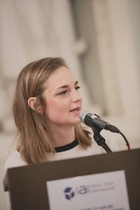
Funzione/Ruolo
Ricercatrice Jr presso l’Istituto Affari Internazionali (IAI).
Percorso professionale
Si laurea cum laude in Scienze Politiche e delle Relazioni Internazionali all’Università Cattolica del Sacro Cuore di Milano, con un periodo di scambio formativo a Parigi. Nei tre anni successivi si specializza tra Roma e Bruxelles conseguendo due master in studi e diritto dell’UE. Da studentessa svolge alcune esperienze di tirocinio, tra le quali Nazioni Unite (UN Environment), IAI, Parlamento Europeo. Al Parlamento rimane per circa due anni come Junior Policy Advisor lavorando per una deputata italiana, occupandosi di dossier delle commissioni parlamentari ENVI (commissione per l'ambiente, la sanità pubblica e la sicurezza alimentare) e ITRE (Commissione per l’industria, la Ricerca e l’ Energia), dei lavori nell’Intergruppo Parlamentare “per gli Investimenti a Lungo termine e la Reindustrializzazione” e dei lavori nelle Delegazioni UE-Cina e UE-Stati Uniti. Nel 2017 lavora al Ministero degli Esteri nella task force della Presidenza Italiana del G7, incaricata delle relazioni con la delegazione tunisina. Da febbraio 2018 è nel team di ricerca dell’Istituto Affari Internazionali (IAI) dove lavora su numerosi progetti, finanziati sia da istituzioni italiane ed europee sia da enti privati. Ha inoltre tenuto lezioni in varie università italiane nelle facoltà di relazioni internazionali, tra cui la Cattolica di Milano, l’Università Sant’Anna di Pisa, l’Università di Trento, l’Università di Firenze, l’Università di Perugia, l’Università di Cagliari.
Risultati scientifici
I principali settori di ricerca e di progettazione riguardano le dinamiche d’integrazione europea principalmente sotto il profilo energetico e ambientale; le dinamiche geopolitiche legate alle trasformazioni nell’ambito dell’energia e del clima; gli sviluppi regionali relativi alla sicurezza energetica, alla decarbonizzazione e all’accesso alle risorse energetiche. S’interessa, studia e scrive di politica estera italiana e di politica europea, di relazioni tra stati membri e tra istituzioni, di relazioni transatlantiche. Tra i principali progetti seguiti più recentemente in IAI rientrano: “Energy Union Watch”, un report trimestrale sullo stato dell’integrazione energetica a livello europeo; “Medreset”, un progetto finanziato dal fondo H2020 dell’UE volto ad analizzare le relazioni tra sponda nord e sponda sud del Mediterraneo per ripensarne l’approccio e mettendo al centro la dimensione locale. Tra le sue principali attività segue inoltre la partnership strategica con Eni, contribuendo con pubblicazioni e attività di formazione. É responsabile per lo IAI della piattaforma d’informazione “Europea, parlano i fatti”, pensata per alimentare un dibattito informato sull'Unione Europea. Tra i suoi più recenti interessi di ricerca rientrano il processo di decarbonizzazione in Italia, la transizione energetica in India, gli aspetti “energetici e ambientali” di Brexit.
Attività editoriali e pubblicazioni
È autrice di pubblicazioni scientifiche e articoli su riviste italiane ed internazionali, tra cui:
“Affari Internazionali” www.affarinternazionali.it
“Sicurezza e giustizia” www.sicurezzaegiustizia.com
Istituto Affari Internazionali (IAI) www.iai.it
Istituto per gli Studi di Politica Internazionale (ISPI) www.ispionline.it
Climate Diplomacy Platform – Adelphi www.climate-diplomacy.org;
NATO Defense College www.ndc.nato.int
The International Spectator (Routledge)
Riconoscimenti e premi
Ad ottobre 2018 è stata chiamata dal think tank della Commissione Europea per una settimana di confronti sul futuro dell’Europa con Commissari Europei, alti funzionari, autorevoli giornalisti, influenti think tankers. Ha partecipato come rappresentante italiana al fianco di 27 giovani professionisti provenienti dagli altri stati membri UE. Il dibattito si è concluso con un elenco dettagliato di priorità e raccomandazioni politiche per la prossima Commissione (e il prossimo Parlamento).
Nell’aprile 2019, sotto gli auspici della Commissione Europea e del Vice-Presidente Sefkovic, è stata selezionata dal Greek Energy Forum come ‘future leader’ dell’Unione Energetica ed ha per questo partecipato ad una tre giorni di discussioni sullo stato dell'arte ed i passi futuri per una maggiore integrazione energetica nell'Europa sudorientale.
Nel 2019, rappresentante per l'Italia nel Y7, engagement group del G7.
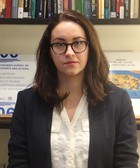
Funzione/Ruolo
Senior Analyst per Gulf State Analytics, Researcher at University of Exeter.
Percorso professionale
Cinzia Bianco è Dottoranda di Ricerca presso l’Istituto di Studi Arabi ed Islamici dell’Università di Exeter dove sta completando una ricerca sull’evoluzione delle percezioni di sicurezza, e relative politiche, nella Penisola Arabica dopo le Primavere Arabe. Allo stesso tempo lavora come Senior Analyst per la società di consulenza di rischio geopolitico Gulf State Analytics, basata a Washington, dove si è occupata di progetti di consulenza per il settore pubblico e privato. Tra il 2013 e il 2014 è stata Research Fellow per il progetto della Commissione Europea sulle relazioni tra Europa e Golfo “Sharaka”, associata all’Istituto Affari Internazionali di Roma. Tra il 2015 e il 2017 è stata Non-Resident Research Fellow per TRENDS Research & Analysis, think tank di Abu Dhabi. Nel corso della sua carriera ha pubblicato paper accademici, di policy e di analisi negli Stati Uniti, in Europa ed Italia, e nella regione del Golfo. È stata speaker in numerosi eventi in Europa e nel Golfo, destinati al grande pubblico o ai policy-makers, inclusi a Chaham House (Londra), l’Al Jazeera Forum (Doha), la Fondation pour la Recherche Stratégique (Parigi), il National Defence College (Abu Dhabi). Cinzia ha un Master of Arts in Middle East & Mediterranean Studies del King’s College London.
Risultati scientifici
Nei primi anni la ricerca si è concentrata sulle relazioni tra Unione Europea e paesi del Consiglio di Cooperazione del Golfo. In qualità di ricercatrice del progetto della Commissione Europea “Sharaka”, Cinzia Bianco ha lavorato soprattutto sulle relazioni economiche tra le due parti e le ramificazioni politiche degli interessi economici condivisi, producendo due policy papers indirizzati ai policy-makers della Commissione Europea responsabili di disegnare i nuovi progetti internazionali con le monarchie del Golfo. In seguito il suo lavoro si è concentrato maggiormente sulla produzione di articoli analitici indirizzati a interlocutori critici nel settore pubblico e privato, e su articoli accademici, con l’obiettivo di analizzare l’evoluzione delle politiche estere e di sicurezza delle monarchie del Golfo in grande evoluzione in epoca contemporanea.
Attività editoriali e pubblicazioni
Una selezione delle sue pubblicazioni include
[2018] Bianco, C. and Roberts D. Britain and the Gulf: Ties that Bind?in External Powers in the Gulf, ed. by Fulton, J. and Li-Chen G., Routledge, August.
[2018] Bianco, C., Gulf Security After 2011: A Threat Analysis, Middle East Policy, 25, 2, , 4 June, Paged 27-41, https://onlinelibrary.wiley.com/doi/abs/10.1111/mepo.12340
[2018] Bianco, C. and Stansfield G., The intra-GCC crises: mapping GCC fragmentation after 2011, International Affairs, 94, 3, 1 May, Pages 613–635, https://doi.org/10.1093/ia/iiy025”
[2017] Bianco, C., “The Intra-GCC Crisis: Domestic, Regional and International Layers”, Istituto Affari Internazionali, June, http://www.iai.it/en/pubblicazioni/intra-gcc-crisis-domestic-regional-and-international-layers
[2017] Bianco, C “Il prossimo Re dell’Arabia Saudita” in “Arabia (non solo) Saudita”, Limes 3/17, April, Roma.
[2016] Bianco, C. and Cafiero G. “Regional Turmoil Threatens Kuwait’s Calm”, Middle East Institute, Washington D.C, March, http://www.mei.edu/content/article/regional-turmoil-threatens-kuwait%E2%80%99s-calm
[2015]Bianco, C., “The European Union in the Gulf.” in "The United Statesand the Gulf: ShiftingPressures, Strategies and Alignments. ed. by Tim Niblock / Steven Hook. Berlin : GerlachPress, 2015.
[2015] Bianco, C., “(Petro)pecunia non olet” in “La strategia della paura”, Limes 11/15, Dicembre, Roma http://www.limesonline.com/cartaceo/petropecunia-non-olet?prv=true
[2015] Bianco, C. “L’Iran normale divide gli arabi del Golfo”, in “Le guerre islamiche”, Limes 9/15, Ottobre ,, Roma http://www.limesonline.com/cartaceo/liran-normale-divide-gli-arabi-del-golfo?prv=true
[2015] Bianco, C. "Dallo Yemen al Golfo i sauditi attaccano perchè sono deboli" in “La radice quadrata del caos”, Limes 5/15, Giugno ,, Roma.
[2015] Bianco, C. "Qatar contro Emirati Arabi Uniti: una guerra per procura sui fronti caldi della Libia" in "Chi ha paura del Califfo?" Limes 3/2015, Marzo ,, Roma, http://www.limesonline.com/cartaceo/qatar-contro-emirati-arabi-uniti-una-guerra-per-procura-sui-fronti-caldi-della-libia?prv=true
Riconoscimenti e premi
Nel 2014 è stata la più giovane donna ad essere invitata come relatrice al Gulf Research Meeting all’Università di Cambridge. Nel 2011 e 2012 ha rappresentato l’Italia ai G8 & G20 Youth Summits nella Commission Affair Esteri (2011) e Commercio Internazionale (2012).

Funzione/Ruolo
Ricercatrice all’Università di Roma Tor Vergata
Percorso professionale
Insegna Relazioni Internazionali all’Università di Roma Tor Vergata, dove è anche titolare della Cattedra Jean Monnet e Founding Director del Centro di Eccellenza Europeo. E’ anche Non-Resident Scholar di Carnegie Endowment for International Peacee Senior Fellow e Director della Foreign Policy Initiative dell’Institute for Women Policy Research, entrambe a Washington DC.
Parla 6 lingue ed è stata fellow in vari istituti di ricerca: Senior Fellow al Center for Transatlantic Relations della SAIS John Hopkins University, e Visiting Fellow alla Brookings Institution, sempre a Washington DC. È stata visiting scholar anche all’Institut d’Études Politiques (Sc.Po.), all’ULB, all’Università di Lisbona e all’Istituto Norvegese per le Relazioni Internazionali.
In aggiunta alla ricerca accademica e all’insegnamento, è stata consigliera al Foreign RelationsCommittee (SFRC) del Senato USA, Consigliera del Ministro degli Affari Esteri, Direttrice per Chiara Fama dell’Istituto Italiano di Cultura di Bruxelles e Direttrice Relazioni Internazionali, poi Responsabile Formazione Internazionale alla Scuola Superiore della Pubblica Amministrazione.
Risultati scientifici
da completare
Attività editoriali e pubblicazioni
[2019 in corso di pubblicazione ] Bindi F, Europe and America: The End of Transatlantic Relations?, Brookings Institution Press.
[2017] Bindi F, Cracks in the IR Glass: The Evolving Relationship Between International Relations & Gender Equality, Seaton Hall Journal of Diplomacy and International Relations, Spring/Summer 2017.
[2015] Bindi F, Italy: the country where men die, but bureaucracy remains in Zeff E, Pirro. E, The European Union and the Member States, 3rded., Lynne Rienner Publishers, Boulder.
[2015] Bindi F, Transatlantic Foreign Policy in the Obama Years in Bonanno L. (ed.) The Transatlantic Agenda: Public Administration and Policy Prospective, Routledge, NY, 2015.
[2012] Bindi F, Eliassen K, Analyzing European Union Politics, Il Mulino, Bologna.
[2011] Bindi F, Italy and the EU, Brookings Institution Press, DC, 2011.
[2011] Bindi F, One year on: Assessing the European Foreign Policy and the European External Service (EEAS), in Brown Journal of World Affairs.
[2011] Angelescu I, Bindi F, The Frontiers of Europe. A Transatlantic Problem? Brookings Institution Press, DC.
[2010] Angelescu I, Bindi F, The Foreign Policy of the EU: Assessing Europe’s Role in the World, Brookings Press..
[2009] Bindi F, Guzzetta G, Lo Stato dell’Unione: L’Europa di inizio millennio, Giappichelli, Torino, 2009.
[2005] Bindi F, Il Futuro dell’Europa, Franco Angeli, Milano, 2005.
Riconoscimenti e premi
Woman of Outstanding Leadership, The International Women’s Leadership Association, 2014.
Ten Most Influential Italians in Brussels by Euros.eu, 2013.
Parte dello Spinelli Group su nomina del Presidente della Repubblica G. Napolitano, 2014.
Aspen Leadership Seminar Fellow, Aspen Institute, 2012.
Young Italian Leader, Council for the United States and Italy, 2006.
Cattedra Jean Monnet, 2004.
Encomio del Presidente della Repubblica Carlo Azelio Ciampi per la tesi di dottorato (Ph.D.), 2004.
Selected for the International Leaders Visitors Program, US Department of State, 2003.
Finalist of the National University Prize “La Numero Uno”, Università Bocconi, 1991.

Funzione/Ruolo
Professoressa ordinaria di Relazioni internazionali all'Università di Torino, Presidente Torino World Affairs Institute – T.wai
Percorso professionale
Laureata in Scienze politiche all’Università di Torino, ha ottenuto il Dottorato di ricerca in Relazioni internazionali (Università di Padova). Ha insegnato alla Scuola di Applicazione dell’Esercito e quindi all’Università di Teramo. Dal 2006 all’Università di Torino, afferisce al Dipartimento di Culture, Politica e Società. Ѐ Presidente del Corso di laurea magistrale in Scienze internazionali.
Risultati scientifici
Anna Caffarena si è occupata di come idee e rappresentazioni influenzano il processo decisionale di politica estera; di regimi internazionali e quindi di cooperazione istituzionalizzata, organizzazioni internazionali, multilateralismo e ordine internazionale. Ha partecipato a vari progetti di ricerca di interesse nazionale (PRIN), l’ultimo dei quali dedicato alla politica estera italiana. Attualmente fa parte di una rete di ricerca internazionale che indaga il ruolo della Cina nel sistema internazionale contemporaneo. Lavora soprattutto su due grandi temi: continuità e cambiamento della politica mondiale dalla prospettiva delle idee e delle rappresentazioni; impatto degli attori emergenti, e in particolare della Cina, sul cambiamento dell’ordine e il futuro del multilateralismo.
Attività editoriali e pubblicazioni
Anna Caffarena è autrice di numerose pubblicazioni, tra le quali:
[2020] Caffarena, A., Gabusi, G., Europa e Cina nell'ordine in trasformazione: il ruolo del multilateralismo, "OrizzoneCina!, vol. 10, n. 4, https://www.twai.it/journal/orizzontecina-10-4/.
[2019] Caffarena, A., Gabusi, G., China's Belt and Road Initiative in Eurasia: Space-Shaping as Odering, in S. Giusti, I. Mirkina (eds), The EU in a Trans-European Space: External Relations Across Europe, Asia and the Middle East, London, Palgrave Macmillan.
[2018] Caffarena, A., La Trappola di Tucidide e altre immagini. Perché la politica internazionale sembra non cambiare mai,il Mulino, Bologna.
[2017] Caffarena, A., Diversity Management in World Politics. Reformist China and the Future of the (Liberal) Order, in The International Spectator, 52, 3.
[2017] Caffarena, A., Come cambia l’ordine internazionale. Il riformismo di Pechino per un “multilateralismo efficace con caratteristiche cinesi”?, in La Comunità Internazionale, LXXII, 2.
[2017] Caffarena, A., Gabusi, G., Making sense of a changing world: foreign policy ideas and Italy's national role conceptions after 9/11, in Italian Political Science Review, 47, 2.
[2017] Caffarena, A., Conoscenti, M., The Tipping Point. Donald Trump and the Discourse on World (Dis)Order in the Press and Expert Media, in Comunicazione Politica, XVIII, 3.
[2014] ] Caffarena, A.,Couples and Trust-building in International Society. A Social Capital Perspective, in B. Vassort-Rousset (ed.), Building Sustainable Couples in International Relations, Palgrave Macmillan, Basingstoke.
[2011] Caffarena, A.,Primavera araba e transizioni democratiche. Considerazioni attorno all’immagine della quarta ondata, Biblioteca della libertà, XLVI, 201.
[2011] Caffarena, A., Più democrazia e meno ordine nella politica mondiale del xxisecolo?, in P.P. Portinaro (a cura di), L’interesse dei pochi, Le ragioni dei molti, Einaudi, Torino.
[2010]Caffarena, A., L’ordine internazionale alla prova del power shift, in L’orizzonte del mondo. Politica internazionali, sfide globali, nuove geografie del potere, Guerini, Milano.
[2009] Caffarena, A., Le organizzazioni internazionali, Il Mulino, Bologna.
[2009] Caffarena, A., 1989-2009, ovvero il paradosso della politica globale, in La Comunità Internazionale, LXI, 4.
Riconoscimenti e premi
Anna Caffarena siede nel Comitato direttivo dell’Istituto Affari Internazionali (IAI). È stata componente del Comitato Direttivo della Società italiana di Scienza Politica (SISP) e dello Steering Committee dello Standing Group on International Relations dello European Consortium for Political Research (ECPR). Ha fatto parte dell’Expert Technical Review Panel dello United Nations System Staff College.

Funzione/Ruolo
Professoressa ordinaria di Storia delle relazioni internazionali all’Università di Padova
Percorso professionale
Dottoressa di ricerca in Storia delle relazioni internazionali presso l’Università di Firenze nel 1992, SSRC-McArthur Foundation Fellow in International Peace and Security nel 1994-1995, poi ricercatrice all’Università di Firenze dove diventa professoressa associata. Dal 2019 è professoressa ordinaria all’Università di Padova, dove è coordinatrice del corso di laurea magistrale Relazioni internazionali e diplomazia. Coordina il Gruppo Integrazione europea della Società italiana di Storia internazionale, è membro del Comitato scientifico per la pubblicazione dei documenti diplomatici italiani del Maeci.
Risultati scientifici
I suoi studi riguardano la storia dell’Unione europea come attore internazionale, la storia della guerra fredda, la politica estera italiana post-1945, la cooperazione internazionale, su questi temi ha pubblicato volumi, articoli e saggi e organizzato iniziative scientifiche e gruppi di ricerca. Si interessa allo studio delle donne in diplomazia.
Attività editoriali e pubblicazioni
[2023] (curatela) in preparazione. Intersectional approaches to Mediterranean Cooperation and Security.
[2023] (cocuratela) in preparazione. Integrazione europea e crisi esterne.
[2023] in preparazione. “Tienanmen: fra crisi del comunismo e nuovo paradigma dei diritti umani”. In Integrazione europea e crisi esterne.
[2020] (con G. Laschi e S. De Paoli). L’Europa adulta. Attori, ragioni e sfide all’Atto Unico alla Brexit, Bologna: il Mulino.
[2020] “The EC and the Mediterranean: Hitting the Glass Ceiling”, In U. Krotz, K.K. Patel, F. Romero, Europe’s Cold War Relations: The EC toward a Global Role, London: Bloomsbury Academic.
[2016] (con D. Caviglia e A. Varsori). Détente in Cold War Europe. Politics and Diplomacy in the Mediterranean and the Middle East, (cocuratela) London: Bloomsbury Academic.
[2015] (con M.E Guasconi, R. Ranieri). Storia politica e economica dell’integrazione europea, Napoli: Edises.
[2013] Prima della globalizzazione. L’Italia la cooperazione allo sviluppo e la Guerra fredda 1955-1995, Padova: CEDAM.
[1997] Il Mediterraneo e la difesa dell'Occidente 1947-1956. Eredità imperiali e logiche di guerra fredda, Firenze: Edizioni il Maestrale.

Funzione/Ruolo
Docente di Relazioni Internazionali del Medio Oriente, Faculty of Humanities, Università di Leiden; docente a contratto presso l’Università Bocconi di Milano.
Percorso professionale
Marina Calculli ha una laurea magistrale in Filologia e storia della Grecia antica presso l’Università di Pisa e l’École des Hautes Études en Sciences Sociales, Parigi, e due titoli di master in Economia e Relazioni Internazionali. presso ASERI School of Economics and International Relations di Milano, e Politica del Medio Oriente presso l’Université Saint-Joseph di Beirut. Nel 2014 consegue un dottorato di ricerca in Relazioni internazionali presso l’Università Cattolica di Milano. Dopo il conseguimento del dottorato, ricopre posizioni di ricerca e insegnamento presso l’Università Ca’ Foscari di Venezia, l’Università di Oxford, l’Università americana di Beirut, l’Università George Washington, l’Università Bocconi di Milano e l’Università di Leiden, dove attualmente insegna.
Risultati scientifici
Marina Calculli si occupa della competizione per il potere e l’autorità tra stati e gruppi armati irregolari nel sistema internazionale contemporaneo, con un’attenzione particolare al Medio Oriente. La sua ricerca si concentra su tre aspetti principali: la giustificazione dello stato; l’emergere dei gruppi armati non-statali; l’uso strumentale dell’etica nella giustificazione della violenza politica. Marina Calculli ha studiato particolarmente l’interazione tra Hezbollah e l’esercito libanese nel contesto regionale e globale. È attualmente impegnata in un progetto di ricerca sulla logica della violenza nel conflitto siriano.
Attività editoriali e pubblicazioni
Marina Calculli è autrice di numerose pubblicazioni, tra le quali:
[2019] Calculli M,’ Reconceiving the struggle between non-state armed organizations, the state and ‘the international’ in the Middle East’, in Sadiki L. (ed.), Routledge Handbook of Middle East Politics, Routledge.
[2019] Calculli M, ‘Middle East Security: the politics of violence after the 2003 Iraq war’, in L. Fawcett (ed.), International Relations of the Middle East, 5thedition, Oxford University Press, pp. 226-244.
[2018] Calculli M, Come uno stato. Hizbullah e la mimesi strategica, Vita&Pensiero.
[2018] Calculli M, ‘Mirage of Retrenchment: Obama and the Syrian Conflict’, in Clementi M, Dian M. and Pisciotta B. (eds.),US Foreign Policy in a Challenging World - Building Order on Shifting Foundations, Springer, pp. 279-296.
[2017] Calculli M. e Strazzar, F, Terrore Sovrano. Stato e jihad nell’era postliberale, Il Mulino.
[2016] Calculli M, ‘Hezbollah’s Lebanese strategy in Syria’, in Galariotis I. and Ifantis K. (eds.), The Syrian Imbroglio. International and Regional Strategies, European University Institute, Robert Schuman Centre for Advanced Studies, pp. 36-44.
[2016] Calculli M. e Legrenzi, M., ‘Middle East conflict and securitization of identities’,in Fawcett L. (ed.), International Relations of the Middle East, 4thedition, Oxford University Press, pp. 218-235.
[2016] Calculli M, Hamadi S. (a cura di), Esilio Siriano.Migrazioni e Responsabilità Politiche, Guerini Editore.
[2015] Calculli M, ‘Sub-regions and security in the Middle East: ‘hierarchical interdependence’, in Gulf-Levant relations, in Elizabeth Iskander Monier, Narratives of Regional Threat: (in)security, (in)stability and the Middle East, Palgrave McMillan, pp. 41-58.
[2014] Calculli M, National prerogatives in International Peacekeeping: Italy in Lebanese perception and Rome’s role within UNIFIL II, in Cahiers de la Méditerranée, 88 (1), pp. 201-214.
Riconoscimenti e premi
Marina Calculli è stata vincitrice di diversi premi e riconoscimenti, tra cui una borsa di ricerca per giovani ricercatori da parte dell’American Political Science Association (Middle East and North Africa Forum) nel 2014 e una borsa di ricerca Fulbright nel 2015. Dal 2017, fa parte del ‘LUCIS - Leiden Center for the Study of Islam and Society’ e del ‘Netherlands Interuniversity School for Islamic Studies’.
_small.jpg)
Area Politica internazionale
Competenze: imprenditoria giovanile, imprenditorialità femminile, imprenditorialità rurale, organizzazioni internazionali, sviluppo economico, sviluppo industriale
Parole chiave: Africa, emancipazione economica delle donne, empowerment femminile, Giordania, Medio Oriente, Nord Africa, promozione degli investimenti
Regione: ESTERO
Funzione/Ruolo
Consulente in progetti internazionali per lo sviluppo dell'imprenditoria femminile e giovanile, già funzionaria delle Nazioni Unite
Percorso professionale
Monica Carcò ha conseguito una laurea in Scienze Politiche e un corso post laurea in Studi Diplomatici. Ha iniziato la sua carriera come Junior Professional Officer dell’United Nations Development Program (UNDP) in Tanzania monitorando e valutando i programmi relativi a Botswana, Tanzania, Seychelles e Zimbabwe e poi presso il Programma Alimentare Mondiale (PAM – WFP) a Roma. Dal 1991 al 1995 ha lavorato come responsabile della promozione degli investimenti presso l'ufficio ITPO delle Nazioni Unite per lo Sviluppo Industriale (UNIDO) in Italia. Durante questo periodo ha seguito lo sviluppo e l'implementazione di programmi strategici di promozione degli investimenti nell'Europa orientale e in Africa. Dal 1995 al 2000 è stata nominata esperta per la Piccola e Media Impresa presso il Dipartimento di Cooperazione allo Sviluppo del Ministero degli Affari Esteri italiano. Dal 2000 al 2008 è stata nominata Responsabile dell'Unità di promozione degli investimenti UNIDO in Giordania, responsabile della creazione di un'unità di promozione degli investimenti presso il Consiglio per gli Investimenti della Giordania per rafforzare le capacità delle imprese giordane, promuovere investimenti e lo sviluppo delle PMI. Il progetto era collegato a una linea di credito di 10 milioni di dollari per le PMI.
Nel 2008 è stata nominata rappresentante UNIDO in Tunisia. Durante il suo incarico, che è durato fino al 2013, ha guidato la fornitura di servizi tecnici di alto livello sulla base delle esigenze e priorità identificate dal paese, rafforzando il dialogo con il governo, il settore privato, le organizzazioni delle Nazioni Unite, i fornitori di assistenza bilaterale e multilaterale, comprese le istituzioni finanziarie di sviluppo (AfDB, WB, IDB, AgFund) e coordinando e mobilitando risorse per programmi e progetti.
Dal 2013 al 2015 è stata responsabile delle UNIDO Investment and Technology Unit a Vienna. Dal 2016 ha iniziato a lavorare nel Dipartimento di Agri-Business dove nel 2019 è diventata Capo della Divisione, Imprenditoria rurale, Job creation, Sicurezza umana.
Nel luglio 2020 ha lasciato l'UNIDO per occuparsi di volontariato e consulenze. Fa parte del Management Team di Women20, attiva con la Gender Alliance e Responible Leaders Network di BMW Herbert Quandt Foundation. E' valutarie di Place program e consulente per UNIDO nella preparazione dell’Eurasia Women’s Forum.
Risultati scientifici
Monica Carcò ha lavorato come funzionaria pubblica internazionale per UNDP, WFP, UNIDO e il Ministero degli Affari Esteri italiano per oltre 25 anni. Avendo ricoperto ruoli di rappresentanza e gestione, Monica si sforza di costruire partnership pubbliche e private e alleanze strategiche con diverse parti interessate per promuovere lo sviluppo locale. Ha gestito diversi progetti di assistenza tecnica nel settore dello sviluppo del settore privato, dell'emancipazione economica delle donne e dell'occupazione giovanile attraverso lo sviluppo dell'imprenditorialità. È stata responsabile di un programma regionale nella regione MENA con lo scopo di promuovere l'empowerment delle donne per uno sviluppo industriale inclusivo e sostenibile. Monica crede fermamente che attraverso la promozione dello sviluppo dell'imprenditorialità per giovani e donne e il rafforzamento dell'ecosistema imprenditoriale si contribuirà a uno sviluppo socio-economico più inclusivo e sostenibile.
Attività editoriali e pubblicazioni
[2006] Carcò M, “Entrepreneurship Development in Developing Countries: the case of ARCEIT” in Nazioni Unite e Sviluppo Industriale, Franco Angeli.
[1993] Carcò M, “Unido assistance to SME ”, Euromonitor.
[1990] Carcò M, “ Food Assistance and Child’s right to education”, Cooperazione.
[1988] Carcò M, “Social Aspect of international assistance to developing Countries”, Cooperazione.

Funzione/Ruolo
Dottoranda di ricerca in “Transnational Governance”, presso la Scuola Normale Superiore e la Scuola Superiore Sant’Anna
Percorso professionale
Nel 2016 ha conseguito la Laurea Magistrale (cum laude) in Scienze Linguistiche per le Relazioni Internazionali presso l’Università Cattolica del Sacro Cuore di Milano, con una tesi incentrata sullo sviluppo ideologico e operativo del jihadismo globale. Successivamente, ha lavorato come ricercatrice presso l’Osservatorio sulla radicalizzazione e il terrorismo internazionale dell’Istituto per gli Studi di Politica Internazionale (ISPI). Attualmente, è dottoranda di ricerca in “Transnational Governance”, corso di dottorato offerto congiuntamente dalla Scuola Normale Superiore e dalla Scuola Superiore Sant’Anna. È parte del network Cosmos (The Centre on Social Movement Studies) della Scuola Normale Superiore.
Risultati scientifici
I suoi interessi di ricerca si concentrano prevalentemente sul jihadismo e sull’islamismo. In tale ambito, ha esaminato aspetti quali il fenomeno dei foreign fighters, la radicalizzazione e il reclutamento in Europa, l’ideologia jihadista, l’evoluzione di al-Qa‘ida e dell’autoproclamato Stato Islamico, nonché l’istituzionalizzazione dei gruppi islamisti in Medio Oriente e Nord Africa. Attualmente, nel contesto del proprio progetto di dottorato, intende effettuare un’analisi comparata delle preferenze politiche dei gruppi jihadisti, con l’obiettivo di comprendere la loro adozione di strategie locali e/o globali.
Attività editoriali e pubblicazioni
È autrice e co-autrice di analisi e contributi a volumi e/o rapporti, tra cui:
[2018] Varvelli, A.&. Carenzi, S, Islamist-Inspired Groups After the Arab Spring. In A. Varvelli & K. Mezran (ed.), The Arc of Crisis in the MENA Region, Istituto per gli Studi di Politica Internazionale (ISPI) e Atlantic Council, settembre
[2018] Vidino, L.& Carenzi, S., Terrorist Attacks. Youngsters and Jihadism in Europe. In IEMed Mediterranean Yearbook 2018, European Institute of the Mediterranean (IEMed),
[2018] Carenzi, S., Il futuro di Daesh e la minaccia jihadista in Italia. In The Alpha Institute of Geopolitics and Intelligence, Italia: Security Report 2018, giugno, ISSN 2421-4272
[2018] Carenzi, S., Cosa rimane del califfato in Siria e Iraq?, Focus Mediterraneo allargato n. 7, ISPI, aprile 2018
[2018] Vidino, L.& Carenzi, S., Jihadist Madrasat in Italy: A Background, ISPI Commentary, ISPI, 27 marzo, https://www.ispionline.it/en/publication/jihadist-madrasat-italy-background-19984
[2018] Carenzi, S., Twenty Years After the World Islamic Front’s Statement: Where Is the Jihadist Galaxy Heading?, European Eye on Radicalization, 14 marzo, https://eeradicalization.com/twenty-years-after-the-world-islamic-fronts-statement-where-is-the-jihadist-galaxy-heading/
[2017] Carenzi, S., Il ritorno dei foreign fighters europei: rischi e prospettive, ISPI Analysis N. 317, 6 novembre, https://www.ispionline.it/it/pubblicazione/il-ritorno-dei-foreign-fighters-europei-rischi-e-prospettive-18591
[2017] Varvelli, A. & Carenzi, S., Dopo il Califfato: quali scenari per lo Stato Islamico, Focus Mediterraneo allargato n. 5, ISPI, settembre
[2017] Carenzi, S., L’evoluzione ideologica e operativa del jihadismo globale, Il mondo dell’intelligence, Sistema di informazione per la sicurezza della Repubblica, 5 settembre, http://www.sicurezzanazionale.gov.it/sisr.nsf/approfondimenti/evoluzione-ideologica-operativa-deljihadismo-globale.html
[2017] Carenzi, S., Terror Attack in Spain: What We Know So Far, Osservatorio Mashrek, 28 agosto, http://www.osservatoriomashrek.com/terror-attack-spain-know-far/
[2017] Carenzi, S., Jihadismo in Europa: la minaccia del single-actor terrorism, Osservatorio di Politica Internazionale, 17 febbraio, http://www.bloglobal.net/2017/02/jihadismo-europa-single-actorterrorism.html
Riconoscimenti e premi
È affiliata all’International Counter-Terrorism Youth Network (ICTYN), nell’ambito del programma “Young Professionals”

Funzione/Ruolo
Direttrice dei programmi MA di Diplomazia e Governance Globale (MADAGG) e Sicurezza Globale e Strategia (MAGSS) e professoressa assistente di Relazioni Internazionali presso il Centro di Sicurezza, Diplomazia e Strategia (CSDS) della Brussels School of Governance (BSoG-VUB).
Percorso professionale
Caterina Carta si è laureata in Scienze Politiche all’Università di Catania. Ha ottenuto il dottorato di ricerca in Politica Comparata e Europea all’Università di Siena, dove ha anche condotto un post-doc assegnatole dalla Compagnia di San Paolo, la Riksbankens Jubileumsfond e la Volkswagen Stiftung. Successivamente, ha lavorato come ricercatrice alla London School of Economics and Political Science (LSE) e alla Université Libre de Brussels (ULB). Dal 2012 al 2017, ha lavorato a Vesalius College (VUB, Brussels , dove ha anche ricoperto il ruolo di vice-decana all’insegnamento. Dal 2017 al 2019, ha ricoperto una Canada Research Chair in Public Diplomacy dal Governo Federale canadese e ha lavorato come professoressa associata all’Université Laval, a Quebec City. Dal settembre 2019 dirige i programmi MA i Diplomazia e Governance Globale (MADAGG) e Sicurezza Globale e Strategia (MAGSS) ed è professoressa assistente di Relazioni Internazionali presso il Centro di Sicurezza, Diplomazia e Strategia (CSDS) della Brussels School of Governance (BSoG-VUB).
Risultati scientifici
Caterina si è occupata dei processi di costruzione di istituzioni ed identità connessi alla creazione del servizio di azione esterna dell’Unione Europea. I suoi studi hanno inoltre messo in luce il ruolo degli attori esecutivi europei nel processo decisionale legato alla politica estera e di azione esterna all’indomani dell’adozione del trattato di Lisbona. In qualità di esperta in discorso politico, Caterina ha analizzato le modalità discorsive che caratterizzano la diplomazia pubblica dell’Unione Europea. Ha anche seguito l’evoluzione della strategia europea in materia di relazioni interculturali internazionali e ha condotto uno studio comparato dei sistemi istituzionali di diplomazia culturale di Francia, Spagna, Regno Unito e Germania. Nel corso della sua carriera, Caterina ha partecipato a diversi consorzi internazionali di ricerca. Ultimamente, ha preso parte ad uno studio – guidato dall’Université Laval e dall’Université du Québec à Montreal – sulle prospettive degli alleati americani in materia di transizione di potere.
Attività editoriali e pubblicazioni
[2019] Carta C. and Higgott R. (eds.), Cultural Diplomacy in Europe: Between the Domestic and the International, Palgrave.
[2018] Carta C, ‘A rose by any other name’: Three competing ways of approaching Discourse Analysis, in International Studies Review, 20(1): 343-369.
[2017] Carta C, Gramsci and the Prince: Taking Machiavelli outside the Realist Courtyard?, in Review of International Studies, 43(2) 345–366.
[2015] Balfour R, Carta C. and Raik K, (eds.), The European External Action Service and National Diplomacies: From Complementarity to Convergence?, Ashgate.
[2015] CartaC, The Swinging “We”: Framing the European Union International Discourse, in Journal of Language and Politics,14(1): 65-86.
[2015] CartaC. andWodak R, Introduction: Discourse Analysis and the Borders of European Identity, inJournal of Language and Politics, 14(1): 1-17.
[2014] CartaC. and Morin JF. (eds.), Making Sense of Diversity: EU’s Foreign Policy through the Lenses of Discourse Analysis, Ashgate.
[2014] CartaC,Use of Metaphors and International Discourse: the EU as an Idiot Power, a Deceptive Pangloss and a Don Giovanni in His Infancy, in Cooperation and Conflict,49(3): 334-353.
[2014] CartaC. and Morin J. F, Struggling over Meanings: Discourses on EU’s International Presence, in Cooperation and Conflict, 49(3): 295-314.
[2014] Morin J. F. and CartaC, Overlapping and Evolving European Discourses on Market Liberalization, in British Journal of Politics and International Relations, 16(1): 117-132.
[2012] CartaC, The European Union Diplomatic Service: Ideas, Preferences and Identities, Routledge.
Riconoscimenti e premi
Nel 2017, Caterina Carta è stata nominata dal governo federale canadese Canada Research Chair in Public Diplomacy.

Area Politica internazionale
Competenze: cooperazione Nord-Sud, gestione della cooperazione tecnica in paesi in via di sviluppo ed emergenti, promozione degli investimenti e della tecnologia, relazioni internazionali, sviluppo economico ed industriale della regione araba
Parole chiave: ONU (Organizzazione delle Nazioni Unite), paesi emergenti, paesi in via di sviluppo, partnership per lo sviluppo, regione araba, sviluppo industriale inclusivo e sostenibile
Regione: ESTERO
Funzione/Ruolo
Coordinatrice senior della Divisione regionionale (Regione araba) del Dipartimento programmi, partnership e interazione sul campo dell'UNIDO (Organizzazione delle Nazioni Unite per lo sviluppo industriale), Vienna, Austria.
Percorso professionale
Lucia Cartini ha conseguito un Master presso l'Università "Orientale" di Napoli (Italia) in Economia, Politica, Storia e Sviluppo nella Regione Araba. Ha inoltre conseguito la specializzazione post-laurea in "Gestione della cooperazione internazionale per lo sviluppo" presso la Stoa Business School - Istituto di Studi per la Direzione e Gestione di Impresa, Napoli – Italia. È stata visiting Research Researcher presso IPALMO - Istituto per le Relazioni tra Italia e Paesi dell'Africa, America Latina, Medio Oriente Estremo, Roma - Italia. Ha lavorato per l'Organizzazione per lo Sviluppo Industriale delle Nazioni Unite (UNIDO) negli ultimi 24 anni sotto varie responsabilità.
Nel 1994, è entrata a far parte delle Nazioni Unite come Junior Professional Officer (JPO) nell’ambito del Programma di sviluppo delle Nazioni Unite (UNDP) per l'Egitto ed ha continuato a lavorare nel paese fino al 1999 come responsabile della promozione degli investimenti in un progetto congiunto tra UNIDO e l'Autorità generale egiziana per gli investimenti e le zone franche (FATF) .
Dopo l'esperienza sul campo, nel 2000 è stata riassegnata al quartier generale dell'UNIDO come Responsabile delle operazioni sul campo nell'Ufficio Regionale Arabo, dove era responsabile del portafoglio di cooperazione tecnica diversi paesi arabi e nella regione. Inoltre, è stata responsabile della promozione della cooperazione dell'UNIDO con i partner internazionali e regionali: la Lega degli Stati Arabi, l'ESCWA, l'AIDMO, la Banca per lo Sviluppo Islamico, l'Organizzazione della Conferenza Islamica, ecc.
Nel settembre 2006 è stata nominata vice direttrice del direttivo dell'Ufficio regionale dell'UNIDO in Egitto. Durante questo periodo, il focus del suo lavoro è stato volto a mobilitare risorse e partner per espandere il Programma di cooperazione tecnica dell'UNIDO ed, in particolare, per rafforzare le interazioni con la squadra delle Nazioni Unite in Egitto e la comunità dei donatori in generale.
Nel febbraio 2011, si è trasferita nella sede centrale di Vienna per svolgere il ruolo di coordinatrice della Rete di investimenti e di promozione tecnologica (UNPO) di UNIDO presso il Dipartimento del Commercio, della Tecnologia e dell'Innovazione dell'Organizzazione. In questa veste ha gestito e monitorato nove Uffici per la Promozione degli Investimenti e della Tecnologia (ITPO) di UNIDO, sia nei paesi emergenti che in quelli industrializzati: Manama, Regno del Bahrain; Bonn, Germania; Roma, Italia; Tokyo, Giappone; Lagos, Nigeria; Pechino e Shanghai, Repubblica popolare cinese; Seoul, Repubblica di Corea; Mosca, Federazione Russa.
Durante il suo incarico, ha avuto un ruolo determinante nella protezione, standardizzazione e rafforzamento delle operazioni della Rete, e nella sua estensione, attraverso la creazione di due nuovi ITPO strategici in Nigeria (il primo ITPO in Africa) e in Germania.
Dal gennaio 2019 ad oggi, svolge il ruolo di coordinatrice senior della Divisione Regionale per i Paesi Arabi, che è responsabile della formulazione e dell'attuazione della strategia UNIDO nella regione, compreso il monitoraggio della cooperazione tecnica e delle operazioni nel campo dell'organizzazione.
Risultati scientifici
Lucia Cartini ha lavorato per più di 20 anni nel mondo delle Organizzazioni Internazionali occupandosi di temi di Sviluppo industriale e tecnologico in particolare nella Regione del Nord Africa e del Medio Oriente e nei paesi arabi. La sua attività è stata in particolare incentrata sullo sviluppo di progetti di assistenza tecnica e di incentivi alla promozione degli investimenti nella regione araba.
Attività editoriali e pubblicazioni
Come membro dello staff, ha contribuito e contribuisce a diverse pubblicazioni di UNIDO relative a investimenti e tecnologia e migliori pratiche nella cooperazione internazionale allo sviluppo.
Nel 1994 ha pubblicato: “Resoconto di un Dibattito” in Politica Internazionale, Rivista bimestrale dell'IPALMO Istituto per le Relazioni tra Italia e i Paesi dell’Africa, America Latina, Medio ed Estremo Oriente, Rome - Italy.
Riconoscimenti e premi
Lucia Cartini è stata premiata come ospite d'onore e relatrice da diverse istituzioni partner per il suo contributo a forum e workshop internazionali.
Nel 2013 ha ricevuto una promozione di merito dal Direttore Generale dell'UNIDO per la sua dedizione, il suo servizio, il suo impegno e i suoi risultati come membro dell'Organizzazione.

Funzione/Ruolo
Professoressa ordinaria di Politica economica al Dipartimento di Scienze Politiche e Sociali dell’Università di Pavia.
Percorso professionale
Laureata in Scienze Politiche, indirizzo economico, ha conseguito un dottorato in Economia Pubblica. Insegna Economia, Progresso Umano e Sviluppo Sostenibile ed Economia dello Sviluppo e della Cooperazione presso i corsi di laurea e di laurea magistrale presso l’Ateneo Pavese e Human Development a corsi di Master internazionali.
È Direttrice del Dipartimento di Scienze Politiche e Sociali e Presidente del Collegio di merito Santa Caterina da Siena di Pavia. Tra i fondatori della Human Development and Capability Association, è Editor del Journal of Human Development and Capabilities. È membro del Comitato Scientifico della Fondazione Feltrinelli di Milano. È stata Extraordinary Professor al Dipartimento di Economia dell’University of Free State, Bloemfontein, Sudafrica; insegna regolarmente alla Kenyatta University di Nairobi.
Risultati scientifici
Gli interessi principali di ricerca riguardano il tema della povertà, delle diseguaglianze (di reddito ma anche di sviluppo e di genere), della vulnerabilità e marginalizzazione, dell’innovazione sociale.
Ha coordinato numerosi progetti di ricerca europei e internazionali su questi temi.
Attività editoriali e pubblicazioni
È curatrice, insieme a Mozaffar Qizilbash e Siddiq Osmani dell’Handbook of the Capability Approach in corso di pubblicazione per Cambridge University Press.
Tra i suoi dieci lavori scientifici più recenti:
[2019] Chiappero E. Estimating conversion rates: a new empirical strategy with an application to healthcare in Italy (co-authors Paola Salardi, Francesco Scervini), Health Economics (2019, forthcoming)
[2019] Chiappero E. Eliciting, Applying and Exploring Multidimensional Welfare Weights: Evidence from the Field(co-author Lucio Esposito), Review of Income and Wealth (2019, forthcoming)
[2018] Chiappero E. From resources to functioning: Rethinking and measuring conversion rates (co-authors: Paola Salardi and Francesco Scervini), in Comim F., Shailaja Fennell and P.B. Anand, New frontiers of the Capability Approach, Cambridge University Press, 2018, 232-245,
[2018] Chiappero E. Third sector and capability-oriented policies(co-authors: G. Acconcia and P. Graziano), in H.U. Otto, M. Walker and H. Ziegler (eds.), Capability-promoting policies enhancing individual and social development, Policy Press, 2018, pp.147-163,
[2017] Chiappero E. Chronic and late poverty as the main concerns in a twofold survey on inter-temporal welfare preferences (co-author: Lucio Esposito), in Journal of International Development, oct 2017
[2017] Chiappero E. Improving the quality of life of disavantaged young people in Europe (co-authored), in Atzmüller, Bonvin, Edgell and Otto (eds), Empowering young people in disempowering times. Fighting Inequality Through Capability Oriented Policies, Edward Elgar Publisher 2017, pp. 251-261.
[2017] Chiappero E. The participation of the young in the European Union (co-authors: Goffette, Vero, Graham, Raeside, Spreafico and Peruzzi), in Atzmüller, Bonvin, Edgell and Otto (eds), Empowering young people in disempowering times. Fighting Inequality Through Capability Oriented, Edward Elgar Publisher 2017, pp. 39-53.
[2017] Chiappero E. Social Innovation, Individuals and Societies: An Empirical Investigation of Multi-layered Effects(co-author: N. von Jacobi) in Journal of Social Entrepreneurship, vol. 8, n. 2, 2017, pp.271-301.
[2017] Chiappero E. Creating (economic) space for social innovation(co-authors: Molnár György, Nadia von Jacobi, Rafael Ziegler), Journal of Human Development and Capabilities, vol. 18, n. 2, 2017, pp. 293-298.
[2017] Chiappero E. Corrosive Disadvantages and Intersectionality: empirical evidence on multidimensional inequality amongst young people in Europe( co-authors: A.M.C. Spreafico and A. D. Peruzzi), in H. U. Otto,S. Pantazis, H. Ziegler and A. Pots (eds.), Human Development in Times of Crisis: renegotiating social justice, Palgrave McMillan, 2017, pp. 39-62.
Testi divulgativi:
[2011] Chiappero E, S. Moroni, G. Nuvolati (a cura di) Gli spazi della povertà. Strumenti di indagine e politiche di intervento, Bruno Mondadori, 2011.
[2011] Chiappero E. Politiche per uno sviluppo umano sostenibile, Carocci Editore, 2011.
[2010] Chiappero E. Sviluppo umano sostenibile, capability approach e cooperazione internazionale (co-autore Mario Biggeri), in “Temi avanzati di economia e politica della cooperazione internazionale allo sviluppo”, a cura di M.Biggeri e G. Canitano, 2010, Franco Angeli, Milano, pp. 37-54.
[2009] Chiappero E. Sviluppo umano sostenibile e qualità della vita. Modelli economici e politiche pubbliche, (co- editor: Stefano Pareglio), Carocci Editore, 2009.

Area Politica internazionale
Competenze: affari europei, politica internazionale, relazioni internazionali, science sociali e politiche
Parole chiave: Balcani, democrazia, dinamiche transnazionali, diritti umani, Europa orientale, integrazione europea, libertà dei media e sfera pubblica europea, migrazioni, partecipazione della società civile, politiche della memoria, post-comunismo, processo decisionale europeo, public history, rotta balcanica, società civile, Sud-Est Europa
Regione: Trentino-Alto Adige
Funzione/Ruolo
Direttrice Osservatorio Balcani Caucaso Transeuropa (OBCT), unità operativa del Centro per la Cooperazione Internazionale
Percorso professionale
PhD in Scienze politiche e sociali presso l'Istituto Universitario Europeo di Fiesole (FI), laurea in Scienze politiche presso l'Università degli Studi di Milano. È direttrice scientifica di OBCT dal 2006. Dal 2003 al 2008 è stata docente a contratto di Storia e istituzioni dell'Europa orientale presso la Facoltà di Scienze politiche dell'Università di Bologna. Ha insegnato affari europei in numerosi corsi universitari in Italia e all'estero (università di Firenze, Siena, Trento, Bergamo, Torino, Università del Salento, Sarajevo). E’ stata referee per varie riviste scientifiche tra cui: Croatian International Relation Review; Albanian Journal of Politics; la collana di pubblicazioni universitarie della casa editrice Carocci e la rivista italiana Diacronie. Tra il 2003 ed il 2005 è stata ricercatrice per l’Istituto per l’Europa Orientale e Balcanica (IECOB/CECOB) coordinando tra l’altro il progetto europeo di ricerca finanziato dal V Programma Quadro: Functional Borders and Sustainable Security. Integrating the Balkans in the European Union.Dal 1995 al 1999 ha collaborato con varie incarichi a tempo con organizzazioni internazionali governative (OSCE; Banca Mondiale) e non (ICS).
Risultati scientifici
Ha coordinato vari progetti di ricerca in qualità di direttrice di OBCT e per l’Istituto per l’Europa Orientale e Balcanica (IECOB) interessandosi disocietà civile e dinamiche sociali transnazionali. Ha guidato per oltre un decennio l’affermazione nazionale ed europea OBCT sviluppando un modello originale di think tank sugli affari europei che coniuga informazione, ricerca, formazione, divulgazione e advocacy e funge da cerniera tra sapere scientifico e opinioni pubbliche europee, tra accademia e giornalismo; tra società civile e politica, e tra paesi dell’Europa orientale ed occidentale. Mostrando una spiccata propensione all’animazione di reti europee, oggi OBCT stimola il coinvolgimento della società civile nella politica internazionale, offre il proprio contributo alla crescita della sfera pubblica europea e sensibilizza l'opinione pubblica su aree al cuore di numerose sfide europee.
Attività editoriali e pubblicazioni
Contribuisce alle pubblicazioni del proprio ente con articoli, policy paper e volumi:
[2017] Chiodi L. La società civile europea contro il reato di solidarietà, Osservatorio Balcani Caucaso Transeuropa, https://www.balcanicaucaso.org/aree/Italia/La-societa-civile-europea-contro-il-reato-di-solidarieta-182156.
[2015] Chiodi L. Un'iniziativa dal basso per la libertà di informazione in Europa, Osservatorio Balcani Caucaso Transeuropa, https://www.balcanicaucaso.org/aree/Europa/Un-iniziativa-dal-basso-per-la-liberta-di-informazione-in-Europa-159121.
[2014] Chiodi L. Nuova commissione: più vicinato, meno allargamento?, Osservatorio Balcani Caucaso Transeuropa, https://www.balcanicaucaso.org/aree/Europa/Nuova-commissione-piu-vicinato-meno-allargamento-155957.
[2014] Chiodi L. Macroregione Adriatico-ionica: potenzialità e limiti, Osservatorio Balcani Caucaso Transeuropa, https://www.balcanicaucaso.org/aree/Italia/Macroregione-Adriatico-ionica-potenzialita-e-limiti-153808.
[2011] Chiodi L. L'89 senza l'Europa: il contagio democratico nel mondo arabo, Osservatorio Balcani Caucaso Transeuropa, https://www.balcanicaucaso.org/aree/Italia/L-89-senza-l-Europa-il-contagio-democratico-nel-mondo-arabo-89183.
Lista completa: https://www.balcanicaucaso.org/Autori/Luisa-Chiodi
Laura Chiodi pubblica anche con altri think tank italiani ed europei:
[2018] Chiodi L. Western Balkans-EU Integration: Why Italy Should Take the Lead, ISPI on-line, Milano.
[2017] Chiodi L., Bona M. Balcani: democrazia e movimenti sociali, Istituto Affari Internazionali.
[2016] Chiodi L., Martino F. La rotta balcanica, Rapporto sulla protezione internazionale in Italia 2016, edito da Caritas Italiana, pp. 24-27.
[2015] Chiodi L.,Simili B. Non c’è più tempo. Barriere, cemento, filo spinato Il Mulino online, https://www.rivistailmulino.it/news/newsitem/index/Item/News:NEWS_ITEM:2952.
[2014] Chiodi L. The Ongoing EU Enlargement and the Public Spheres in the Western Balkans, ISPI Studies.
Pubblica infine per riviste e volumi accademici:
[2019] Chiodi L. Youth as social actor in the Albanian Transition to democracy, in A. Rama (edited by), The End of the Communist Rule in Albania: Political Change and the role of the Student Movement, London: Routledge.
[2015] Chiodi L. L'allargamento inevitabile? Un processo da compiere tra fatiche e novità politiche, Quaderni del Circolo Rosselli, 1/2015.
[2012] Chiodi L. Mass Migration, Student Protests and the Intelligentsia Popullore in the Albanian Transition to Democracy, COSMOS WP 2012/2, Department of political and social sciences, European University Institute.
Riconoscimenti e premi
Premio Fabbricatore di idee 2012, Città dell'Impresa.

Area Politica internazionale
Competenze: diritti umani, diritto internazionale, Unione Europea
Parole chiave: arbitrato internazionale, Corte penale internazionale, diritti fondamentali, investimenti, migrazione, ONU (Organizzazione delle Nazioni Unite), reti di commercio internazionale
Regione: Veneto
Funzione/Ruolo
Professoressa ordinaria di diritto internazionale presso l’Università degli Studi di Verona e Visiting Professor of European Human Rights Law, Monash University
Percorso professionale
Laureata in giurisprudenza presso l’Università degli Studi di Firenze (1993) ha proseguito gli studi come Fulbright Scholar presso la Harvard Law School (LL.M., 1996) e conseguito il dottorato di ricerca in diritto internazionale presso l’Università di Roma ‘La Sapienza’ (1998). Ha lavorato presso l’Università degli Studi di Firenze come titolare di un assegno di ricerca in Diritto internazionale (1999-2000), ricercatrice di Diritto internazionale (2000-2005) e professoressa per affidamento di Diritto dell’Unione europea (2002-2006) e di International Law (2006-2013). Ha inoltre insegnato nelle Università italiane di Catanzaro (Cosenza), Macerata (Jesi) e Trento nonché presso l’European University Institute (Academy of European Law) e l’Université Panthéon-Assas (Paris II) (Institut des Hautes Etudes Internationales).
Dal 2012 è Professoressa ordinaria di Diritto internazionale presso l’Università di Verona – ove ha prima rivestito i ruoli di Professoressa associata di Diritto dell’Unione europea (2005-2009) e di Diritto internazionale (2010-2011) – nonché, dal 2015, Visiting Professor di European Human Rights Law presso la Monash University(una delle top universitiesnel World University Rankings). È anche avvocata, iscritta agli Albi dei Professori dell’Ordine degli Avvocati di Firenze dal 1996 e dei Cassazionisti dal 2008.
Ha collaborato come consulente esterna del Servizio per gli affari giuridici, del contenzioso diplomatico e dei trattati del Ministero degli affari esteri italiano su questioni di Diritto internazionale e dell’Unione europea. In tale ambito ha, fra l’altro, partecipato in qualità di esperta al Comitato di esperti di diritto internazionale pubblico (CAHDI) (Strasburgo, 2004-2008) e difeso il Governo italiano dinanzi alla Corte europea dei diritti dell’uomo nel caso Markovic (2005).
Ha rivestito ruoli di rilievo nell’ambito di organizzazioni internazionali, fra i quali quello di amicus curie dinanzi al Tribunale internazionale penale per la ex Yugoslavia e la Corte penale internazionale, visiting professional presso l’Ufficio del Procuratore di quest’ultima, giudice ad hoc della Corte europea dei diritti dell’uomo, membro del Comitato europeo dei diritti sociali e, più recentemente,Special Rapporteur delle Nazioni Unite sui diritti alla libertà di associazione e di riunione pacifica.
È membro di associazioni professionali fra cui ACUNS (Board of Directors, 2017-2020) and ASIL.
Risultati scientifici
Si occupa delle principali aree del diritto internazionale e dell’Unione europea, con una particolare expertise nelle materie dei diritti umani e del diritto internazionale penale e umanitario, e una conoscenza approfondita delle Nazioni Unite, il commercio e l’arbitrato internazionale – acquisite in venti anni di insegnamento, ricerca ed esperienze professionali in ambito internazionale. Tra le sue aree di interesse vi sono anche le interrelazioni fra diritto internazionale, storia, arte e letteratura.
Attività editoriali e pubblicazioni
Libri
[2007] Ciampi A., Sanzioni del Consiglio di sicurezza e diritti umani(Milano: Giuffrè), pp. IV-500, ISBN: 88-14-13598-3
[2003] Ciampi A.,L’assunzione di prove all’estero in materia penale(with a summary in English)(Padova: Cedam), pp. XII-669, ISBN: 88-13-24704-4
Contributi in volume
[2019] Ciampi A., "La Cour pénale internationale et les Nations Unies", in J. Fernandez, X. Pacreau (eds.), Statut de Rome de la Cour pénale internationale. Commentaire article par article, 2nded., Paris: Editions A. Pedone
[2019] Ciampi A., "Kafka’s Trial and the EU Dublin Asylum System", in D. Carpi (ed.), Monsters and Monstrosity, Berlin: Degruyter, 221-234
[2016] Ciampi A., "L’effetto diretto «invertito» dell’art. 325 del Trattato sul funzionamento dell’Unione europea", in C. Paonessa, l. Zilletti (eds.), Dal giudice garante al giudice disapplicatore delle garanzie. I nuovi scenari della soggezione al diritto dell'Unione europea: a proposito della sentenza della Corte di giustizia Taricco, Pisa: Pacini Giuridica, 17-32, ISBN: 978-88-6995-051-3
[2011] Ciampi A., "Invalidity and Termination of Treaties and Rules of Procedure", in E. Cannizzaro (ed.), The Law of Treaties Beyond the Vienna Convention, Oxford: Oxford University Press, 360-377, ISBN: 978-0-19-958891-6
[2011] Ciampi A., "Security Council Targeted Sanctions and Human Rights", in B. Fassbender (ed.), Securing Human Rights? Achievements and Challenges of the UN Security Council, Oxford: Oxford University Press, 98-140, ISBN: 978-0-19-964149-9
Articoli in riviste
[2018] Ciampi A., "The Divide between Human Rights, International Trade, Investment and Development Law",German Yearbook of International Law, 61, 1-43, ISSN: 0344-3094
[2018] Ciampi A., "Can the EU Ensure Respect for the Rule of Law by Its Member States? The Case of Poland", Osservatorio sulle fonti, 11, 3, 1-14, ISSN 2038-5633
[2017] Ciampi A., (Vision) "Report of the Special Rapporteur on the rights to freedom of peaceful assembly and of association” to the General Assembly (72ndsession), UN Doc. A/72/135, July 14, 2017, http://undocs.org/A/72/135.
[2016] Ciampi A., "Il referendum per la Brexit: esiti e possibili scenari", Osservatorio sulle fonti, 9, 2, 1-6, ISSN 2038-5633
[2011] Ciampi A., "Problemi relativi all'attuale regime giuridico del Trattato di amicizia Italia-Libia",Osservatorio sulle fonti, 4, 2, 1-14,ISSN 2038-5633
[2011] Ciampi A., "L'ipotesi dell'estradizione condizionata di Battisti dal Brasile all'Italia", Rivista di diritto internazionale, vol. 94, 2011, 183-187, ISSN: 0035-6158
[2001] Ciampi A.,"BaraldiniItalian Constitutional Court decision regarding release of prisoner convicted in the United states and transferred following agreement that the full sentence would be served", American Journal of International Law, 95, 919-927, ISSN: 0002-9300
[1999] Ciampi A., "Public Prosecutorv. AshbyItalian decision on jurisdiction under NATO Status of Forces Agreement to try U.S. military officers for deaths caused when aircraft severed ski lift cable", American Journal of International Law, 93, 219-224, ISSN: 0002-9300
Riconoscimenti e premi
Fulbright Scholar to Harvard Law School (Cambridge, MA) (1995-1996)
Premio del Seminario Associazione di Studi e Ricerche Parlamentari “Silvano Tosi” presso l’Università degli studi di Firenze (1994)
Premio “Soroptimist” per la migliore tesi di laurea presso la Facoltà di giurisprudenza dell’Università degli Studi di Firenze (1993)
Premio “Stucchi Prinetti” per il miglior laureato presso la Facoltà di giurisprudenza dell’Università degli Studi di Firenze (1993)
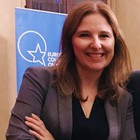
Funzione/Ruolo
Program Manager, Ufficio di Roma di European Council on Foreign Relations (ECFR)
Percorso professionale
Laureata in scienze politiche e relazioni internazionali, consegue un Master in Studi Interdisciplinari Europei presso il College of Europe, Natolin Campus, con una specializzazione sull’UE come attore regionale. Dopo la laurea lavora per l’Institute for Eastern Studies di Varsavia, organizzatore dell’Economic Forum di Krynica, come partnership manager e analista responsabile dell’Europa meridionale. Dal 2011 lavora presso l’ECFR. Di origine polacco-italiana, le sue principali aree di interesse sono la politica estera polacca e italiana e il vicinato orientale dell'UE.
Risultati scientifici
Teresa Coratella segue per ECFR gli sviluppi e le dinamiche della politica estera italiana e del ruolo dell’Italia in Europa. Grazie alla specializzazione nella politica estera di vicinato e la conoscenza madrelingua della lingua polacca, segue con attenzione gli sviluppi del vicinato orientale dell’Europe ed i relativi processi politici europei.
Attività editoriali e pubblicazioni
Tra le recenti pubblicazioni ed analisi:
[2019] Coratella T., Salvini goes global, ECFR
[2019] Dennison S., Leonard M., and Zerka P., with contributions from Coratella T., Janning J., Mendel-Nykorowycz A., Ignacio Torreblanca J., How to govern a fragmented EU: What Europeans said at the ballot box, ECFR
[2019] Coratella T., Poland and Italy: Best of frenemies, ECFR.
[2019] Coratella T., Italy’s distracted political elite, ECFR.
[2019] Coratella T., Italy's Chinese dilemma, ECFR.
[2018] Coratella T., The League of Leagues: Pan-European cooperation against the EU, ECFR.
Riconoscimenti e premi
Teresa Coratella è socia di WIIS Italy, del think tank Trinità dei Monti, Ancienne del College of Europe ed Alumna del New Security Leaders program del Warsaw Security Forum.
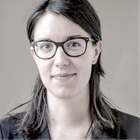
Funzione/Ruolo
Dottoranda di Studi Politici presso l'Università degli Studi di Milano.
Percorso professionale
Tiziana Corda sta conseguendo un dottorato di ricerca in Studi Politici presso il Network for the Advancement of Social and Political Studies (NASP)dell’Università degli Studi di Milano. Attualmente collabora anche come ricercatrice in un progetto di ricerca su Violenze, Élite e Resilienza in Paesi sotto stress (VERSUS) coordinato dall’Università del Sussex e finanziato dal Consiglio Europeo della Ricerca (ERC) dell’Unione Europea. In precedenza, ha lavorato come ricercatrice presso il programma Africa dell’Istituto per gli Studi di Politica Internazionale (ISPI) di Milano, presso una ONG locale a Città del Capo, in Sudafrica, e presso il Servizio di Azione Esterna Europeo (EEAS) a Bruxelles, in Belgio.
Risultati scientifici
Nel quadro del percorso dottorale, la sua attività di ricerca verte sull’analisi delle sanzioni internazionali, nello specifico dei fattori istituzionali e dei processi decisionali all’interno dei paesi colpiti da sanzioni che ne influenzano l’efficacia. L’analisi empirica si basa soprattutto sullo studio dei casi di sanzioni imposte nei confronti dei paesi africani, così come dell’Iran. Nel quadro della collaborazione con il progetto europeo di ricerca VERSUS, si occupa invece dell’analisi delle crisi politiche e dei conflitti in Etiopia. Complessivamente, le sue attività di ricerca e di insegnamento riguardano le relazioni internazionali; la geopolitica; l’analisi della politica estera; la politica comparata; l’agenda africana delle potenze extra-continentali, soprattutto quelle del Golfo; i conflitti e le transizioni politiche nel Corno d’Africa, con uno sguardo privilegiato per Eritrea, Etiopia e Sudan.
Attività editoriali e pubblicazioni
Tra le recenti pubblicazioni scientifiche:
[2021] Corda, T. Not All Plain Sailing: The Highs and Lows of Iran's Scramble for the Horn of Africa, in C. Branco and F. Leandro, Geopolitics of Iran, London: Palgrave Macmillan.
[2021] Corda, T. Ankara's Africa Policy: An Overview, The International Spectator, 56(3), ahead of print.
[2018] Corsa al Corno d’Africa: interessi globali e competizione regionale, Osservatorio di Politica Internazionale del Parlamento Italiano, n.141, (con G. Dentice e M. Procopio).
[2016] Recovering Regional Power: The Islamic Republic under Rouhani’s Presidency, Il Politico - Rivista Italiana di Scienze Politiche (Ed. Rubbettino).
Altri articoli e saggi sono apparsi in al-Sharq Strategic Research, Armed Conflict Location & Event Data Project (ACLED), l’Istituto per gli Studi di Politica Internazionale (ISPI), Treccani, United States Institute of Peace (USIP).

Area Politica internazionale
Competenze: analisi del discorso politico, antropologia culturale, cultura araba, dialogo interculturale e interreligioso, lingua araba, multiculturalismo, pensiero politico nel mondo arabo, storia del Medio Oriente, storia del Nord Africa, studi mediterranei
Parole chiave: coronavirus, Covid-19, identità, pandemie, pensiero politico, resilienza
Regione: Lazio
Funzione/Ruolo
Professoressa ordinaria di Lingua e Cultura Araba e Direttrice del Master MISLAM Economia e Istituzioni dei Paesi del Medio Oriente e Nord Africa all'Università LUISS Carlo Guidi di Roma
Percorso professionale
Si è laureata e ha conseguito il dottorato presso l'Università di Roma "La Sapienza", e il Master in Arabic Studies all'American University in Cairo. Ha insegnato all'Università di Napoli "L'Orientale". Le sue ricerche vertono sui temi di letteratura, storia e cultura dei paesi arabi.
Risultati scientifici
Francesca Maria Corrao ha curato la pubblicazione della corrispondenza segreta tra i leader politici dei Giovani Turchi e il leader del primo partito nazionale egiziano Muhammad Farid (1912-14). Inoltre ha effettuato la prima traduzione e studio di un manoscritto inedito di epoca mamelucca. Ha realizzato studi e analisi sulla stampa araba e il pensiero critico arabo contemporaneo.
Attività editoriali e pubblicazioni
[2020] Corrao F.M. Oltre il Mediterraneo: il covid-19 nel mondo arabo. Luiss Open, https://open.luiss.it/2020/04/21/oltre-il-mediterraneo-il-covid-19-nel-mondo-arabo/
[2020] Corrao F.M. "Uno sguardo al di là del nostro giardino", in Pandemia e resilienza. PErsona, comunità e modelli di sviluppo dopo la Covid-19. Consulta Scientifica dei Cortili Gentili,a cura di C. Caporale e A. Pirni.
[2020] Corrao F.M. “Emergency and solidarity : an Islamic perspective” in The Bulletin of The Institute of Oriental Philosophy n. 36, 2020 TOKIO JAPAN ISSN 0912-0610
[2018] Corrao F.M. e Violante L. L’Islam non è terrorismo, ed. Il Mulino
[2017] Eyadat Z, Corrao F.M. Hashas M,Islam, State and Modernity. Mohammed Abed Al-Jabri and the Future of the Arab World, Editors: Z. Eyadat, F.M. Corrao, M.Hashas, Palgrave Macmillan US
[2017] Corrao F.M. Islam Religion and Politics, LUISS University Press (Islam Religione e politica, LUP 2015);
[2017] Corrao F.M. Reflections on Education and Culture in al-Jabri’s Thought in Islam, State and Modernity. Mohammed Abed Al-Jabri and the Future of the Arab World, Editors: Z. Eyadat, F.M. Corrao, M.Hashas, Palgrave Macmillan US 9781-1-137-59760-1
[2015] Corrao F.M. Diaspora araba ed emancipazione culturale, in Gli Studi Interculturali: teorie e pratiche nel contesto degli scambi culturali con la sponda Sud del Mediterraneo, a cura di Franca Sinopoli e Isabella Camera d’Afflitto, Roma Libreria Editrice Orientalia
[2014] Corrao F.M. Médias et conflicts: l’Europe vue par les Arabes, in D. Bendo-Soupou, Le Monde arabe et l’Europe. Entre conflicts et paix, ed. l’Harmattan, pp. 101-110
[2014] Corrao F.M. The Relevance of a Humanistic Education to Intercultural Dialogue, in TŌYŌ TETSUGAKU KENKYŪJO KIYŌ, ed. THE INSTITUTE OF ORIENTAL PHILOSOPHY, vol. 30, Tokyo, pp. 51-62
[2014] Corrao F.M., Maffettone S. Arab Minorities, Liberalism, and Multiculturalismin Multiculturalism and Minority Rights in the Arab World, ed. E. Poefstl W. Kymlicka, Oxford University Press, pp. 138-172
[2014] Corrao F.M. L’Evoluzione Culturale all’Origine delle Rivoluzioni Arabe, in Economia e Istituzioni dei Paesi del Mediterraneo, a cura di Eugenia Ferragina – Adalgiso Amendola, ed. Il Mulino
[2014] Corrao F.M. Donne Islamiche in Italia: ieri e oggi, in Musulmane d’Italia, a cura di E. Poefstl, ed. Bordeaux, pp.19-56
[2011] Corrao F.M. Le rivoluzioni arabe. La transizione mediterranea, Mondadori Università
[2003] Corrao F.M. Le opinioni e l’informazione nei Paesi arabo-islamici dopo l’11 settembre, a cura di F. M. Corrao, volumetto allegato a “Giano”, n. 40
Riconoscimenti e premi
Premio alla carriera Gherardo da Cremona per la traduzione, dall’Università di Toledo e Anna Lindh Foundation 2016; Premio Nazionale Minerva per la cultura XXII edizione 2016.
Presidente del Comitato scientifico della Fondazione Orestiadi di Gibellina. Membro dell’UEAI (Union of European Arabist and Islamist), EMTAR (European professor of Modern Arabic Literature), Ricercatore straniero dell’IOP (Institute of Oriental Philosophy) at the Soka University in Tokyo. Visiting professor in diverse Università tra cui Cairo, Beirut, Tunisi, Rabat, Paris Inalco e Sciencepò, Cambridge e Harvard.

Funzione/Ruolo
Assegnista di ricerca in Relazioni Internazionali presso Università di Napoli, L’Orientale.
Percorso professionale
Irene Costantini consegue la laurea cum laude in Lingue e Civilità Orientali presso l’Università di Studi di Roma La Sapienza nel 2010 e un Master in Development Studies presso la School of Oriental and African Studies (SOAS) di Londra nel 2011. Nell’Aprile del 2015 completa il dottorato di ricerca in Studi Internazionali presso la Scuola di Studi Internazionali, Università di Trento con una tesi dal titolo “Statebuilding versus State Formation: the political economy of transition in Iraq e Libya”. Dopo il conseguimento del dottorato, lavora come ricercatrice presso la Post-war Reconstruction and Development Unit, University of York e successivamente presso il Middle East Research Institute, Erbil, Iraq. Dal dicembre 2017 è assegnista di ricerca presso l’Università di Napoli, l’Orientale.
Risultati scientifici
Ha svolto attività di ricerca e di didattica sulle dinamiche di conflitto, le politiche relative agli interventi internazionali in aree di conflitto e le transizioni postbelliche in Medio Oriente e Nord Africa, ed in particolare in Iraq e Libia. Ha partecipato a diversi progetti di ricerca, tra cui: Drivers for Onward migration: the case of Iraqi IDPs in the Kurdistan Region leaving the country (2016-2017, NWO funding).
Attività editoriali e pubblicazioni
È autrice di diverse pubblicazioni, tra le quali:
[2019] Costantini I. & Palani K., “Unpacking the displacement-migration nexus: evidence from northern Iraq”, International Migration, first published September 6, 2019.
[2019] Belloni R. & Costantini I., “From Liberal Statebuilding to Counterinsurgency and Stabilization: the International Intervention in Iraq”, Ethnopolitics, 18 (5): 509–525.
[2019] Costantini I. & O’Driscoll, D. “Practices of exclusion, narratives of inclusion: violence, population movements and identity politics in post-2014 northern Iraq”, Ethnicities, first published June, 27, 2019.
[2019] Costantini I. & Hanau Santini R., “Saudi Arabia’s Regional Space-shaping: making or unmaking a region? (with Ruth Hanau Santini). In: Giusti Serana & Mirkina Irina (eds). The EU in a trans-European Space. External Relations across Europe, Asia and the Middle East. Basingstoke: Palgrave MacMillan: 113–131.
[2019] Costantini I. “State building”. In: Il trono di sabbia. Stato, nazioni e potere in Medio Oriente. A cura di: Giacomo Bottos, Francesco Rustichelli, Francesco Salesio Schiavi, Jacopo Scita e Gabriele Sirtori. Torino: Rosenberg & Sellier, in collaborazione con Pandora Rivista: 67–81.
[2018] Costantini, I. Statebuilding in the Middle East and North Africa: the aftermath of regime change. Routledge Studies in Intervention and Statebuilding series. Abingdon: Routledge.
[2017] Costantini I. “Conflict and Peace in the Mediterranean Space: Europe’s response to the Libyan crisis.” In: Muriam Haleh Davis and Thomas Serres (eds), North Africa and the Making of Europe: governance, institutions, and culture, London and New York: Bloomsbury Academic Publishing: 223–242.
[2017] Costantini, I. “La partita degli sfollati di Iraq”. Limes, Rivista Italiana di Geopolitica, 7: 69–74.
[2017] Costantini I. “A neoliberal rentier system: new challenges and past economic trajectories in Iraq”. The International Spectator, 52 (1): 61–75.
[2016] Costantini I. “Conflict Dynamics in post-2011 Libya: a political economy perspective, Conflict, Security & Development16 (5): 405–422.
[2013] Costantini I. “Statebuilding and foreign direct investment. The case of post-2003 Iraq”. International Peacekeeping, 20 (3): 263–279.
[2012] Costantini I. “Economic issues in war-to-peace transitions: old and new challenges”, Journal of Intervention and Statebuilding, 6 (4): 427–435.

Area Politica internazionale
Competenze: diplomazia delle armi di distruzione di massa, diplomazia nucleare internazionale, disarmo, sicurezza internazionale
Parole chiave: controllo degli armamenti, dimensione gender nei processi di pace, non-proliferazione delle armi di distruzione di massa (biologica, chimica, nucleare)
Regione: Lazio
Funzione/Ruolo
Ricercatrice senior al Vienna Center for Disarmament and Non-Proliferation (VCDNP) e Consulente per l'Ufficio V del Ministero degli Affari Esteri e della Cooperazione Internazionale
Percorso professionale
Dopo la laurea in Scienze politiche presso l'Università di Roma Tre, e un periodo di studi alla Macquarie University di Sydney (Australia), Federica Dall'Arche ha conseguito un Master biennale in Nonproliferazione e Studi sul terrorismo, e un certificato in Risoluzione dei Conflitti presso il Middlebury Institute of International Studies (MIIS), Monterey. Nel 2014 ha ottenuto il premio “Michiel Brandt Memorial Prize” per il miglior articolo MIIS sul traffico degli esseri umani e ha concluso uno stage presso l'Asia-Pacific Center for Security Studies, un istituto accademico del Dipartimento della Difesa degli Stati Uniti. Nel 2015-2016 è stata la Monitor Fellow del Consiglio di Sicurezza delle Nazioni Unite presso la Women International League for Peace and Freedom (WILPF). Successivamente, ha lavorato come ricercatrice sulla nonproliferazione e sicurezza nucleare al Pacific Forum–CSIS, al James Martin Center for Nonproliferation Studies (CNS), presso la biblioteca di William Tell Coleman, e all'Istituto Affari Internazionali (IAI) e, come collaboratrice free-lance, per la rivista online Geopolitica.info.
Attualmente, è ricercatrice senior al Vienna Center for Disarmament and Non-Proliferation (VCDNP) e Consulente per l'Ufficio V del Ministero degli Affari Esteri e della Cooperazione Internazionale.
Risultati scientifici
I temi di ricerca di Federica Dall’Arche riguardano la non-proliferazione e disarmo, e la dimensioni di genere nella sicurezza internazionale.
Attività editoriali e pubblicazioni
Principale curatrice di EU Non-Proliferation and Disarmament Consortium monthly newslettere Mediterranean Women Mediators Network Newsletter.
[2017] Dall’Arche F.,Countering Proliferation of Weapons of Mass Destruction: Adherence to WMD-Related Regimes in the Asia Pacific, 29 Agosto, Center for Strategic and International Studies
[2017] Dall’Arche F.,CSCAP Study Group on Nonproliferation and Disarmament in the Asia-Pacific, 25 Maggio, Center for Strategic and International Studies
[2016] Dall’Arche F.,Nuclear Governance in Asia after the Nuclear Security Summit Process, 6 Dicembre, Center for Strategic and International Studies
[2016] Dall’Arche F., Toward A US-China Strategic Partnership on Nonproliferation and Nuclear Security, 12 Settembre, Center for Strategic and International Studies
[2016] Dall’Arche F.,US - China Nonproliferation and Nuclear Security Dialogue, Agosto, Center for Strategic and International Studies
[2016] Dall’Arche F.,Dialogue on Nonproliferation and Nuclear Security Cooperation in Southeast Asia, Agosto, Center for Strategic and International Studies
[2015] Dall’Arche F.,Arms trade, Small Arms and Gender Based Violence, 12 Novembre, Women International League for Peace and Freedom
[2015] Dall’Arche F.,From Space Debris to Space Governance: Space Security Index 2015, 26 Ottobre, First Committee Monitor, Reaching Critical Will
[2015] Dall’Arche F.,Harnessing Tools and Technologies for Nuclear Disarmament, 19 Ottobre, First Committee Monitor, Reaching Critical Will
[2015] Dall’Arche F.,Overview of the Security Council Open Debate on Women and Peace and Security, 14 Ottobre, Women International League for Peace and Freedom
[2015] Dall’Arche F., ISIS and its hostages: an Overview, 11 February, Centro Studi di Geopolitica e Relazioni Internazionali - Geopolitica.info
Riconoscimenti e premi
Nuclear Security and Nonproliferation Fellowship 2016 - 2017
United Nation Security Council Monitor Fellow 2015
Michiel Brandt Memorial Prize Fund Apr - 2014
Monterey Institute Merit Scholarship 2013 - 2015
Betty and David Jones Language (Full) Scholarship Jun 2013
Full merit extra-European scholarship - University of Roma Tre 2010 – 2011
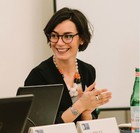
Funzione/Ruolo
Assistant Professor alla Leiden University
Percorso professionale
Silvia D’Amato ottiene prima la laura triennale in Studi Internazionali presso l’Università degli Studi di Firenze e successivamente la laura magistrale in Scienze Internazionali e Diplomatiche presso l’Università di Bologna (campus di Forli). Ottiene successivamente il Dottorato di Ricerca in Scienze Politiche presso la Scuola Normale Superiore con lode e dignità di pubblicazione. Dopo il coinvolgimento come assegnista di ricerca nel progetto di ricerca H2020 REPOND presso il Dipartimenti di Scienze Giuridiche dell’Università di Firenze. E’ stata dal 2018 Max Fellow presso l’European University Institute e Professoressa a contratto presso James Madison University e Università di Bologna. Attualmente è Assistant Professor presso il gruppo di ricerca Terrorism and Political Violence (TPV) di Leiden University.
Risultati scientifici
Silvia D’Amato si è occupata dagli studi magistrali di Relazioni Internazionale con specializzazione in forme di violenza politica e in particolare di guerre civili in Africa Occidentale. Durante gli studi dottorali si è successivamente specializzata in dinamiche di terrorismo e risposte di controterrorismo, in particolare in ambito Europeo. Le sue principali aree di ricerca coprono dunque politica internazionale, terrorismo e controterrorismo, politica estera, interventi militari.
Attività editoriali e pubblicazioni
Pubblicazioni recenti
[2021] D'Amato S. and Sachoulidou A. "European transnationalism between successes and shortcomings: threats, strategies and actors under the microscope", Journal of Contemporary European Studies, 1-8.
[2021] D'Amato S. "Patchwork of counterterrorism: analyzing European types of cooperation in Sahel", International Studies Review, 0: 1-23.
[2020] D'Amato S. & Baldaro E. "Jihadi paranoia: why we (still) need to rethink the debate on terrorism and political violence", Open Democracy.
[2019] D’Amato, S. Cultures of Counterterrorism: French and Italian approaches to terrorism in the post 9/11. Routledge.
[2019] D’Amato, S., Lucarelli S. "Talking Migration: Narratives of Migration and Justice Claims in the European Migration System of Governance", The International Spectator, 54(3): 1-17.
[2019] D’Amato, S., Lavizzari, A. "The Migration Triangle: Narratives, Justice and the Politics of Migration in France", The International Spectator, 54(3): 37-53.
[2019] Baldaro, E.,D’Amato, S. & Giurati, T. "The CorsAfrique: The Corsican milieu in Africa, between business and raison d’Etat", European Review of Organized Crime, 5(1):36-59.
[2019] D’Amato, S., "Islamisation of criminal behaviour: the path to terrorism? Terrorist threat and crime in French counterterrorism policy-formulation". Special Issue ‘Jihadism and Crime in Europe’, European Journal of Criminology.
[2018] Coticchia, F., D’Amato, S. "Can you hear me Major Tom? News, narratives and contemporary military operations: the case of the Italian mission in Afghanistan", European Security, 27(2): 224-244.
[2018] D’Amato, S., "From BR to ISIS. The Italian domestic and international response to terrorism", European Politics and Society, 19(4): 416-434.
[2018] D’Amato, S., Terlizzi, A., Federico, V. Comparative Database on Migration, RESPOND.
[2018] D’Amato, S., Pannia, P. & Federico, V. National Country Report: Italy. Working Paper, RESPOND.
The full list's publications can be viewed online by clicking here.

Funzione/Ruolo
Direttrice Aspenia e Senior Advisor European Affairs, The Aspen Institute. Membro del Comitato Direttivo dello IAI, Vice-Presidente del Centro Studi Americani, membro del Board dello European Council for Foreign Relations e del Comitato Scientifico della LUISS School of Government di Roma. Membro del Consiglio di Amministrazione di Leonardo, della Fondazione Mattei, e di Falck Renewables.
Percorso professionale
Laureata in Storia Contemporanea all’Università di Firenze, ha cominciato la sua carriera professionale al Cespi, Centro Studi di politica internazionale, che ha diretto per dieci anni. Fra il 1998 e il 2001 è stata consigliera per la politica estera del Presidente del Consiglio. Nel 2006-2008 ha guidato il Gruppo di riflessione strategica del Ministero degli Affari Esteri.
Il 28 novembre 2011 è stata nominata sottosegretaria al Ministero degli Affari Esteri nel Governo Monti. Il 27 marzo 2013 è stata nominata, insieme al collega Staffan de Mistura, Viceministra degli esteri. Il 3 maggio seguente è stata nominata Viceministra degli affari esteri nel Governo Letta.
In occasione di Expo 2015 a Milano è stata nominata Executive President dell'iniziativa WE-Women for Expo.
Risultati scientifici
Marta Dassù è una rinomata saggista e studiosa di politica internazionale. La sua esperienza nel settore della politica estera l’ha portata a ricoprire importanti incarichi di rilievo istituzionale e governativo. Grande conoscitrice della politica Europea ed americana è anche un’esperta di tematiche della sicurezza.
Marta Dassù è anche un’esperta internazionale di tematiche di genere ed in particolate relative al “women empowerment”. E’ Presidente esecutiva del Comitato internazionale di WE - Women Empower the World nata dalla esperienza positiva di WE-Women for Expo per sostenere la visibilità della “dimensione di genere” nelle relazioni internazionali e nelle sfide globali.
Attività editoriali e pubblicazioni
Marta Dassù is author of many publications, including:
[2019] Dassù M. (con Edoardo Campanella), Anglo Nostalgia. The politics of emotion in a fractured West, Hurst and Oxford University Press.
[2009] Dassù M, Mondo Privato e altre storie, Bollati Boringhieri.
Riconoscimenti e premi
E’ stata insignita della Légion d’Honneur. E’ Cavaliere di Gran Croce della Repubblica italiana.

Funzione/Ruolo
Professoressa associata di Scienza Politica presso l’Università degli studi di Trieste.
Percorso professionale
Laureata in Scienze Politiche presso l’Università degli Studi di Bologna (2003), ha conseguito il titolo di Master in Istituzioni Parlamentari Europee e Storia Costituzionale presso l’Università degli Studi di Roma La Sapienza (2004) e il PhD in Comparative and European Politics presso l’Università degli Studi di Siena (2008). Ha poi lavorato come assegnista di ricerca presso l’Università di Siena fino al 2011, per trasferirsi poi a Lisbona nel 2012, con un assegno post-doc e, a partire dal 2016, come ricercatrice a tempo determinato, presso la Universidade NOVA di Lisbona. Alla fine del 2018 ha fatto ritorno in Italia, presso l’Università di Trieste, come Ricercatrice a tempo determinato di tipo Senior, dove tuttora lavora come Professoressa Associata di Scienza Politica. È assistant editor della rivista South European Society and Politics dal 2016 e managing editor della Rivista Italiana di Scienza Politica dal 2019. Dal 2022 è co-chair dello Standing Group Governo, Parlamento, Rappresentanza della Società Italiana di Scienza Politica.
Risultati scientifici
I suoi principali interessi di ricerca sono l’analisi comparata delle istituzioni di rappresentanza nei sistemi politici contemporanei e lo studio dei comportamenti dei vari attori istituzionali nell’arena parlamentare, con particolare attenzione al ruolo e le caratteristiche dell’opposizione parlamentare. Negli anni, le sue ricerche si sono concentrate sull’Italia e, a partire dalla crisi economica dell’Eurozona, anche sul sud Europa più in generale, con un focus speciale sul caso portoghese. Ha partecipato e coordinato progetti di ricerca nazionali e internazionali su questi temi, con sede sia in Italia sia in Portogallo e attualmente è a capo dell’unità di ricerca di Trieste nell’ambito del progetto PRIN Democracy under Pressure e membro dei team di ricerca di diversi progetti internazionali, con sede in Portogallo e Spagna.
Attività editoriali e pubblicazioni
De Giorgi, E., Dias, A. e Dolny, B. (2021) New Challenger Parties in Opposition: Isolation or Cooperation?, Parliamentary Affairs, Vo.74, no.3.
De Giorgi, E. e Santana-Pereira, J. (2020) The Exceptional Case of Post-Bailout Portugal: A Comparative Outlook, South European Society and Politics, Vol.15, no.2.
Moury, C., De Giorgi, E. e Pita Barros, P. (2020) How to Combine Public Spending with Fiscal Rigour? ‘Austerity by Stealth’ in Post-Bailout Portugal (2015-2019), South European Society and Politics, Vol.15, no.2.
De Giorgi, E. e Dias, A. (2020) Divided, but not by much: the parties of the centre right between government and opposition, Contemporary Italian Politics, Vol.12, no.2.
De Giorgi, E. e Cancela, J. (2019) The Portuguese Radical Left Parties Supporting Government: From Policy-Takers to Policymakers?, Government and Opposition, Vol.56, no.2.
De Giorgi, E. e Ilonszki, G. (a cura di) (2018) Opposition parties in European legislatures. Conflict or consensus?, Abingdon, Routledge.
De Giorgi, E. (2016) L’opposizione parlamentare in Italia. Dall’antiberlusconismo all’antipolitica, Roma, Carocci.
De Giorgi, E. e Santana-Pereira, J. (2016) The 2015 Portuguese Legislative Election: Widening the Coalitional Space and Bringing the Extreme Left in, South European Society & Politics, Vol. 21, no. 4.
Moury, C. e De Giorgi, E. (2015) Introduction: Conflict and consensus in Parliament during the economic crisis, The Journal of Legislative Studies, Vol. 21, no. 1.
De Giorgi, E., Moury, C., Ruivo, J.P. (2015) Incumbents, opposition and international lenders: governing Portugal in times of crisis, The Journal of Legislative Studies, Vol. 21, no. 1.
De Giorgi, E. (2015) The evolution of the Italian opposition in the last twenty years: has anything changed?, Contemporary Italian Politics, Vol. 7, no.1.
De Giorgi, E. e Marangoni, F. (2015) Government laws and the opposition parties’ behaviour in parliament, Acta Politica, 50.

Funzione/Ruolo
Docente di media e comunicazione presso l’Università americana John Cabot, Roma.
Percorso professionale
Dopo la laurea in scienze della comunicazione presso La Sapienza di Roma, si specializza in lingua araba classica con un corso professionale presso l’ISIAO di Roma e, successivamente, in dialetto siriano presso l’Università di Damasco. Nella sua carriera è stata giornalista per la carta stampata (Il Sole24ore, Il Manifesto, Internazionale, Al Jazeera English, Wired), autrice televisiva (Rai), e manager della comunità di lingua araba per l’organizzazione internazionale Creative Commons. Nel 2013 ha completato un dottorato di ricerca presso l’Università di Copenaghen, a cui è seguito un post dottorato presso la Annenberg School for Communication, USA. È stata inoltre Affiliate presso il Berkman Klein Center for Internet and Society di Harvard University, USA.
Risultati scientifici
La sua ricerca si sviluppa principalmente su due filoni. Il primo è quello della geopolitica dei media in Medio Oriente, all’interno del quale ha sviluppato ricerche sui network panarabi (Al Jazeera, ecc.), su particolari generi televisivi (fiction seriali, ecc.) e della rete (memes, ecc.), e su aree specifiche (Siria). Il secondo è quello dell’analisi critica dei media digitali, e del rapporto dei nuovi formati ‘social’ con la politica e la rappresentazione della violenza. Il suo ultimo libro ‘Shooting a Revolution: Visual Media and Warfare in Syria’ (Pluto Press, 2018) è espressione di queste due ‘anime’ di ricerca.
Attività editoriali e pubblicazioni
[2018] Della Ratta D. Shooting a Revolution. Visual Media and Warfare in Syria, Pluto Press.
[2015] Della Ratta D. (insieme a Sakr N. e Skovgaard Petersen J.), Arab Media Moguls, I.B. Tauri.
[2014] Della Ratta D. La Fiction Siriana. Mercato e Politica della Televisione nell`Era degli Asad,Arab Media Report.
[2009] Della Ratta D,. (insieme a Valerani A.), Un Hussein alla Casa Bianca. Cosa pensa il mondo arabo di Barack Obama, Odoya.
[2005] Della Ratta D. Al Jazeera. Media e Società Arabe nel Nuovo Millennio, Bruno Mondadori Editore.
[2000] Della Ratta D. Media Oriente. Modelli, Strategie e Tecnologie nelle Nuove Televisioni Arabe, Seam.
Riconoscimenti e premi
Il portale sulla Siria da lei co-fondato, SyriaUntold.com, è stato insignito nel 2014 dal Festival Ars Electronica di Linz del riconoscimento come migliore digital community.
Nel 2000 ha ricevuto il Premio Ilaria Alpi come miglior autrice televisiva under 30 per il lavoro svolto presso il programma di Rai 2 Un Mondo a Colori.

Area Politica internazionale
Competenze: conflitto israelo-palestinese, politiche interne ed estere di Israele, Relazioni fra Europa e Medioriente, relazioni internazionali del Medio Oriente, relazioni tra l’Europa e i Paesi del Medio Oriente Mediterraneo e Nord Africa, relazioni tra UE Israele e Territori Palestinesi
Parole chiave: Israele, frontiere e ordine regionale, Maghreb, Mashreq, Medio Oriente Mediterraneo e Nord Africa, sicurezzza e politiche identitarie
Regione: Emilia-Romagna
Funzione/Ruolo
Professoressa associata degli Studi del Medio Oriente alla Johns Hopkins University School of Advanced International Studies, SAIS Europe (Bologna).
Percorso professionale
Laureata in Scienze Politiche presso la Albert-Ludwigs Universität di Freiburg, in Germania inizia la sua carriera come collaboratrice esterna e consultente presso la Friedrich Naumann Foundation, Gerusalemme (1997-1998) e l’Israel Democracy Institute a Gerusalemme. Dal 1998 al 2000 è Manager del progetto ‘The German Fund for Palestinian NGOs’ per Friedrich Naumann Foundation, Gerusalemme. Nel 2003 ottiene il PhD in Relazioni Internazionali presso la Hebrew University of Jerusalem (summa cum laude).
Dal 2004 al 2005 è Jean Monnet Fellow all’Istituto Universitario Europeo e dal 2005 al 2007 Marie Curie Fellow Marie Curie Fellow, sempre presso l’Università Europea. Dal 2007 al 2011 è Pears Fellow in Israel and Mediterranean Studies presso l’Università di Oxford, St Antony’s College, Middle East Centre. Fra il 2011 e la primavera del 2019 è part-time Professor presso Istituto Universitario Europeo. Dal 2010 è Professoressa aggiunta (Adjunct Professor) degli Studi del Medio Oriente e delle Relazioni Internazionali, presso la Johns Hopkins University School of Advanced International Studies, SAIS Europe (Bologna) dove, nel 2015, diventa Professoressa Associata degli Studi del Medio Oriente. Ha ottenuto l’abilitazione scientifica nazionale di seconda fascia nel 2015 e di prima fascia nel 2019.
Risultati scientifici
Raffaella A. Del Sarto è stata ‘principal investigator’ e direttrice del progetto di ricerca BORDERLANDS: Boundaries, Governance, and Power in the European Union's Relations with North Africa and the Middle East, finanziato dal European Research Council (ERC), dal 2011-2018, presso l’Istituto Unviversitario Europeo.
Ha pubblicato due monografie, oltre 15 articoli accademici, oltre 10 capitoli di libri e vari policy reports e working paper. Inoltre ha curato 5 volumi.
Attività editoriali e pubblicazioni
Raffaella Del Sarto è membro dell'Editorial Board della rivista The International Spectator e membro dell’International Advisory Board della rivista Mediterranean Politics e membro dell'International Advisory Board della rivista International Affairs.
Ha inoltre pubblicato:
[2019] Del Sarto, R. A. ‘Stuck in the Logic of Oslo: Europe and the Israeli-Palestinian Conflict’, The Middle East Journal 73(3): 376-396.
[2019] Del Sarto, R. A. ‘Insecurity, Identity Politics, and the Restructuring of the Middle East’, in Shifting Global Politics and the Middle East, POMEPS Studies 34, March, Project on Middle East Political Science.
[2019] Del Sarto, R. A., Malmvig, H. and Soler i Lecha, E., Interregnum: The Regional Order in the Middle East and North Africa after the Arab Uprisings, MENARA Final Report no. 1, February.
[2018] Del Sarto, R A. and Jean-Pierre Cassarino, ‘The Governance of Migration and Border Controls in the European-North African Context’, MENARA Working Paper no. 13, September.
[2017] Del Sarto, R. A. Israel under Siege: The Politics of Insecurity and the Rise of the Israeli Neo-Revisionist Right, Washington, D.C.: Georgetown University.
[2017] Del Sarto, R. A. ‘Contentious Borders in the Middle East and North Africa: Context and Concepts’, in International Affairs 93(4): 767-787.
[2017] Del Sarto, R. A., Fawcett L. and Okyay A., eds., Contentious Borders: Sovereignty and Statehood in the Middle East and North Africa post-2011, special issue of International Affairs, 93(4).
[2016] Del Sarto, R. A. ‘Normative Empire Europe: The European Union, Its Borderlands, and the “Arab Spring”’, Journal of Common Market Studies 54(2): 215-232.
[2015] Del Sarto, R. A., ed. Fragmented Borders, Interdependence and External Relations: The Israel-Palestine-European Union Triangle, Basingstoke: Palgrave Macmillan.
[2015] Del Sarto, R. A. ‘Defining Borders and People in the Borderlands: EU Policies, Israeli Prerogatives and the Palestinians’, Journal of Common Market Studies 52(2): 200-216.
[2011] Del Sarto, R. A. and Schumacher T. ‘From Brussels with Love: Leverage, Benchmarking, and the Action Plans with Jordan and Tunisia in the EU’s Democratization Policy’, Democratization 18(4): 932-955.
[2006] Del Sarto, R. A., Adler E., Bicchi F., and Crawford B. eds. The Convergence of Civilizations: Constructing a Mediterranean Region, Toronto: University of Toronto Press.
[2006] Del Sarto, R. A. Contested State Identities and Regional Security in the Euro-Mediterranean Area, New York: Palgrave Macmillan.
[2005] Del Sarto, R. A. and Schumacher T. ‘From EMP to ENP: What’s at Stake with the European Neighbourhood Policy towards the Southern Mediterranean?’, European Foreign Affairs Review 10(1): 17-38.
Per una lista completa delle pubblicazioni si veda qui.
Riconoscimenti e premi
Nel 2003 ha ottenuto il premio Alex Berger per l’eccellente tesi di dottorato presso la Hebrew University di Gerusalemme (2003).
Da ottotbre 2019 a marzo 2020 è stata Robert Schuman Fellow presso l’Istituto Universitario Europeo.
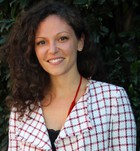
Area Politica internazionale
Competenze: azione esterna dell'Unione Europea, politica estera dell'Italia, relazioni tra Italia e Russia, relazioni transatlantiche, relazioni tra Occidente e Russia, sicurezza energetica nell'Unione Europea, Unione Europea
Parole chiave: populismo, Unione Europea
Regione: ESTERO
Funzione/Ruolo
Esperta di politica estera dell'Italia e dell'Unione Europea
Percorso professionale
Giovanna De Maio ha una laurea specialistica e un dottorato in Studi Internazionali, entrambi conseguiti presso l’Università Orientale. Durante il dottorato ha lavorato sul conflitto in Ucraina del 2014 dal punto di vista geopolitico, sociale e politico-culturale russo; ha svolto un periodo all’estero di ricerca a Mosca e ha completato la stesura della tesi presso la Brookings Institution, dove ha anche condotto uno studio sulle relazioni energetiche tra Ue e Russia.
Prima del dottorato, ha ottenuto un master in Studi Diplomatici dalla Società Italiana per l’Organizzazione Internazionale di Roma (Sioi). Nel corso della sua formazione in ambito internazionale, ha svolto tirocini a Strasburgo, presso il Consiglio d’Europa, a Bruxelles, presso l’osservatorio Athena-EuLogos, e presso l’Istituto Affari Internazionali di Roma.
Ha lavorato come ricercatrice post-doc presso l’Istituto francese per le relazioni internazionali (Ifri) di Parigi, dove ha analizzato l’impatto delle sanzioni alla Russia (e delle contro-sanzioni russe) sull’economia italiana, e presso il German Marshall Fund of the United States (GMFUS) di Washington, D.C, lavorando a uno studio sui legami tra la Russia e i partiti politici italiani in vista delle elezioni politiche del 2018. Dal 2018 fino al 2021 è stata visiting research fellow alla Brookings Institution, con un periodo, dal 2020 al 2021, di visiin all?Istituto per gli studi europei, russi e euroasiatici alla George Washington University. Dall’ottobe del 2021 è rientrata in Europa, in Francia, dove attualmente lavora alla pianificazione politica del Ministero per gli affari esteri francese.
Risultati scientifici
Giovanna De Maio ha lavorato presso importanti istituti di ricerca internazionali in stretto contatto con organizzazioni internazionali e rappresentanze diplomatiche. Ha presentato il suo lavoro in diversi contesti, dalle università (Harvard, Tartu), think tank (Brookings e Ifri), e settore privato; ha rilasciato interviste con BBC, NPR News, CGTN America, RBK Russia. Di recente, ha illustrato le politiche di asilo in Italia e Ue presso l’Ufficio esecutivo del presidente degli Stati Uniti d’America (Office of Management and Budget).
Attività editoriali e pubblicazioni
Selezione di commentaries
[2019] De Maio G. Nord Stream 2: A failed test for EU unity and trans-Atlantic coordination, Georgetown Journal of International Affairs, Aprile.
[2019] De Maio G. The broken compass of Italian foreign policy, Order from Chaos, The Brookings Institution, Marzo.
[2019] De Maio G. Italy and Russia, the link is increasingly close, Reset Dialogues on Civilization, Marzo.
[2019] De Maio G. Europe’s Campaign Season Is Just Beginning, con Célia Belin, The American Interest, Febbraio.
[2019] De Maio G. Italy and immigration: Europe’s Achilles’ heel, Order from Chaos, The Brookings Institution, Gennaio.
[2018] De Maio G. The Palermo conference on Libya: A diplomatic test for Italy’s new government, Order from Chaos, The Brookings Institution, Novembre.
[2017] De Maio G. Russia: uncertain revolutions and future question marks, Reset Dialogues on Civilization, Novembre.
[2017] De Maio G. Anti-corruption Rallies in Russia: The Awakening of Civil Society?, Reset Dialogues on Civilization, Luglio.

Funzione/Ruolo
Ricercatrice in diritto internazionale pubblico presso la Facoltà di Giurisprudenza dell'Università Cattolica di Milano
Percorso professionale
Francesca De Vittor è ricercatrice confermata in diritto internazionale presso la Facoltà di Giurisprudenza dell'Università Cattolica di Milano (dal novembre 2013), e precedentemente presso l’Università degli studi di Macerata. Attualmente docente del corso di Diritti dell'uomo presso l'Università Cattolica, tra il 2006 e il 2013 ha tenuto i corsi di Diritto internazionale, Diritto dell’Unione europea, International Organization Law, Tutela internazionale dei diritti dell’uomo e Diritto dell’immigrazione presso la Facoltà di Scienze politiche dell’ateneo maceratese. Dopo aver conseguito la Laurea in Giurisprudenza presso l’Università degli Studi di Bologna (nel 1999, con votazione 110/110 e lode), ha frequentato il D.E.A in diritto internazionale presso l’Université Robert Schuman di Strasburgo. Nel 2004, in seguito ad un dottorato in co-tutela tra l’Università Federico II di Napoli e l’Université Robert Schuman di Strasburgo, ha ottenuto il doppio titolo di dottore di ricerca e di docteur en droit, discutendo una tesi su Immunità degli Stati dalla giurisdizione e tutela dei diritti umani fondamentali(giudiziotrès honorable avec les félicitations du jury). Dal 2005 al 2006 è stata Jean Monnet fellow presso l’Istituto Universitario Europeo di Firenze. Dal 2009 al 2012 ha partecipato al collegio di difesa della Repubblica Italiana nella controversia relativa a Jurisdictional Immunities of the State (Germany v. Italy: Greece intervening)davanti alla Corte Internazionale di Giustizia.
Risultati scientifici
Attualmente si occupa principalmente di diritto dell’immigrazione e dell’asilo, con particolare attenzione alle questioni relative all’esternalizzazione delle frontiere e al soccorso in mare.
Attività editoriali e pubblicazioni
Selezione di pubblicazioni
[2018] De Vittor, F.,Soccorso in mare e favoreggiamento dell’immigrazione irregolare: sequestro e dissequestro della nave Open Arms, in Diritti Umani e Diritto Internazionale, 12, 1, 443-452.
[2018] De Vittor, F., Responsabilità degli Stati e dell’Unione europea nella conclusione e nell’esecuzione di ‘accordi’ per il controllo extraterritoriale della migrazione, in Diritti Umani e Diritto Internazionale, 12, 1, 5-27.
[2017] De Vittor, F., Migrant Children’s Right to Education, in F. Ippolito (ed.) Migrant Children in the 21st Century, Editoriale scientifica.
[2015] De Vittor, F., I risultati del Consiglio europeo straordinario sull’emergenza umanitaria nel Mediterraneo: repressione del traffico di migranti o contrasto all’immigrazione irregolare?, post SidiBlog 27 aprile, http://www.sidi-isil.org/sidiblog/?p=1399.
[2014] De Vittor, F., IldirittoditraversareilMediterraneo…oquantomenodiprovarci, in Diritti umani e diritto internazionale, 8, 1, 63-81.
[2013] De Vittor, F., Cannizzaro E.,Proportionality in the European Convention on Human Rights, in Kolb and Gaggioli (ed.), Research Handbook on Human Rights and Humanitarian Law, Edward Elgar, Cheltenham, (ISBN 978 1 84980 035 8).
[2013] De Vittor, F.:Nationality and freedom of movement,in Annoni and Forlati (ed. by), The Changing Role of Nationality in International Law, Routledge, London, ISBN: 978-0-415-53545-8, 96-116.
[2012] De Vittor, F.,Respingimenti in mare ed 'esternalizzazione' della protezione: il confine territoriale come limite agli obblighi di tutela, in Ius peregrinandi: il fenomeno migratorio tra diritti fondamentali, esercizio della sovranità e dinamiche dell’esclusione, Meccarelli, Sotis, Palchetti (eds), ed. EUM, Macerata, ISBN 88-978-6056-346-0, 183-205.
[2010] De Vittor, F.: Institutions européennes et protection des migrants et refugiés, in Millet-Devalle (ed.), L’Union européenne et la protection des migrants et des refugiés, Pédone Paris, ISBN 978-2-233-00611-0, pp. 41-62.
[2010] De Vittor, F.:Sviluppo psicofisico del minore e controllo dell’immigrazione clandestina: il bilanciamento operato dalla Corte di cassazione, in Diritti umani e diritto internazionale, 442-447.
[2009] De Vittor, F.: Soccorso in mare e rimpatri in Libia: tra diritto del mare e tutela internazionale dei diritti dell’uomo, in Rivista di diritto internazionale, 800 ss.
[2008] De Vittor, F.: Immunità degli Stati dalla giurisdizione e risarcimento del danno per violazione di diritti fondamentali: il caso Mantelli, in Diritti umani e diritto internazionale.
[2008] De Vittor, F.: “Diritto ad un ricorso effettivo e procedure per il riconoscimento dello status di rifugiato: la sospensione della misura di espulsione, in Diritti umani e diritto internazionale, 427-432.

Funzione/Ruolo
Professoressa associata di diritto dell’Unione europea. Docente di diritto degli stranieri e “EU current policies on migration and development” all'Università statale di Milano
Percorso professionale
Dopo aver conseguito la laurea in Giurisprudenza presso l'Università degli Studi di Milano nel 1997, prosegue la sua formazione con il Corso di preparazione alla carriera diplomatica e alle carriere internazionali presso l’ISPI a Milano. Abilitata alla professione di avvocata/o fino al 2007 è Associate presso lo Studio legale internazionale Baker Mckenzie. Nel 2005 consegue il dottorato di ricerca in diritto pubblico comunitario, presso l'Istituto Superiore Universitario di Formazione Interdisciplinare (ISUFI) - Università degli Studi di Lecce. Dal 2007 al 2011 è ricercatrice post-doc, dal 2011 è ricercatrice presso l’Università di Milano e dal 2018 è professoressa associata. Nel 2018 consegue altresì l’abilitazione scientifica nazionale in qualità di professoressa ordinaria. È stata visiting researcherpresso l’Université Libre de Bruxelles e presso il Centrefor MigrationLaw - Radboud Universityof Nijmegen. Sui temi delle politiche di immigrazione e asilo dell’Unione europea è stata docente in diversi istituti internazionali, tra cui l’ENA (Ecole Nationale d’Administration) a Strasburgo e l’Academy of European Law, European University Institute (Fiesole). Dal 1998 partecipa alle attività e dal 2012 è rappresentante italiana (insieme al Prof. Nascimbene) del Network Odysseus (rete accademica per gli studi giuridici sull'immigrazione e l'asilo che riunisce i maggiori esperti del tema negli Stati membri dell’UE).
Risultati scientifici
La sua attività di ricerca si svolge principalmente nel campo delle politiche di immigrazione e asilo dell’Unione europea. Partecipa a numerosi progetti di ricerca finanziati da Commissione Europea, dal Parlamento europeo, dal Ministero Italiano dell’Università e della Ricerca. È stata responsabile scientifica per la parte italiana dei progetti CONTENTION (http://contention.eu) e REDIAL http://euredial.eu), finanziati dalla Commissione Europea.
Nell’ambito delle attività condotte dalla rete Odysseus ha realizzato numerose analisi sull’attuazione della normativa dell’Unione europea a livello nazionale, che sono poi state utilizzate dalla Commissione europea per le proprie valutazioni politiche e per lo sviluppo della disciplina della materia.
Attività editoriali e pubblicazioni
Membro della redazione di diverse riviste scientifiche (Diritto, Immigrazione e Cittadinanza, eurojus.it, La Comunità internazionale), collabora all’attività di ricerca nel settore della legislazione europea con la Fondazione ISMU (Iniziative e Studi sulla Multietnicità, Milano) ed è autrice del capitolo sugli orientamenti europei nell’ambito del rapporto annuale sulle migrazioni, è autrice di numerose pubblicazioni nazionali e internazionali. Tra queste:
[2020] Di Pascale A., 'Can a Justice of Peace be a good detention judge?', in Bruycker P., Cornelisse G. Moraru M Law and Judicial Dialogue on the Return of Irregular Migrants from the European Union, Hart Publishing, Oxford.
[2018] Di Pascale A., 'El principio de non refoulementy su aplicación judicial en el marco europeo', in Ugartemendia J. I., Labayle Y, El Espacio de Libertad, Seguridad y Justicia y el Derecho del Convenio Europeo de Derechos Humanos, European Inklings(EUi) 15, IVAP, Oñati, 2.
[2018] Di Pascale A., 'As políticas de imigração e asilo da União Europeia: balanço e perspectivas', in Beltrame de Moura A., Dal Ri L., Padinha Dos Santos R. Imigração e cidadania: uma releitura de institutos jurídicos clássicos, Editora PPCJ da Univali.
[2016] Di Pascale A, Nascimbene B., Art. 19, in R. Mastroianni, O.Pollicino, S.Allegrezza, F.Pappalardo, U. Razzolini (a cura di), La Carta dei diritti fondamentali dell’Unione europea.
[2016] Di Pascale A., 'Lo straniero (diritto internazionale)', in Enciclopedia Treccani (online), 10.
[2015] Di Pascale A, Renaudiere G., 'AG’s Opinion in Celaj: Lost in ‘Crimmigration’?', 22 June, Redial Blog, euredial.eu/blog.
[2015] Di Pascale A., 'Le politiche dell’immigrazione e asilo dell’Unione europea: alcune riflessioni sui primi quindici anni', in M. Carta (a cura di), Quale futuro per l’Europa tra crisi, rilancio e utopia, Soveria Mannelli, 241 ss.
[2015] Di Pascale A., 'Exceptional Duties to admit Aliens', in Sir Richard Plender (ed.), International Migration Law, The Hague: Martinus Nijhoff, 15.
[2014] Di Pascale A., 'Commento agli artt. 78, 79 del Trattato sul funzionamento dell'unione europea', in A. Tizzano, Trattati dell’Unione europea, Milano.
[2014] Di Pascale A., 'Italy and unauthorised migration: between state sovereignty and human rights obligations', in R. Rubio Marin (Ed.), Migration and Human Rights, Collected Courses of the Academy of European Law, Oxford University Press.
[2011] Di Pascale A., Garcia Andrade P., Sarraj A., 'L’importance des relations bilatérales. Une analyse de l’action extérieure de l’Espagne, la France et l’Italie et pays tiers en matière d’immigration', in De Bruycker P.- Foblets M-C. (sous la direction de), La dimension extérieure de la politique européenne d’Immigration, Bruylant, Bruxelles.
[2011] Di Pascale A., Nascimbene B., 'The ‘Arab Spring’ and the Extraordinary Influx of People who arrived in Italy from North Africa', in European Journal of Migration and Law, 13, 3, 341 ss.
[2009] Di Pascale A., 'La participation de l’Italie à la politique d’externalisation de l’Union européenne', in Rossetto J. (sous la direction de), L’externalisation de la Politique d’immigration de l’Union européenne, Paris.
[2001] Di Pascale A., 'Synthesis report', in Nascimbene B. (ed.), Expulsion and detention of aliens in the EU member states, Giuffré, Milano.
[2000] Di Pascale A., 'La régularisation des immigrés clandestins en Italie', in P. De Bruycker (sous la direction de), Regularisations of illegal immigrants in the European Union, Bruylant, Brussels.
Riconoscimenti e premi
Membro del Consiglio direttivo di AISDUE (Associazione italiana degli studiosi di diritto dell’Unione europea), iscritta alla SIDI (Società italiana di diritto internazionale), componente del Comitato scientifico della Cattedra Unesco "Diritti dell'uomo ed etica della cooperazione internazionale", Università degli Studi di Bergamo.
Dal 2017 ha dato vita all’iniziativa “Promoting Refugees integration”, nata dalla collaborazione tra Baker McKenzie Italia, l’Università Statale di Milano, l’UNHCR (l'Agenzia delle Nazioni Unite per i Rifugiati) e l’ONG “Farsi Prossimo", con l’obiettivo di aiutare i rifugiati titolari di protezione internazionale ad acquisire nuove conoscenze e a sviluppare le qualifiche necessarie per aumentarne l'autostima e facilitarne l'ingresso stabile nel mondo del lavoro. Nel 2018 l’iniziativa ha ricevuto il premio "Iniziativa dell'anno Pro Bono " in occasione della XII edizione dei TopLegal Awards e nel 2019, in occasione della II edizione del premio Welcome – Working for refugee integration, ha ricevuto un premio speciale dall’Alto Commissario Filippo Grandi.

Funzione/Ruolo
Professoressa associata di Scienza politica e Relazioni internazionali all’Università di Torino
Percorso professionale
Dopo aver conseguito la laurea in Scienze Politiche, ha frequentato il Master in Analisi delle Politiche Pubbliche sotto la direzione di Luigi Bobbio diplomandosi con lode nel 2000. In seguito ha lavorato come esperta di questioni mediterranee, con particolare attenzione al tema della società civile per Paralleli, Istituto Euromediterraneo del Nord Ovest frequentando, al contempo, il dottorato di ricerca in Scienza Politica e Relazioni Internazionali presso l’Università degli Studi di Torino. Ha studiato presso il Ceri di Parigi e l’Università St. Joseph di Beirut, in Libano. Nel 2007 ha conseguito il titolo di dottoressa di ricerca con una tesi sul processo di democratizzazione in Libano. Dopo il dottorato ha svolto attività di ricerca e di didattica presso gli Atenei di Torino e Firenze. Dopo il dottorato è stata visitingpresso l’Institut de Recherche sur le Maghreb Contemporaine (IRMC) di Tunisi e l’Università St. Joseph di Beirut. Ha svolto attività di ricerca in Libano e Tunisia. Dal 2011 è ricercatrice presso il Dipartimento di Culture, Politica e Società dell’Università di Torino. Dal 2011 è ricercatrice presso il Dipartimento di Culture, Politica e Società dell’Università di Torino, dove nel 2019 è diventata Professoressa Associata.
Risultati scientifici
Rosita Di Peri è autrice della prima storia politica del Libano contemporaneo pubblicata in Italia. Le sue ricerche sul sistema consociativo libanese sono state pubblicate sulle principali riviste di settore in Italia e all’estero. Si segnalano anche i suoi lavori sui movimenti islamisti libanesi sia sunniti sia sciiti, in particolare su Hezbollah. Rosita Di Peri ha anche condotto ricerche sulla transizione tunisina nel post 2011 concentrandosi in particolare sulle connessioni tra il turismo e il sistema di potere sviluppatosi nel paese. Ha curato diversi volumi e collaborato con colleghi e colleghe di varie università.
Rosita Di Peri ha svolto innumerevoli missioni di ricercain Libano e nella regione mediterranea.
Negli ultimi tre anni le sue ricerche si concentrano principalmente sulle trasformazioni della comunità cristiano maronita in Libano e sulle conseguenze di questa trasformazione sul sistema politico di questo paese.
Rosita Di Peri è stata principal investigator dei progetti “India and Middle East in the globalization era: paths of internationalization” tra il 2016 e il 2018 e “Globalization and Development Processes in Asia in the Age of Crisis: Continuity and Change” tra il 2013 e il 2015 entrambi finanziati dalla Fondazione Cassa di Risparmio di Torino ed è stata parte del team italiano del progetto europeo “Mare Nostrum. A heritage trail along the Phoenician maritime routes and historic port-cities of the Mediterranean Sea” guidato dall’Università di Firenze nel quadro del programma Euromed Heritage IV.
Attività editoriali e pubblicazioni
Rosita Di Peri è autrice di numerose pubblicazioni. Di seguito le più recenti:
[2021] Guida alla politica mediorientale. Mondadori, Milano (con F. Mazzucotelli)
[2019] "Stretching the margins: Identity, power and new ‘frontiers’ in Lebanon’s Maronite community", Mediterranean Politics.
[2018] "Speaking secular acting sectarian. Lebanese women’s rights beyond the Constitution", Oriente Moderno 98(2): 247-264.
[2017] Il Libano contemporaneo. Storia, politica e società, Carocci, Roma (prima edizione 2009, in italiano).
[2017] "Changing Perceptions of the European Union before and after the Arab uprisings", in B. Curli, M. Ceretta (a cura di), Discourses and Counter-discourses on Europe, from the Enlightenment to the EU, Routledge, 249-260.
[2017] "State and markets: the crisis of the tourism sector in Tunisia before and after the ‘jasmine revolution", in E. Baroncelli, R. Mulé (a cura di) Political Responses to Global Economic Crises, Egea, Milano.
[2016], "The Transformation of the Maronite Community in Lebanon in the Post-2005 Era and the Rise of Relative Deprivation", in G. Proglio (a cura di), Decolonizing the Mediterranean, Cambridge Scholars Publishing, 19-34.
[2016], "The Sunni Community in Lebanon: From “Harirism” to “Sheikhism”?" (con Daniel Meier), in R. Di Peri, D. Meier (a cura di), Lebanon facing the Arab Uprisings. Constraints and Adaptations’,Palgrave McMillian, London, 35-53.
[2016], Lebanon facing the Arab Uprisings. Constraints and Adaptations, Palgrave McMillian, London (coautorato con D. Meier)
[2016], "Narratives and realities from a changing Middle East", Passato e Presente, 98: 74-89 (in italiano).
[2016], "Beyond Sectarianism: Hegemony, Reproduction and Resilience in Lebanon", Mediterranean Politics.
Riconoscimenti e premi
Rosita Di Peri è Vice presidente del corso di laurea in Scienze Internazionali; membro del direttivo di SeSaMO (Società per gli studi sul Medio Oriente); membro del comitato scientifico della collana Mediterraneo, Nord Africa e Medio Oriente per Mimesis; membro comitato editoriale rivista NAD (Nuovi Autoritarismi e Democrazie); coordinatrice programma Erasmus partner countriescon il Libano. Dal 2014 è responsabile scientifica della scuola estiva “Understanding the Middle East”.

Funzione/Ruolo
Professoressa ordinaria presso il Dipartimento di Scienze Politiche dell'Università di Pisa
Percorso professionale
Conseguito il Dottorato di ricerca in Scienze Politiche, Storia delle Relazioni Internazionali, presso la Facoltà di Scienze Politiche di Firenze nel 1996, ha poi svolto, sempre nel medesimo settore scientifico disciplinare, attività di ricerca postdottorale tra il 1997 e il 1999, usufruito di una borsa di specializzazione semestrale C.N.R. nel 2000, beneficiato di un assegno di ricerca nel triennio 2001-2004. All’estero ha svolto lezioni di “Storia delle Relazioni Internazionali” presso la Facoltà di Lettere dell’Università di Pécs, Ungheria (A.A. 1991-1992), al Moscow State Institute of International Relations (MGIMO) di Mosca (1993-1994), presso l’Università di Ekaterinburg, Russia (A.A. 2000-2001), e “Storia dell’Europa Orientale” presso la Facoltà di Lettere e Filosofia, Studi Politici e Amministrativi dell’Università di Arad (A.A. 2007-2008). In Italia, ha insegnato presso la Facoltà di Scienze Politiche di Firenze “Storia dell’Europa Orientale” (A.A. 2000-2001), “Storia delle Organizzazioni Internazionali” (A.A. 2003-2004), “Storia dell’integrazione europea” (A.A. 2004-2005), “Storia delle Organizzazioni Internazionali” (A.A. 2004-2005, 2005-2006, 2006-2007); presso la Facoltà di Lingue e Letterature Straniere Moderne di Viterbo “Storia dell’Europa Orientale” (A.A. 2005-2006) e, sempre a Viterbo, “Storia delle Relazioni Internazionali” presso il Corso interuniversitario di Scienze Organizzative e Gestionali dell’Università della Tuscia (AA. 2006-2007, 2007-2008, 2008-2009); presso la Facoltà di Scienze Politiche di Padova “Storia dell’Europa Orientale” (A.A. 2007-2008). Dal 2009 è docente presso il Dipartimento di Scienze Politiche dell’Università di Pisa.
Fa regolarmente parte di Commissioni di Dottorato, è Membro del Comitato di Direzione della Rivista “DEP (Deportate, esuli e profughe)”, diretta dalla Prof.ssa Bruna Bianchi dell’Università Ca’ Foscari di Venezia e del Comitato Scientifico della rivista “Nuova Storia Contemporanea”. Presidente dal 2014 della Commissione per l’attribuzione del Premio “Guido Galli”, per la migliore Tesi di Laurea Magistrale della Scuola di Scienze Politiche di Firenze, membro dal 2011 del Consiglio direttivo dell'Associazione Alumni Cesare Alfieri di Firenze, dal 2013 fa parte del Comitato Esecutivo dell'Associazione "Amici degli Archivi Storici delle Comunità Europee" presso l’Istituto Universitario Europeo di Firenze e dal 2014 del Comitato Storico Scientifico della Fondazione Bettino Craxi, Roma. Attualmente è membro della Commissione di Abilitazione Scientifica Nazionale e della Commissione per il concorso diplomatico presso il MAECI.
Risultati scientifici
Direzione o partecipazione alle attività di un gruppo di ricerca caratterizzato da collaborazioni a livello nazionale o internazionale.
Tra il 1999 e il 2001 ha partecipato a numerosi gruppi di ricerca ed in particolare: “Il cinema e i suoi simboli”; la “Storia del PCI e dei suoi archivi” promosso dall’Istituto Fondazione Gramsci; "L'Italia e il processo di integrazione europea”, promosso dall’Istituto Luigi Sturzo di Roma in collaborazione con il Master di Studi Europei della Facoltà di Scienze Politiche di Firenze; “Il Parlamento europeo e la sua storia” in collaborazione con gli Archivi del Parlamento Europeo e con gli Archivi Storici delle Comunità Europee.
Tra il 2001e il 2002, ha collaborato al progetto di ricerca “East-West Economic Relationships in Cold War Europe”, promosso e coordinato dal Professor Luciano Segreto, Facoltà di Scienze Politiche di Firenze. Dal 2004 al 2006 ha partecipato al progetto di ricerca nazionale COFIN “L’Italia nelle relazioni internazionali del ‘900”, al progetto “La Comunità Europea e la formazione professionale: storia e ruolo del CEDEFOP” promosso dalla Comunità Europea ed infine al progetto COFIN dell’Università di Milano sul tema “Gli archivi russi in Italia”.
Nel 2009 ha collaborato al progetto Prin della Facoltà di Scienze Umanistiche, Università La Sapienza Roma, su “Imperi e Nazioni in Europa dal XVIII al XX secolo”, nel 2015 a due progetti Prat il primo del Dipartimento di Scienze Politiche, Università di Pisa, su “Money and Politics. Finanziamento pubblico, contributi privati e corruzione politica in prospettiva comparata” ed il secondo del Dipartimento di Scienze Politiche, Università di Padova, su “A cent’anni dal pericolo rosso. L’impatto della rivoluzione bolscevica sulle potenze coloniali europee: un approccio globale”. Infine nel 2016 ha collaborato al Progetto di Ricerca di Ateneo 2016 del Dipartimento di Scienze Politiche, Università di Padova, su “Italy in the International System between 1917 and the early 1920. The Opportunity to become a Great Power, Italy and the New International Order”.
Responsabilità di studi e ricerche scientifiche affidati da qualificate istituzioni pubbliche o private.
Tra il 2001-2004 è stata Coordinatrice e ricercatrice del progetto "GuLag. Nuovi Orizzonti”, diretto dalla dottoressa Francesca Gori, direttrice della “Sezione Paesi dell’Europa Orientale” della Fondazione Feltrinelli, Milano, in collaborazione con l’Associazione Memorial di Mosca. Il progetto si è articolato negli anni 2001-2004 secondo tre filoni di lavoro diversi con tre obiettivi finali raggiunti: 1. La creazione di un sito sulla storia del GULag, il cui indirizzo internet è www.gulag-italia.it. 2. La creazione di una banca dati interrogabile in cui sono raccolte le storie degli italiani repressi in Unione Sovietica tra il 1918e il 1953. 3. La realizzazione di una mostra (documentazione, oggetti, fotografie, disegni degli italiani repressi nei lager staliniani) “Il GULag sovietico”, inaugurata nel 2000 a Milano e itinerante in varie città d’Italia.
Responsabile scientifica dal 2004 per la “Sezione Archivi” dell'“Associazione Memorial-Italia”, costituita a Milano il 20 aprile 2004 (e di cui è cofondatrice) che si propone di svolgere opera di salvaguardia e tutela della memoria delle fonti storiche del ’900; favorire lo studio e il confronto sui temi della memoria contemporanea, delle divisioni e della condivisione delle memorie collettive del ’900; raccogliere le memorie del ’900, in ogni loro forma (diari, autobiografie, documenti, fotografie, materiale cinematografico, letterario, ecc), che siano utili ad arricchire lo studio del XX secolo soprattutto sui temi della violenza, dei diritti umani, della giustizia, dei totalitarismi; studiare e riflettere sulla storia passata e presente dei diritti umani in Russia; diffondere, attraverso mostre, seminari, lezioni nelle scuole e nelle università, la conoscenza della storia dell’URSS; divulgare in Italia le iniziative scientifiche e culturali dell’associazione Memorial di Mosca; promuovere le ricerche sulla storia delle repressioni politiche in URSS; raccogliere materiale documentario sulle vittime italiane delle repressioni staliniane.
Nel 2004 ha coordinato il progetto di ricerca “Uguccione Ranieri di Sorbello” e curato il volume “Antologia degli scritti di Uguccione”. Nel 2004-2005 ha coordinato il progetto della Fondazione Feltrinelli "Archivi russi. Per una storia dell'emigrazione italiana", finanziato dal Ministero per i Beni e le Attività Culturali, Direzione Generale per gli Archivi, per la creazione di un inventario di tutta la documentazione e le relative fonti russe di provenienza sulla storia dell'emigrazione italiana in URSS.
Nel 2010 ha coordinato per l’Associazione “Memorial”, su incarico del Ministero per i Beni e le Attività culturali. Direzione generale per gli Archivi, il progetto di ricerca su “L’emigrazione e la presenza politica russa in Italia. Censimento e creazione di una guida tematica alle fonti italiane per la storia della presenza politica russa in Italia relative al periodo 1900-1939”.
Dal 2011 al 2017 è stata responsabile scientifica del “Forum per i problemi della pace e della guerra” per il settore della ricerca, degli studi e dell'organizzazione di eventi sulla storia dell'Europa Orientale, dell'Urss e della Federazione russa. Sempre dal 2011 è membro del Consiglio Direttivo e del Comitato Esecutivo. Il Forum è un istituto scientifico che ha per scopo la produzione, lo scambio e la diffusione di conoscenze sui temi della pace e della guerra. A questo fine promuove ricerche, organizza convegni e seminari fra esperti nazionali ed internazionali, nonché corsi di lezioni; cura inoltre la pubblicazione di opere specialistiche o di alta divulgazione.
Attività editoriali e pubblicazioni
Selezione di Monografie.
[2017] Dundovich E., Bandierà Rossa trionferà? Franco Angeli, Milano,ISBN: 978-88-917-5328-1.
[2012] Dundovich E., Cernobyl'. L'assenza, pp. 1-217, Firenze, Passigli Editore, ISBN: 9788836813629.
[2006] Dundovich E., Gori F., Italiani nei lager di Stalin, pp. 17-209, Roma-Bari, Laterza, ISBN: 884207926X.
[2004] Dundovich E., Stalin, pp. 11-191, Collana di biografie di personaggi del ‘900 per la rivista “Panorama”, Milano, Mondadori Libri Illustrati.
Selezione di articoli in rivista.
[2017] Dundovich E., Bandiera rossa trionferà? L’Italia e la Rivoluzione di Ottobre, 1917-1927, XXI Secolo, n. 39, FrancoAngeli, Milano, ISSN:1594-3755.
[2015] Dundovch E., Andreevna Achmatova A., in Pegaso, Quadrimestrale di Cultura, Arte, Costume, Anno XXXVIII, gennaio-aprile.
[2014] Dundovich E., Da Vilnius a Sebastopoli. Storia di una crisi evitabile, Rivista del Centro interdisciplinare Scienze per la Pace, Università di Pisa, ISSN 20391749.
[2013] Dundovich E., Introduzione. DEP. DEPORTATE, ESULI, PROFUGHE, vol. 22, p. 1-20, ISSN: 1824-4483.
Selezione di contributi in volume, capitolo o saggio.
[2018] Dundovich E., Al di là della cortina di ferro. I paesi dell'Est e l'Urss nella politica estera del governo Craxi. In: (a cura di): R. Chiarini, Il governo del leader. Craxi a Palazzo Chigi. p. 69-96, Padova:Il Torchio, ISBN: 9788898669622.
[2017] Dundovich E., La cucina russa fra tradizioni autoctone e suggestioni esterne, In: (a cura di): G. Motta, Food and Culture. vol. 1, p. 183-192, ROMA:Nuova Cultura, ISBN: 8868128527.
[2016] Dundovich E., La cucina russa, In: (a cura di): Motta G., I tempi e i luoghi del cibo. p. 243-251, Roma: Edizioni Nuova Cultura, ISBN: 9788868126834, doi: 10.4458/6834.
[2016] Dundovich E., “New Values” for a New “Great Russia”, in (a cura di) S. Poli, The European Neighbourhood Policy Values and Principles, pp. 130-142, London and New York, Routhledge, pp. XXX, ISBN: 9781138943094.
Riconoscimenti e premi
Il volume Dundovich E., Gori F. (2006), Italiani nei lager di Stalin, vol. 1., Bari, Laterza, ISBN: 884207926X, è stato selezionato per la 39 edizione del Premio Acqui Storia nel 2006. Il volume si è classificato tra i cinque libri che sono arrivati in finale

Funzione/Ruolo
Professoressa associata di Politica economica, Università di Salerno
Percorso professionale
Nel dicembre 2013 ha ottenuto la qualifica di professoressa associata in Politica economica (SECS-P/02), in Economia Applicata (SECS-P/06) e in Statistica Economica (SECS-S/03). Da ottobre 2016 è in servizio come professoressa associata di Politica Economica al DISES (UNISA) dove dal 2006 è stata ricercatrice a tempo indeterminato e professore aggregato presso l'Università degli Studi di Salerno (Dipartimento di Scienze Economiche e Statistiche) e Ha svolto dal 2002 al 2005 il ruolo di consulente per l'Area Studi e Statistiche dell'ICE di Roma e dal 2002 al 2006 è stata ricercatrice a tempo indeterminato presso ISSM-CNR. Dal 1999 al 2002 è stata assistente di ricerca presso il CEIS, Università di Roma "Tor Vergata". Ha conseguito nel 2000 un Dottorato di ricerca in “Istituzioni, ambiente e politiche per lo sviluppo”, Università di Roma "La Sapienza", nel 1996 ha conseguito il Master in International Economics presso Università del Sussex (UK). Aveva svolto nel 1995 un Master, Economia delle imprese, Facoltà di Economia, Università di Napoli "Federico II" dove nel 1994 ha conseguito la Laurea con 110/110 con lode.
Risultati scientifici
Anna Ferragina si occupa di ricerca empirica e teorica nel commercio internazionale; analisi dell'impatto della liberalizzazione degli scambi tra l'UE e i paesi dell'Europa orientale; miglioramento della qualità e integrazione dei mercati del lavoro nazionali e regionali, con particolare attenzione all'Italia; implicazioni della liberalizzazione degli scambi sulla delocalizzazione e sulla frammentazione della produzione; test empirici per le determinanti sottostanti la frammentazione produttiva internazionale, come i differenziali nei vantaggi comparativi e nel costo dei fattori e il contenuto di abilità tra le imprese e tra i modelli di specializzazione nazionali. La ricerca applicata attuale si concentra sull'impatto degli investimenti esteri diretti (IDE) sulle imprese nazionali che guardano alle dinamiche dell'impresa e agli effetti di spillover; la liberalizzazione degli scambi nell'ambito del partenariato euro-mediterraneo e le determinanti degli IDE dall'Unione europea ai partner mediterranei; scoperta economica, innovazione, persistenza e diversificazione delle esportazioni come fattori trainanti del commercio e della crescita; modelli di demografia di impresa e crescita; localizzazione delle imprese e ricadute sulla conoscenza locale.
Attività editoriali e pubblicazioni
È autrice di numerose pubblicazioni scientifiche su riviste e volumi nazionali ed internazionali, fra cui:
Curatele
[2014] Ferragina A.M.,Taymaz E. & Yilmaz K. (eds.), Innovation, Globalisation and Firm Dynamics. Lessons for Enterprise Policy, New York, London: Routledge, ISBN: 9780415836777.
[2011] Ferragina A.M., Bridging the gap: the role of trade and FDI in the Mediterranean, (co-edited with A. Amendola), Rubbettino, ISBN: 9788849832303.
Riviste internazionali
[2018] Ferragina A.M.,Are Italian firms performances influenced by innovation of domestic and foreign firms nearby in space and sectors?(With Nunziante G.), EPI - Economia e Politica Industriale, in Journal of Industrial and Business Economics. DOI: 10.1007/s40812-018-0090-4.
[2018] Iandolo S. and Ferragina A.M., Iandolo S., “Does different persistence in internationalization and innovation influence firms’ performance?Under review.
[2016] Ferragina A.M., Financial constraints and productivity growth across the size spectrum: microeconomic evidence from Morocco, in Eurasian Business Review, pp. 1-21, with Mazzotta, F.; Sekkat, K. ISSN: 1309-4297.DOI:10.1007/s40821-016-0055-3.
[2015] Ferragina A.M., Italian FDI and Exports at sectoral level: substitutes or complements?, in Global Economy Journal, 15, 2, 277–310, ISSN (Online) 1553-5304, ISSN (Print) 2194-5659, DOI: 10.1515/gej-2015-0005, July.
[2015] Ferragina A.M., Agglomeration economies in Italy: impact on heterogeneous firms’ exit in a multilevel framework, in Journal of Industrial and Business Economics, DOI: 10.1007/s40812-015-0016-3.
[2014] Ferragina A.M., Does multinational ownership affect firm survival?(With Pittiglio R. and Reganati F.), in Journal of Business Economics and Management, 15(1), DOI 10.3846/16111699.2012.707622.
[2013] Ferragina A.M., Mazzotta F., FDI spillovers on firms' survival in Italy: absorptive capacity matters!, in The Journal of Technology Transfer, ISSN: 0892-9912, DOI: 10.1007/s10961-013-9321.
[2012] Ferragina A.M., Are exporters and multinational firms more resilient over a crisis? First evidence for manufacturing enterprises in Italy, (with A. Amendola, R. Pittiglio and F. Reganati), in Economics Bulletin, 32, 3 pp. 1914-1926, ISSN: 1545-2921.
[2011] Ferragina A.M., The impact of FDI on firm survival, (with Pittiglio R. and Reganati F.), in Structural Change and Economic Dynamics, special issue Productivity, Profitability and Growth: the Empirics of Firm Dynamics. ISSN: 0954-349X, DOI: 10.1016/j.strueco.2011.10.002.
[2009] Ferragina A.M., A Tale of Parallel Integration Processes. A Gravity Analysis of EU Trade with Mediterranean and Central and Eastern European Countries, (with Pastore F. and Giovannetti G.), in Review of Middle East Economics and Finance, 5, 2, June, already published in IZA Discussion Paper, No. 1829. ISSN: 1475-3693, DOI: 10.2202/1475-3693.1228.7
Riconoscimenti e premi
Ha vinto diverse borse di ricerca ed ha partecipato a progetti finanziati da diverse istituzioni nazionali e internazionali (World Bank, Femise, Commissione Europea, CNR, Scuola Superiore di Pubblica Amministrazione, MAE, CeSPI, ICE, Regione Lazio, CEIS- Università di Roma "Tor Vergata", Università di Parma, Università di Napoli "Federico II").
È membro eletto dello Steering Committee del FEMISE (Network Euromediterraneo degli Istituti di Economia).

Funzione/Ruolo
Consigliera di Economia e ESTH (Ambiente, Scienza, Tecnologia e Salute) presso il Consolato generale degli Stati Uniti a Milano.
Percorso professionale
Alba Ferreri è entrata a far parte del Consolato Generale degli Stati Uniti a Milano come Consigliera economica e scientifico-tecnologica nel novembre 2021. In precedenza, ha lavorato per oltre 7 anni come Consigliera politica e istituzionale presso il Consolato Generale degli Stati Uniti di Napoli, occupandosi di politica locale, criminalità organizzata, migrazione e questioni globali. Prima di iniziare la sua carriera come Foreign Service National presso il Dipartimento di Stato americano, è stata docente e ricercatrice universitaria in Politica comparata presso l'Università di Siena, Italia, e presso Sciences Po Bordeaux, Francia. Ha conseguito una laurea e un master in scienze politiche e relazioni internazionali (Università di Siena), un master in diplomazia e storia delle relazioni internazionali (Università di Firenze) e un dottorato di ricerca in Politica comparata ed europea (Università di Siena). Attualmente è iscritta al Master of Business Administration presso il MIB Trieste School of Management.
Risultati scientifici
I suoi principali interessi di ricerca e le sue pubblicazioni si concentrano sugli studi sulle élite, sulle relazioni tra potere esecutivo e legislativo, sugli affari dell'Unione europea e sul ruolo dell'opinione pubblica. Ultimamente, ha sviluppato un interesse per i modelli di gestione strategica, con particolare attenzione al ruolo della leadership nella gestione delle imprese internazionali.
Attività editoriali e pubblicazioni
Ferreri, A., ‘Debating Europe. Effects of the Eurovision Debate on Young Voters’, ComPol, Vol. 16, N. 3, pp. 343-364, 2015; co-authored with Andrea Pedrazzani, Luca Pinto and Riccardo Ladini
Ferreri, A.: ‘Governance economica europea in tempi di crisi e scelte di policy nazionali: l’austerità nel discorso parlamentare italiano’; in ‘Neoliberalismo all’Italiana, edited by Giulio Moini, Ediesse, 2015; co-authored with Cavatorto, Sabrina.
Ferreri, A. Armchair quarterback or Most Valuable Player? The Italian parliament debating economic planning with a crisis in the offing (2006-2014), in Papakostas, N. and Pasamitros, N. (eds.), EU: Beyond the Crisis: A Debate on Sustainable Integrationism, Ibidem, Columbia University Press, 2016
Ferreri, A., Friend Request Sent: EU identity and Turkey’s accession bid, in Papakostas, N. and Pasamitros, N. (eds.), Unraveling Turkey, Inter Alia Collective Volume 1, Aug. ISBN: 798-618-80847-0-4 (www.interaliaproject.com/CV1.pdf).
Ferreri, A., “Capire le elezioni Europee: il modello SOE trent’anni dopo (1979-2009)” (book: Understanding EP elections: the SOE model thirty years later), Edizioni Accademiche Italiane, 2014.
Riconoscimenti e premi
2020 Premio d'onore del Dipartimento di Stato degli Stati Uniti, per l’eccezionale servizio politico ed economico durante la pandemia COVID-19.
2018 Eagle award del Dipartimento di Stato degli Stati Uniti per gli straordinari livelli di collaborazione intersettoriale ed eccellente coordinamento di eventi last minute.
2015 Premio Extra mile del Dipartimento di Stato degli Stati Uniti, per aver coperto le attività del protocollo relative alle celebrazioni del Giorno dell'Indipendenza di Napoli e della Sicilia nel luglio 2015, a soli 3 mesi dall'inizio del servizio e senza alcuna formazione formale.

Funzione/Ruolo
Ricercatrice e docente di Scienze Politiche e Relazioni internazionali all'Università di Catania.
Percorso professionale
Si laurea in Politica e Relazioni Internazionali nel 2009 e si specializza in Global Politics and Euro-Mediterranean Relations nel 2011 all’Università di Catania. Consegue il dottorato di ricerca in Institutions, Politics and Policies all’IMT di Lucca nel 2015, con una tesi sulla politica di vicinato dell’Unione Europea in Tunisia e Marocco. Come assegnista di ricerca in scienza politica (2018-2019; 2019-2020; 2020-2021) presso il Dipartimento di Scienze Politiche dell’Università di Catania, incentra la propria attività sulle crisi migratorie nel Mediterraneo e sulle politiche di migrazione e asilo dell’Unione Europea in questa area. Nel 2021 consegue l’Abilitazione Scientifica Nazionale di seconda fascia e dal 2022 è Ricercatrice a tempo determinato di tipo A presso l’Università di Catania con un progetto su cambiamenti climatici e migrazioni forzate.
Ha svolto diversi periodi di ricerca all’estero: presso la London School of Economics and Political Sciences, Londra (2013); presso l’Université Hassan II di Casablanca, Marocco (2014); presso il Servizio Europeo per l’Azione Esterna – Delegazione dell’Unione Europea di Tunisi, Tunisia (2014); presso l’Università del Delaware e il Dipartimento di Stato Americano (2019).
Attualmente titolare del corso di Sistema Politico dell’Unione Europea presso il Dipartimento di Scienze Politiche e Sociali dell’Università degli Studi di Catania, per l’anno accademico 2022-2023.
Risultati scientifici
E’ coordinatrice scientifica del progetto DEPMI, Dimensione Esterna Politiche di Migrazione Italiane, presso il The Siracusa Institute for Criminal Justice and Human Rights, su finanziamento del Ministero degli Affari Esteri, progetto con lo scopo di mappare gli accordi tra l’Italia e i paesi terzi in ambito migratorio.
Inoltre, sta attualmente lavorando al progetto Cambiamento climatico e flussi migratori: analisi e misurazione dell’impatto delle modifiche dell’ecosistema sulla mobilità umana forzata (2022-2024), con lo scopo di analizzare come il cambiamento climatico e le sue conseguenze di breve, medio e lungo periodo, hanno rilevanza sul fenomeno dei flussi migratori e sulla mobilità umana forzata mediante l’identificazione di variabili (risorse idriche, desertificazione, alterazioni del regime idrogeologico etc.) che permettano di perfezionare le relazioni causali tra cambiamenti climatici e migrazioni. Il progetto si concentra sui casi di Tunisia e Senegal nel periodo 2000-2021, e mira ad individuare meccanismi di early warning per lo studio delle migrazioni climatiche.
Ha inoltre partecipato a diversi gruppi di ricerca nazionali e internazionali. Nel 2021 è stata parte del Progetto Horizon 2020 PROTECT, guidato dall’Università di Bergen. Come membro dell’Unità Locale dell’Università di Catania si è occupata dell’analisi dell’esternalizzazione delle politiche di migrazione dell’Unione Europea, costruendo una mappa interattiva che permetta di navigare la molteplicità di accordi conclusi con i paesi terzi in materia migratoria. Nel 2019, è stata membro del VAM- Politiche di Asilo Visti e Migrazione presso il Dipartimento di Scienze Politiche dell’Università di Catania; tra il 2018 e il 2021 è stata membro del gruppo HISMED- Human Insecurity in the Mediterranean, finanziato della European International Studies Association.
Le sue ricerche si concentrano sui fenomeni migratori e sulle politiche dell’Unione Europea e dell’Italia per gestire tali fenomeni, da un punto di vista politico, umanitario, di strumenti di policy e dell’asilo.
Attività editoriali e pubblicazioni
[2022] Fontana, I. The EU and the Politics of Migration in the Mediterranean: from Crisis Management to Management in Crisis, in Panebianco, S. (2022) Border Crises and Human Mobility in the Mediterranean Global South. Challenges to Expanding Borders, Palgrave. ISBN 978-3-030-90294-0.
[2022] Fontana, I. The human (in)security trap: how European border(ing) practices condemn migrants to vulnerability, International Politics. 59: 65–484 ISSN: 1384-5748, doi: 10.1057/s41311-020-00268-y.
[2021] Fontana, I. Back to the future? Questioning EU’s renewed approach to returns and readmission. H2020 PROTECT Blog.
[2020] Fontana, I. Organised crime, migration and domestic politics in Italy: unfolding the interplay, South European Society and Politics 25(1):49-74. ISSN: 1360-8746, doi: 10.1080/13608746.2020.1738092.
[2019] Fontana, I. The implementation of Italian asylum policy and the recognition of protection in times of crisis: between external and internal constraints, Contemporary Italian Politics 11(4): 429-445, DOI: 10.1080/23248823.2019.1680027.
[2018] Panebianco S., Fontana, I. When Responsibility to protect hits home: the EU and the Syrian refugee crisis, Third World Quarterly 39(1): 1-17, ISSN: 0143-6597 (Print) 1360-2241 (Online). doi: 10.1080/01436597.2017.1369035.
[2018] Fontana, I., (with Sahizer Samuk), Migrants’ Integration Policies in Italy: the cases of Lucca and Catania, in Lace, A. (ed.) “New Comer Integration in Europe: Nest practices and Innovation in Response to 2015 crisis”. 127-141, Brussels: Foundation for European Progressive Studies. ISBN: 978-2-930769-08-0.
[2018] Fontana, I. (with Giugni, L et al.) (2018), Can education stop abuse? Comprehensive sexuality education against gender-based violence. GenPol Policy Papers, Cambridge: Cambridge Business School.
[2017] Fontana, I. Disentangling the cyber politics-cyber security nexus: the new challenge of global politics. Global Affairs 3(1), p.99-104. ISSN: 2334-0460 (Print) 2334-0479 (Online) doi: 10.1080/23340460.2017.1320059.
[2017] Fontana, I. EU Neighbourhood Policy in the Maghreb. Implementing the ENP in Tunisia and Morocco before and after the Arab uprisings. London & New York: Routledge. ISBN: 9781138237179 doi: 10.4324/9781315300559.
[2016] The security dimension of the European Neighbourhood Policy: the case of security sector reform in Tunisia, EUMedEA Working Paper, 2-2016. ISSN 2499-2402.
[2015] Fontana, I. How Great Expectations in Brussels are dashed in Tunis? A Bottom-up approach to the Implementation of the European Neighbourhood Policy in Tunisia, Athens Journal of Mediterranean Studies, vol. 1 (1), pp-81-92. ISSN 2407-9480.
[2014] Fontana, I. The EU paradigmatic policy change in light of the Arab Spring: exploring the "black box" in Do Ceu Pinto M. (ed.) “Thinking Out of the Box: Devising New European Policies to Face the Arab Spring”, Lisbon: Diario de Bordo Editores, p. 8-17.
Riconoscimenti e premi
2019 Vincitrice del Programma di Visiting del Dipartimento di Stato Americano ‘SUSI-Study of the US Institutes on US Foreign Policy’.
2018 Vincitrice del Premio Enrico Melchionda per la tesi di dottorato ‘The implementation of the European Neighbouhood Policy in Tunisia and Morocco: when domestic actors make a difference.

Funzione/Ruolo
Senior advisor per la sostenibilità, Movimento europeo
Percorso professionale
Silvia Francescon è stata Director della sede di Roma dello European Council on Foreign Relations per 9 anni. In seguito ha prestato servizio per quattro anni presso l’Ufficio del Presidente del Consiglio, Ufficio Sherpa G7. In particolare nel 2016-2017 in preparazione e durante la presidenza Italiana del G7 seguendo il dossier parità di genere e contribuendo alla stesura della ‘Dichiarazione dei Leader’. Nel 2007-2009 ha lavorato presso la Presidenza del Consiglio come vice capo Ufficio Sherpa G8-G20, dove aveva l’incarico di coordinare la squadra che preparava i dossier ed i bilaterali sia per il presidente del Consiglio che per lo Sherpa. Ha prestato servizio anche presso le Nazioni Unite, come coordinatrice per l’Italia della Campagna sugli Obiettivi del Millennio ed è stata negoziatrice di accordi internazionali ed europei in materia di ambiente per il Ministero dell’Ambiente per 4 anni. Precedentemente ha lavorato all’OCSE (Direzione Ambiente, Parigi), WTO (Direzione Affari Legali, Ginevra), e Commissione Europea (DG Agricoltura, Bruxelles). Silvia Francescon è stata ricercatrice in diritto internazionale dell’ambiente presso l’Università di Leida (Olanda) e in diritto internazionale presso l’Università di Ferrara, facoltà di Giurisprudenza. Ha un Master in Diritto internazionale dell’ambiente conseguito presso la SOAS di Londra e si è laureata con lode in giurisprudenza presso l’Università di Ferrara.
È membro del board dello IAI, del comitato scientifico del CESPI, del Comitato Strategico del BA in global governance di Tor Vergata ed è socia fondatrice di Women in International Security – Italia.
Risultati scientifici
Progetti attuali: attività “crafting a new generation of leaders - personal and professional mastery; e “make Europe the world leader for sustainable development”.
Highlight precedenti: due Presidenze italiane del G7/G8 (in 2009 and 2017, presso la Presidenza del Consiglio), una presidenza italiana dell’Unione europea (2003) presso Ministero dell’Ambiente; ha condotto campagna italiana per le Nazioni Unite sugli Obiettivi del Millennio e guidato per 9 anni la sede di Roma dello European Council on Foreign Relations.
Attività editoriali e pubblicazioni
Dal 2010 al 2019 Francescon ha pubblicato molteplici articoli nel sito di ECFR.EU in materia di geopolitica e politica interna italiana.
In inglese
[2006] Francescon, S., The impact of GMOs on Poor Countries: A Threat to the Achievement of the Millennium Development Goals?, in Rivista di Biologia, Biology Forum, 3, 381-394.
[2005] Francescon, S., Ministry of Internal Affairs v. Patmos Shipping Corporation (1989), jurisprudence case in International Environmental Law Reports, International Environmental Law in National Courts, 4; Cambridge University Press, 288-297.
[2004] Francescon, S., The political momentum on access to genetic resources and equitable sharing of the benefits deriving from their utilization, in the Istituto Agronomico per l’Oltremare’s web site.
[2003] Francescon, S., Recent developments of the international processes on access to genetic resources and benefit sharing, and on traditional knowledge of the indigenous and local communities, in the Istituto Agronomico per l’Oltremare’s web site.
[2001] Francescon, S., The New Directive 2001/18/EC on the Deliberate Release of Genetically Modified Organisms into the Environment: Changes and Perspectives, in RECIEL, Review of European Community and International Environmental Law, 10, 3, 309-320.
[2001] Francescon, S., The Precautionary Principle in the European Union, in International Union for the Conservation of Nature (IUCN) Environmental Law Center Newsletter, 1, 15-19.
[2000] Francescon, S., The Precautionary Principle: Its Status under WTO Law, in The Economist Conferences - “Colloque sur le Principe de Précaution” (co-authored with Jan Kuijper P., former Director, Legal Affairs Division, WTO).
[2000] Francescon, S., The Regulation of GM Foods in the EU: An Overview, in New York University Environmental Law Journal, 8, 3, 530-555 (co-authored with Mackenzie R., former Biodiversity Programme Director, FIELD).
In Italiano
[2006] Francescon, S., La cancellazione del debito quale contributo alle politiche di lotta alla povertà, in Output N.3.
[2003] Francescon, S., Quale futuro per “commercio e ambiente” dopo Hong Kong?, in Rivista Giuridica dell’Ambiente, 2, 359-366.
[2003] Francescon, S., Quali agricoltori? Il dibattito in seno al WTO, in Il Ponte, Volume speciale su “Il cibo”, 121-135.
[2002] Francescon, S.; “Biosafety”: Europa e USA su vie diverse, in Etica per le Professioni, Giornale della Fondazione Lanza, 3, 39-47.
Riconoscimenti e premi
Silvia Francesco è cultrice della materia in diritto internazionale all'Università di Ferrara.

Area Politica internazionale
Competenze: diritto internazionale, diritto penale internazionale, diritto umanitario internazionale
Parole chiave: aggressione, conflitti armati, crimini contro l’umanità, crimini di guerra, crimini internazionali, genocidio, tribunali penali internazionali, uso della forza
Regione: ESTERO
Funzione/Ruolo
Professoressa ordinaria di diritto internazionale presso la facoltà di diritto dell’Università di Ginevra (Svizzera)
Percorso professionale
Paola Gaeta è titolare di un dottorato di ricerca in Diritto internazionale, conseguito presso l’Istituto universitario europeo nel 1997. Ha poi iniziato la sua carriera accademica in Italia, presso l’Università di Firenze, dove è stata consecutivamente Ricercatrice, Professoressa Associata e Professoressa ordinaria nella Facolà di Scienze Politiche ‘Cesare Alfieri’. Nel 2007 ha assunto l’incarico di Professoressa ordinaria di Diritto internazionale presso la facoltà di diritto dell’Università di Ginevra, svolgendo anche le funzioni di Direttrice dell’Accademia di Diritto Internazionale Umanitario e Diritti umani di Ginevra fino al 2014. Nel 2010 è stata nominata Adjunct Professor all’Istitituto di Alti Studi Internazionali e dello Sviluppo di Ginevra, per poi divenire professoressa ordinaria presso questo stesso Istituto (dal 2014 a tutt’oggi). E’ stata anche Long-term Visiting Professor (1.09.2014-31.08.2015) e poi Adjunct Professor (1.09.2015 -31.08.2018) di diritto internazionale presso il Dipartimento di Scienze giuridiche dell’Università L. Bocconi a Milano.
Paola Gaeta è membro del Board of Directors dell’Istituto Italiano di Affari Internazionali (dal gennaio 2017) ed è stata promotrice e fondatrice dell’Antonio Cassese Initiative for Justice, Peace and Humanity.
Risultati scientifici
Il settore di ricerca della Professoressa Gaeta riguarda principalmente il diritto internazionale penale, con specifica attenzione ai temi piu’ di rilievo per il diritto internazionale pubblico e collegati a questioni inerenti al diritto internazionale umanitario e ai diritti umani.
Le pubblicazioni scientifiche piu’ rilevanti riguardano The 1949 Geneva Conventions, A commentary(co-editor con A. Clapham and M. Sassòli) (OUP, 2015); The Oxford Handbook of International Law in Armed Conflict(co-editor con Andrew Clapham) (OUP, 2014), la terza edizione rivista e aggiornata di Cassese’s International Criminal Law(con Antonio Cassese e altri, OUP 2013); The UN Genocide Convention: A Commentary(editor, OUP, 2009); and The Statute of the International Criminal Court: A Commentary(co-editor con A. Cassese and J.R.W.D. Jones, OUP 2001).
Attualmente, la professoressa Gaeta sta dirigendo un progetto di ricerca finanziato dal Fondo Nazionale per la ricerca svizzera sulle Armi Autonome Letali e la responsabilità penale per crimini di Guerra.
Attività editoriali e pubblicazioni
E’ autrice di numerose pubblicazioni in riviste internazionali prestigiose e in volumi di ampia distruzione internazionale. E’ stata anche co-autrice, con Antonio Cassese, di Cassese’s International Criminal Law, 3rd ed, Oxford, Oxford University Press, 2013 e Le sfide del diritto internazionale (‘Current Challenges of International Law’), Bologna, Il Mulino, 2008 [315 pp].
La lista completa di pubblicazioni è disponibile alla seguente pagina web: https://www.graduateinstitute.ch/academic-departments/faculty/paola-gaeta
E’ membro dell’Editorial Boardof the Journal of International Criminal Justiceed è stata membro dell’Editorial Boar dell’European Journal of International Law. E’ stata anche Editor (con S. Zappalà), della collana Oxford Monographs in International Humanitarian and Criminal Law (Oxford University Press) (2012-16).
Riconoscimenti e premi
Vincitrice (con A. Clapham and M. Sassoli) del 2017 ASIL Certificate of Merit for high technical craftsmanship and utility to practicing lawyers and scholars per il volume: Andrew Clapham, Paola Gaeta, and Marco Sassóli (eds), The 1949 Geneva Conventions: A Commentary(Oxford University Press, 2015)
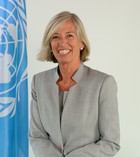
Area Politica internazionale
Competenze: diplomazia culturale, diplomazia scientifica, educazione in situazioni di emergenza, post crisi e conflitti, educazione per la pace e lo sviluppo, eguaglianza di genere per lo sviluppo, intelligenza artificiale, linguistica, politiche e pianificazione dell’educazione, prevenzione della violenza e dell’estremismo attraverso l’educazione, la cultura e la scienza, sociolinguistica, sviluppo sostenibile
Parole chiave: cooperazione internazionale, educazione, educazione di qualità e inclusiva, incitazione all’odio e estremismo violento che favorisce il terrorismo, inclusione, istruzione superiore e ricerca, migrazioni, Obiettivo per lo Sviluppo Sostenibile 4 (SDG4), rifugiati, uguaglianza di genere
Regione: ESTERO
Funzione/Ruolo
Vice Direttrice Generale dell’UNESCO per l’Educazione.
Percorso professionale
Stefania Giannini è stata nominata dall'UNESCO Vice Direttrice Generale per l’Educazione nel maggio del 2018, divenendo la massima autorità nel Sistema delle Nazioni Unite nell’ambito dell’Educazione. In tale ambito, ha il compito di definire la visione strategica e la leadership del Settore dell’Educazione dell’UNESCO a livello globale. E’ responsabile, in tale ruolo, del coordinamento e del monitoraggio nell’attuazione dell’Obiettivo 4 per lo Sviluppo Sostenibile (Quality Education) nell’ambito dell’Agenda 2030.
Precedentemente la Prof.ssa Giannini è stata eletta Senatrice della Repubblica Italiana nella XVII legislatura (2013 – 2018) e Ministra dell’Istruzione, delle Università e della Ricerca (2014 – 2016).
Nello stesso periodo, ha presieduto i Consigli dell’Istruzione e Competitività dell’Unione Europea durante il semestre di Presidenza Italiana (luglio– dicembre 2014), promuovendo il ruolo della creatività, del patrimonio culturale e dell’innovazione come strumenti di dialogo e cooperazione internazionale, con un particolare riferimento alla prevenzione dei fenomeni di radicalizzazione e di estremismo.
Con un background accademico in ambito umanistico (Laurea in Filologia Classica e PhD in Linguistica), Stefania Giannini è Professoressa di Linguistica Generale dal 1992 ed è stata eletta Rettrice dell’Università per Stranieri di Perugia per due mandati consecutivi (2004 – 2012), essendo la più giovane ed una delle prime donne a raggiungere tale ruolo nella storia della Repubblica italiana.
In tale ambito, è stata membro del Comitato di Selezione del Programma Erasmus Mundus presso la Commissione Europea (2005 – 2009), ed ha esercitato il ruolo di responsabile delle relazioni internazionali nella Conferenza dei Rettori delle Università Italiane (2006 – 2010) e membro della Commissione Nazionale per la Promozione della Cultura Italiana all’estero presso il Ministero degli Affari Esteri italiano (2006 – 2011).
Risultati scientifici
Stefania Giannini ha dedicato la sua carriera alla promozione dell'istruzione come diritto umano fondamentale, attraverso l'importanza del linguaggio, dell'apprendimento permanente, della cultura, della libertà di espressione e di identità, nel tentativo di garantire società più inclusive ed uguali.
Giannini ha coordinato una serie di importanti progetti internazionali nel campo dell'istruzione superiore e della ricerca, contribuendo al miglioramento della cooperazione universitaria tra l'Europa e molti altri paesi, dagli Stati Uniti ai paesi dell'Asia fino al Medio Oriente e al Nord Africa.
Nel suo ruolo di senatrice della Repubblica italiana e ministra dell'Istruzione, dell'Università e della ricerca, Giannini ha sviluppato e attuato una riforma strutturale del sistema educativo italiano, incentrata sull'inclusione sociale e mirata alla consapevolezza culturale.
Attività editoriali e pubblicazioni
Stefania Giannini ha all'attivo oltre 50 pubblicazioni, fra monografie e articoli su riviste di settore specializzate nazionali e internazionali.
Pubblicazioni recenti:
[2019] Giannini S., (a cura e prefazione di) Human Learning in the Digital Era, UNESCO.
[2019] Giannini S., Right to education handbook, UNESCO.
[2019] Giannini S., (a cura e prefazione di) UNESCO ICT Competency Framework for Teachers, UNESCO.
[2018] Giannini S., (a cura e prefazione di) Behind the numbers: ending school violence and bullying, UNESCO.
[2018] Giannini S., (a cura e prefazione di) Guidebook on education for sustainable development for educators: effective teaching and learning in teacher education institutions in Africa, UNESCO.
Riconoscimenti e premi
Grand’Ufficiale al Merito della Repubblica Italiana.
Honorary Professor at Bejing Beiwei University.

Funzione/Ruolo
Direttrice Scientifica dell’Osservatorio Turchia -CeSPI
Percorso professionale
Ha studiato a Milano presso l'Università Cattolica del Sacro Cuore, dove si è laureata in Scienze Politiche e Relazioni Internazionali con il massimo dei voti e dove ha conseguito una laurea summa cum laude in Relazioni Internazionali e Integrazione Europea. Presso l'Università Cattolica di Milano ha conseguito anche il dottorato di Ricerca in Istituzioni e Politiche con una tesi su "AKP (Adalet ve Kalkınma Partisi) e il suo programma di Democrazia Conservativa". È attiva in Turchia sin dal marzo 2009 come ricercatrice e docente. Ha lavorato come Docente di Relazioni Internazionali presso l’Università dell’Associazione dell’Aereonautica Turca ad Ankara, presso il Dipartimento di Scienze Politiche e Relazioni Internazionali dell’Università Sabahattin Zaim a Istanbul e come visiting scholar presso l'Università Yildirim Beyazit di Ankara, presiedendo il corso sul processo di democratizzazione nei Paesi musulmani, e Università Gazikent a Gaziantep. In precedenza è stata visiting researcher presso il Dipartimento di Relazioni Internazionali dell'Università Boaziçi di Istanbul, e ad Ankara ha collaborato con il Centro di studi europei dell'Università di Ankara (ATAUM) e presso il Centro di studi europei dell'Università tecnica del Medio Oriente (CES). In qualità di esperta di Turchia, collabora con Think Tanks e partecipa a riunioni strategiche di alto livello È autrice di numerose analisi e articoli che ha presentato a livello internazionali. Tra le altre cose, è coordinatrice scientifica di EİEAD (European Institute of Eurasian Dialogue), membro del comitato editoriale di Mondo Operaio, giornale di politica e società e membro del comitato scientifico di ReaCT (Osservatorio Nazionale sul Radicalismo e il Contrasto al Terrorismo. Dal 2018 collabora regolarmente su questioni di rilevanza internazionale come op-ed per il quotidiano turco Daily Sabah e come analista per la piattaforma digitale The New Turkey. Dal 2019 è Direttrice scientifica dell'Osservatorio Turchia- CeSPI. Per la sua oggettività analitica e il suo impegno a sostegno della diplomazia italiana in Turchia, nel 2017 è stata insignita del titolo Cavaliere dell'Ordine della Stella d'Italia dalla Presidenza della Repubblica Italiana.
Risultati scientifici
Dal 2009 si occupa di Turchia e contemporanee dinamiche politiche. Ha studiato dall’İnterno il fenomeno AKP e i processi di normalizzazione e trasformazione della politica turca culminate con l’avvio del presidenzialismo esecutivo nel giugno 2018. Nello specifico i suoi interessi di ricerca riguardano la transizione democratica turca all'interno della politica turca contemporanea, le relazioni Turchia-UE, la politica estera turca e le relazioni tra religione e politica. Tiene regolarmente lezioni e seminari su relazioni İnternazionali e Turchia presso Università e Centri Studi. Partecipa a Convegni e conferenze e come esperta è chiamata a dare il suo contributo a emittenti radio- televisive e testate giornalistiche. È autrice di analisi e commentari pubblicati in diverse riviste geopolitiche.
Attività editoriali e pubblicazioni
[2020] Giannotta V. and Andrea Locatelli, Tra il califfo e il sultano: la guerra allo Stato Islamico, il contributo dei curdi e il ruolo della Turchia, in D. Fiammenghi (ed),L’evoluzione del terrorismo islamico. Dalle Primavere Arabe al ritiro americano dalla Siria (2011-2020), Edizioni Epoke’, 2020, ISBN 978-88-31327-07-7
[2020] Giannotta V., NATO and Turkey: a fluctuating relationship, in M. Testoni (ed), NATO and Transatlantic Relations in the 21st Century: Foreign and Security Policy Perspectives", Routledge, December 2020, ISBN9781003045434
[2019] Il partito AKP: tra conservatorismo e riformismo, Rivista di Politica, 02/2019, ISSN: 2037-495X
[2018] Giannotta V., Trump, il Mediorente e la Turchia, in Quarenghi A. (ed.),Trump e l'ordine internazionale. Continuità e discontinuità nella politica estera statunitense del XXI secolo, Egea, 2018.
[2018] Giannotta V., Erdoğan e il suo Partito. AKP tra riformismo e conservatorismo, Castelvecchi, 2018.
[2016] Giannotta V., Narratives of the Past and Cultural Heritage in Turkish Party Politics: from Republican Political Myth to Conservative Counter- revolution, in Raudvere, C. (ed.), Contested Memories and the Demands of the Past: History Cultures in the Modern Muslim World,Routledge, London, 2016.
[2015] Giannotta V., Il partito della Nazione,in Mondoperaio, ottobre 2015.
[2014] Giannotta V., La Turchia e l’Azerbaijan(Turkey and Azerbaijan), in Locatelli, A. e Carati, A. Le Relazioni İnternazionali Dell’Azerbaijan,Sandro Teti ed., Roma.
[2013] Giannotta V., La Turchia dopo la primavera Araba (Turkey after the Arab Spring), in Locatelli A., e Parsi, V. E. (ed.),L’onda lunga delle Primavere arabe,Vita e Pensiero, Milano.
[2013] Giannotta V., European Paradox, Cypriot anathema, in Rivista della Cooperazione Giuridica Internazionale (İnternational Cooperation Law Review), XXV, 43.
[2013] Giannotta V., AKP as Social and Political Center, in ISZU, journal of Social Sciences, spring issue, 2013.
Riconoscimenti e premi
"Cavaliere dell'Ordine della Stella d'Italia", insignita nel 2017 dalla Presidenza della Repubblica Italiana per l'obiettività delle analisi e delle attività a sostegno della diplomazia italiana e gli sforzi per costruire un ponte culturale tra l'Italia e la Turchia.
Il libro Erdoğan e il suo partito. AKP tra Riformismo e conservatorismo ha ricevuto il Premio Speciale Cerruglio 2019 per la saggistica contemporanea.

Area Politica internazionale
Competenze: economia e politica internazionale, economia europea, politiche di sviluppo
Parole chiave: Africa sub sahariana, Brexit, catene globali del valore, Cina, coronavirus, Covid-19, Covid-19 e imprese italiane, Covid-19 e Mediterraneo, Covid-19: impatto socio-economico, Covid-19: impatto sulle catene globali del valore, Covid-19: manifattura e servizi, Crisi finanziaria e crisi Covid-19: differenze, Europa, Medio Oriente e Nord Africa, paesi emergenti, produttività, protezione sociale, sviluppo economico, via della seta
Regione: Toscana
Funzione/Ruolo
Professoressa ordinaria di Economia Politica e pro rettrice per le relazioni internazionali all'Università di Firenze
Percorso professionale
Giorgia Giovannetti è prorettrice per le relazioni internazionali e professoressa ordinaria di economia presso l'Università di Firenze, visiting professor presso l'Istituto Universitario Europeo (EUI) e New York University- sede di Firenze, e membro del "consiglio di Reggenza" della Banca d'Italia-Firenze. È stata la direttrice scientifica del primo e secondo Rapporto Europeo sullo sviluppo (ERD 2009 e 2010); ha diretto l’Ufficio studi dell'Istituto italiano del commercio-ICE (2005-2007). Ha un dottorato in economia a Cambridge-UK e una laurea con lode in Statistica a Roma-Sapienza. È stata fellow del Trinity College di Cambridge (1990-1995) e visiting professor in diverse università (Università Pompeu Fabra -UPF, Hoover Institution- Stanford, Universitat Torcuato de Tella). È (o è stata) nei comitati di redazione di IEMed Mediterranean Yearbook, dal 2010; Rapporto Commercio Estero, ICE, dal 2004; Economia Italiana, Journal of Unicredit, 2011-2014; Fondazione Manlio Masi, dal 2007, Italian Economic Journal, dal 2017. Ha pubblicato su importanti riviste accademiche e presentato nelle principali conferenze internazionali. È stata consulente del Ministero degli Affari Esteri e della Cooperazione Internazionale, Ministero dell’Economia e Finanza, Ministero del Commercio Estero, Commissione Europea, Banca Mondiale, Global Development Center. È fellow del centro studi Luca D’Agliano e della Fondazione Ferdi.
Risultati scientifici
L’attività di ricerca di Giorgia Giovannetti si svolge nel campo dell’economia internazionale e economia dello sviluppo. Giovannetti si è dedicata a studiare la produttività e competitività delle imprese sia nei paesi industriali (con particolare attenzione all’Italia) che nei paesi in via di sviluppo. Ha studiato in particolare come la partecipazione alle catene globali del valore influenzi la produttività delle imprese e al tempo stesso la possibilità di un paese di cogliere opportunità di sviluppo. Ha inoltre studiato l’economia della Cina sia per capire se ed eventualmente in che misura le esportazioni cinesi “spiazzano” quelle italiane e tedesche e quelle dei paesi africani, sia per individuare le motivazioni dietro gli investimenti cinesi lungo la via della seta. Nel tempo si è occupata di politiche economiche europee e di Brexit e di problemi di paesi africani in condizioni di fragilità e conflitto nonché del ruolo della protezione sociale in paesi in via di sviluppo.
Attività editoriali e pubblicazioni
[2018] Giovannetti, G., The Dynamics of Foreign Direct Investments in Land and Pollution Accumulation, Environmental and Resource Economics with Borghesi, S., Iannucci GL and Russo.
[2018] Giovannetti, G., The Role of Trade and Offshoring in the Determination of Relative Wages and Child Labour, in The Journal of International Trade & Economic Development RJTE Global, with S. Cigno and L. Sabani, volume 27, number 3.
[2017] Giovannetti, G., Del Prete, D., Marvasi, E., Global Value Chains: new evidence for North Africa, International Economics, November 2017, Volume 153, Issue 4, pp 675–701.
[2017] Giovannetti, G., MArvasi, E., Governance, value chain positioning and firms' heterogeneous performance: The case of Tuscany, International Economics, 2017.
[2017] Giovannetti, G., Del Prete, D., Marvasi, E., Value Chains Participation and Productivity Gains for North African Firms, Review of World Economy.
[2017] Giovannetti, G., Ricchiuti, G., Velucchi, M., Size and technology: The Odd Couple for affiliates survival, in Structural Change and Economic Dynamics, Volume 40, March 2017, Pages 64-71.
[2016] Giovannetti, G., Ticci, E., Determinants of biofuel-oriented land acquisitions in Sub-Saharan Africa, in Renewable & Sustainable Energy Reviews.
[2016] Giovannetti, G., Marvasi, E., Food Exporters in Global Value Chains, in Food Policy, 2016.
[2016] Giovannetti, G., Sanfilippo, M., China’s competition and the export price strategies of developed countries, in International Review of Applied Economics, 2016, volume 30, number 2.
[2015] Giovannetti, G., Sanfilippo, M., Marvasi, E., Supply chains and the internationalization of small firms, in Small Business Economics.
[2013] Giovannetti, G., Ricchiuti, G., Velucchi, M., Location, Internationalization and Performance of Firms in Italy: a Multilevel Approach, in Applied Economics, 2013, volume 45, issue 18.
[2013] Giovannetti, G., Cuffaro, N., Monni, S., Foreign Acquisitions of Land in Developing Countries. Risks, Opportunities and New Actors , in QA – Rivista dell’Associazione Rossi-Doria, n. 2, 2013.

Funzione/Ruolo
Professoressa associata in Storia e istituzioni dei Paesi Islamici all'Università degli Studi di Milano
Percorso professionale
Si forma in Studi islamici con un Master e in Storia con un dottorato presso l’Università di Cambridge. Dal 1994 al 2001 lavora in Giordania, Italia e in diversi Paesi asiatici nel settore della cooperazione allo sviluppo. Nel 2002 diventa ricercatrice presso l’Università degli Studi di Milano e inizia a insegnare diversi corsi sulla storia e le istituzioni del Medio Oriente. Da allora ha insegnato anche in altri Atenei, ha svolto numerose attività di referaggio accademico e di divulgazione; nel 2013 è stata visiting scholar presso l’Università di Cambridge. Di recente ha fondato insieme ad alcune colleghe una nuova rivista on-line e partecipa da anni ai comitati di redazione e di direzione di diverse riviste accademiche (Rivista italiana di storia internazionale; Afriche & Orienti; Quaderni Asiatici; Storia delle Donne).
Risultati scientifici
Elisa Giunghi segue principalmente quattro principali filoni di ricerca. Il primo è incentrato sull’evoluzione e sull’interpretazione della shari’a in sede giudiziale, nei paesi musulmani e in Europa; il secondo riguarda le dispute confinarie tra Afghanistan e Pakistan; il terzo è il tema dell’autorità religiosa e del suo rapporto con il potere politico; il quarto il trasferimento di tecnologia militare all’Afghanistan tra la fine dell’Ottocento e gli anni ’90. Su ciascuno di questi temi ha scritto saggi e monografie e tenuto relazioni a conferenze e seminari.
Attività editoriali e pubblicazioni
Monografie
[2017] Giunchi E., Nel nome di Allah: l’autorità religiosa nell’Islam. Jouvence.
[2009] Giunchi E., Pakistan: islam, potere e democratizzazione. Carocci.
[2007] Giunchi E., Afghanistan: Storia e società nel cuore dell’Asia. Carocci.
Recenti articoli in riviste accademiche e saggi
[2019] Giunchi E., Democratization and the relevance of history: the case of Pakistan, in Nuovi autoritarismi e democrazie: diritto, istituzioni, società (NAD), 1, 1.
[2019] Giunchi E., La proliferazione di armi in Afghanistan: una prospettiva di lungo periodo, in Giunchi E. - Ponti C. (eds.), Le armi nel mondo contemporaneo: proliferazione, regimi di controllo e prospettive di disarmo, Giappichelli.
[2018] Giunchi E., Il concetto di sovranità divina nella Costituzione pakistana: uno strumento per espandere o limitare i diritti fondamentali?, in Afriche e Orienti, XX, 1-2.
[2015] Giunchi E., Jihadists, the web and the issue of religious authority, in L. Tomè (ed.), Islamic state. The new global jihadist phenomenon.
[2014] Giunchi E.,Muslim Family Law and Legal Practice in the West: An Introduction, in Giunchi E., (ed.), Muslim family law in Western courts, Routledge.
[2013] Giunchi E.,Islamization and judicial activism in Pakistan: what šarīʻah?, Oriente Moderno, 93, 1.
[2013] Giunchi E., The Durand Line: an historical perspective, Internationales Asienform, 44, 1-2.
[2011] Giunchi E, Democratic Transition and Social Spending: the case of Pakistan in the 1990s, Democratization, 18, 6.
[2010] Giunchi E., The reinvention of the sharī‘a under the British Raj: In search for authenticity and certainty,Journal of Asian Studies, 68, 4.
Riconoscimenti e premi
Nel 2018 ha ricevuto dall'Università degli Studi di Milano fondi premiali FABBR per la produttività scientifica.

Area Politica internazionale
Competenze: analisi politica estera, arte e politica, diplomazia culturale, Europa centro-orientale, politica estera del Regno Unito, politica estera europea, politica estera russa, relazioni internazionali, sicurezza
Parole chiave: coronavirus, Covid-19, Covid-19: geopolitica dei vaccini, Regno Unito, Unione Europea
Regione: Toscana
Funzione/Ruolo
Docente di Relazioni internazionali, Scuola Sant’Anna Pisa e Senior Associate Research Fellow, ISPI, Milano
Percorso professionale
Laureata in Scienze Politiche alla Cesare Alfieri di Firenze, ha ottenuto il Master in European Studies presso il Collegio d’Europa-Bruges nella sede di Varsavia e il dottorato di ricerca presso l’Istituto Universitario Europeo di Fiesole. Ha lavorato per la Commissione europea, Unicef-icdc ed è stata osservatrice elettorale per l’OSCE. È stata Visiting Researcher presso la Universityof Westminster London. Ha svolto attività didattica presso l’Università Cattolica di Milano, la Luiss di Roma, la New York University (sede di Firenze), Pázmány Péter Catholic University, Budapest, Kazakh Humanitarian Law University, Novosibirsk State University. Dal 2014 insegna Relazioni internazionali alla Scuola Sant’Anna di Pisa.
Risultati scientifici
Serena Giusti si occupa dei paesi dell’Europa centro orientale e della Russia soprattutto nelle loro relazioni con l’Unione europea. Ha inoltre studiato le dinamiche della politica estera e di sicurezza sia della Ue che di altri attori. Ha vinto (2017) un Jean Monnet Activities project "EU-Russia, Connecting People and Ideas Revolution, Post-Soviet Space”- 587038-EPP-1-2017-1-IT-EPPJMO-PROJECT e nel 2014 un modulo Jean Monnet: “The EU’s responses to the challenges of its Neighbourhood”, Grant Decision n.2014 2539/553495. Dal 2018 è partner del progetto guidato dall’Università di Bolzano: The use of Art in the Public Domain and the Politics of Heritage (Politage). E sempre nel 2018 ha ricevuto un finanziamento dal MAE per il progetto Le nuove sfide della protezione del patrimonio culturale: il ruolo dell’Italia come potenza culturale.
Attività editoriali e pubblicazioni
Ha pubblicato estensivamente sui temi della politica estera europea, di quella russa e sulle relazioni internazionali.
[2019] Giusti, S., Mirkina, I. (a cura di) The EU in a Trans-European Space, External Relations across Europe, Asia and the Middle East, London, Palgrave.
[2019] Giusti, S., “Russia’s Fluctuating Foreign Policy” in F. Bindi (a cura di), Europe and America- The End of the Transatlantic Relationship, The Brookings Institute, Washington, March.
[2019] Giusti, S., “From a regional hegemony to a global power in potency: the EU’s Global Strategy” in Giusti, S., Mirkina, I. (a cura di), The EU in a Trans-European Space, External Relations across Europe, Asia and the Middle East, London, Palgrave.
[2019] Giusti, S., Russo, A. "The Securitisation of Cultural Heritage", International Journal of Cultural Policy, 25(7): 843-857.
[2018] Giusti, S., Talani, L.S., (a cura di) Women in the Mediterranean, London and New York, Routledge.
[2018] Giusti, S., Lamonica, A., Foradori, P. “Reshaping Cultural Heritage Protection Policies at a Time of Securitisation: The Case of France, Italy, and the United Kingdom”, International Spectator, 5(3): 86-101.
[2017] Giusti, S., "Gender Mainstreaming towards the Mediterranean: The Case of the ENP", Journal of Balkan and Near Eastern Studies, 19(5): 524-540.
[2017]Giusti, S., Franco, C., "The Europeanization of Turkey’s Foreign Policy: from Alignment to Misalignment?", in Baracani, E., Calimli, M. (a cura di), European Perspectives on Turkey's Domestic Politics and Foreign Policy, Foundation Bruno Kessler Press, 73-94.
[2017]Giusti, S., "Russia Federation’s posture towards the European Neighbourhood Policy: A Neoclassical Realist Explanation", in Gstohl, S. and Schunz J. (a cura di), Theorizing the European Neighbourhood Policy, London and New York, Routledge, 61-82.
[2016] Giusti, S., "The EU’s transformative power challenged in Ukraine", European Foreign Affairs Review, 2(2): 165-183.
[2014]Giusti, S., Fassi, E., "The European Endowment for Democracy and Democracy Promotion in the EU Neighbourhood", The International Spectator, 49(4):112-129.
[2012] Giusti, S., La Proiezione sterna della Federazione Russa, Pisa, ETS.
Riconoscimenti e premi
Partecipa al gruppo di riflessione sulla sicurezza europea dell’OSCE. E’ vice-presidente del Forum per i Problemi della Pace e della Guerra di Firenze ed è nell’advisory board di Women International Security(WIIS) – Italia.

Area Politica internazionale
Competenze: attori non-statali nelle relazioni Internazionali, cooperazione globale contro il terrorismo ed il crimine organizzato, gestione dei conflitti e delle crisi internazionali, peacekeeping e missioni civili, simulazioni come strumento di insegnamento innovativo
Parole chiave: attori non-statali, conflitti, criminalità, crimini internazionali, libertà accademica, pace, sicurezza, società civile, terrorismo
Regione: Lazio
Funzione/Ruolo
Professoressa ordinaria di Scienza Politica e Relazioni Internazionali presso la Scuola Superiore Universitaria della Difesa, Roma. Professoressa di Political Violence and Terrorism e di Sustainability and Civil Society alla OSCE Academy Bishkek.
Percorso professionale
Dopo la laurea in scienze politiche, indirizzo internazionale, presso l’Università di Messina, consegue il dottorato in Relazioni Internazionali presso l’Università di Catania nel 2004. Docente a contratto di Relazioni Internazionali presso l’Università di Palermo ed assegnista di ricerca presso l’Università di Messina dal 2004 al 2008. Nel 2008, diventa ricercatrice a tempo indeterminato di Scienza Politica presso l’Università di Catania. Nel 2013 consegue l’abilitazione scientifica nazionale a professoressa di II fascia per il settore SPS/04. Dal 2016, è professoressa associata di Scienza Politica presso l’Università di Catania. Nel 2017 consegue l’abilitazione scientifica nazionale a professoressa di I fascia per il settore SPS/04.
Fino a settembre 2023 è professoressa associata di Scienza Politica presso l’Università di Catania, dove ricopre gli incarichi di Delegata del Rettore al Coordinamento Istituzionale Erasmus, Presidente del Corso di laurea magistrale in Global Politics and Euromediterranean Relations (GLOPEM) e vice-coordinatrice del Dottorato in Scienze Politiche.
Daniela Irrera fa anche parte del comitato esecutivo dello European Consortium for Political Research (ECPR) e Chair dello ECPR Working Group on Academic Freedom. E’ stata componente del Governing Council dell’International Studies Association (2019-2021), Segretaria della Società Italiana di Scienza Politica (SISP) (2018-2021), Chair dello ECPR Standing Group on International Relations (2019-2021), Presidente della European Peace Research Association (EuPRA) (2017-2022).
Risultati scientifici
Si occupa dell’influenza degli attori non-statali sulla politica globale, connettendo il potenziale positivo (società civile e ONG) a quello negativo (organizzazioni criminali e gruppi terroristici). Le sue ricerche sono state supportate da diversi programmi di finanziamento quali Fulbright, DAAD, Marie Curie.
E’ Principal Investigator dell’unità UNICT del Progetto Mapping and Organizing Research on Dictatorships: Open access Repository (MORDOR), un Progetto Erasmus + Cooperation Partnership for higher education K220.
E’ inoltre membro dell’azione COST CA21133 – Globalization, Illicit Trade, Sustainability and Security (GLITSS).
Attività editoriali e pubblicazioni
Daniela Irrera è associate editor del Journal of Contemporary European Studies e coeditor della Springer book series Non-State Actors in International Relations, insieme a Marianna Charountaki.
Ha numerose pubblicazioni, monografie, curatele, capitoli in volume e articoli in rivista (tra le altre, in riviste quali Global Crime, The European Union Review, Perspectives in European Politics and Society, European Foreign Affairs Review).
Qui di seguito, una selezione.
[2022] Irrera D. Les ONG et la vulnérabilité en temps de crise, entre continuité et innovation. HERMÈS, 89: 135-140.
[2021] Irrera D. Non-state actors and conflict management in proxy wars. In Oxford Research Encyclopedia of Oxford Research Encyclopedia of International Studies, Oxford University Press.
021] Irrera D. Managing African conflicts: using CSDP missions to cope with terrorism and organized crime. In V. Fargion & M. Gazibo (eds.), 'Revisiting EU-Africa Relations in a Changing World, Edward Elgar'. Cheltenham, pp. 24-36.
[2020] Irrera D. Simulating conflict resolution dynamics and fostering negotiation skills. OASIS. 33 (oct. 2020), pp. 13-28.
[2020] Irrera D. NGOs in mitigating the effects of COVID-19 on migrants and refugees: A reopening of public space. Policy Brief, 3 (2), 2020, Yasar University UNESCO Chair on International Migration.
[2019] Wong, R. Irrera D. Regional Variations and Crisis. In Jae-Jae Spoon and Nils Ringe (eds.) 'Regional Variations and Crisis Comparing European Union and Association of Southeast Asian Nations Integration Dynamics, in The European Union and beyond'. ECPR Press, Rowan & Littlefield, London, pp. 215-236.
[2019] Irrera D. NGOs and Security in Conflict Zones. In Thomas Davies (eds.), ‘Routledge Handbook of NGOs and International Relations’. Routledge, London.
[2018] Irrera D. The Relevance of Third-Party Intervention. (Virtual Special Issue), Conflict Management and Peace Science.
[2018] Irrera D. Organised Crime: balancing between national constraints and global necessities. In Ripoll Servent, Ariadna & Trauner, Florian (eds.), ‘Routledge Handbook of Justice and Home Affairs Research’. Routledge, London.
[2018] Irrera D. EU Emergency Response Policies and NGOs. Trends and Innovations. Palgrave, Basingstoke.
[2016] Irrera D. Migrants, the EU and NGOs: The ‘Practice’ of non-governmental SAR operations. Romanian Journal of European Affairs, 16 (3), pp. 20-35.
[2014] Stavridis S. Irrera D. The European Parliament and its International Relations. Routledge, London.
Riconoscimenti e premi
2019 Grant ISA “The United Nations At 75”, Geneva.
2019 Marie Curie Secondment H2020-Marie Sklodowska Curie Actions-RISE, “KANTINSA - Kant in South America”, Universidade Federal de Santa Catarina, Florianopolis, Brazil.
2020 Premio alla simulazione Game of Peace, the best European teaching practices that enhance learning for international students (IMPACT Project).

Area Politica internazionale
Competenze: politica estera europea, politica internazionale, politiche migratorie, relazioni internazionali, sicurezza internazionale, Unione Europea
Parole chiave: elezioni, istituzioni europee, migrazioni, partiti politici europei, sistema politico dell'Unione Europea
Regione: Sicilia
Funzione/Ruolo
Professoressa ordinaria di Scienza Politica, Relazioni Internazionali e Sistema Politico dell’Unione Europea presso l’Università di Catania. Presidentessa della Società Italiana di Scienza Politica.
Percorso professionale
Si è laureata in Scienze Politiche, indirizzo Internazionale, presso l’Università di Catania e ha ottenuto il Dottorato in Relazioni Internazionali presso l’Università di Padova. È professoressa ordinaria di Scienza Politica e Relazioni Internazionali. È titolare della Cattedra Jean Monnet in European Union Policy. Ha ricoperto la carica di Senatrice Accademica presso l’Ateneo di Catania e di Delegata del Rettore dell’Università di Catania alle Relazioni Internazionali. È componente del collegio dei Docenti del Dottorato in Political Science and Sociology della Scuola Normale di Pisa/Firenze. È coordinatrice dello Standing Group on Organized Crime dello European Consortium for Political Research.
Risultati scientifici
I suoi interessi di ricerca si sono sempre focalizzati su temi legati all’Unione Europea. Ha iniziato studiando la politica estera dell’Unione e nel corso dei suoi studi ha poi trattato la struttura del sistema politico dell’UE e i processi di formazione delle politiche comuni. In particolare le sue ricerche attuali sono focalizzate sulle politiche di sicurezza interna ed esterna dell’Unione Europea nonché sulle politiche di immigrazione dell’Unione e dell’Italia. Su questi argomenti attualmente sta coordinando un gruppo di ricerca presso l’Ateneo di Catania. Si occupa anche di analisi della politica estera italiana.
Attività editoriali e pubblicazioni
Le sue ultime pubblicazioni sono:
[2019] Longo F. e Isernia P., La Politica Estera Italiana nel Nuovo Millennio, Il Mulino.
[2018] Longo F., Italy and the refugees crisis, in Journal of Political & Military Sociology, 45.
[2017] Longo F. e Isernia P., The Italian foreign policy: challenges and continuities, in Rivista Italiana di Scienza Politica, 47, p. 107-124.
[2016] Longo F., ‘La politica di immigrazione dell'Unione Europea tra vecchie e nuove sfide’, inPanebianco S. (a cura di),Sulle onde del Mediterraneo: Cambiamenti globali e risposte alla crisi migratoria. EGEA.
[2016] Longo F., ‘A party system without a party government in the European Union?’, in Mascia M. (ed.), Toward a European Transnational Party System, AUSE Ed.
[2015] Longo F., ‘La Criminalità Organizzata’, in Foradori P, Giacomello G. (a cura di), Sicurezza Globale. Le Nuove Minacce.Il Mulino.
[2013] Longo F., Justice and Home Affairs as a New Dimension of the European Security Concept. in European Foreign Affairs Review, 18, p. 29-46.
[2013] Longo F., The Relevance of Security Sector Reform in Humanitarian Intervention: The Case of the European Union in the Mediterranean, in Democracy and Security, 9.
[2012] Longo F., ‘Justice and Home Affairs as a new Tool of European Policy: The Case of Mediterranean Countries’, in AA.VV, The Foreign Policy of the European Union: Assessing Europe's Role in the World, second updated edition. p. 85-96, Brookings Institution Press.
Riconoscimenti e premi
Nel settembre 2018 è stata eletta Presidente della Società Italiana di Scienza Politica.

Funzione/Ruolo
Associate Research Fellow presso ISPI e PhD Candidate in Storia presso l’Università di Bologna
Percorso professionale
Chiara Lovotti è Associate Research Fellow presso l’Osservatorio Medio Oriente e Nord Africa dell'ISPI. Precedentemente è stata Research Assistant presso l'Università Cattolica di Louvain-la-Neuve. È dottoranda presso la facoltà di Storia dell'Università Alma Mater Studiorum di Bologna. Ha conseguito una laurea in Lingue straniere e relazioni internazionali presso l'Università Cattolica di Milano, un Master in Studi dello sviluppo presso l'Università di Louvain, in Belgio, un altro Master in Studi mediorientali presso l’Alta Scuola di Economia e Relazioni Internazionali di Milano, e ha trascorso diversi periodi di studio presso l'Università statale Lomonosov di Mosca.
Risultati scientifici
I filoni di ricerca in cui è attiva riguardano le trasformazioni politiche in Medio Oriente, con particolare attenzione a Iraq e Siria, alle relazioni tra Russia e i paesi mediorientali e alla politica estera russa verso quest'area. Attualmente, le sue ricerche accademiche riguardano l'impatto dell’Unione sovietica nei processi di state-building nei paesi arabi post-coloniali.
Per l’ISPI si occupa dell’organizzazione della conferenza “Rome MED – Mediterranean Dialogues”, il Forum annuale promosso con il Ministero degli Affari Esteri e della Cooperazione Internazionale, che riunisce i leader delle due sponde del Mediterraneo – e non solo – con lo scopo di fornire una piattaforma di dialogo e di discussione su tematiche quali sicurezza, economia, energia e trasformazioni sociali.
Attività editoriali e pubblicazioni
[2019] Lovotti C. The Role of Russia in the Middle East and North Africa Region. Strategy or Opportunism?
[2019] Lovotti C. The "Syraqi" Chessboard: Who Leads the Play?
https://www.ispionline.it/it/pubblicazione/syraqi-chessboard-who-leads-play-22460
[2018] Lovotti C. Russia in the Middle East: The Biggest Challenge is Yet to Come
https://www.ispionline.it/it/pubblicazione/russia-middle-east-biggest-challenge-yet-come-22468
[2018] Lovotti C. Iraq's Election: Turning the Page?
https://www.ispionline.it/it/pubblicazione/iraqs-election-turning-page-20468
[2018] Lovotti C. La Russia in Medio Oriente. Una presenza destinata a durare?

Funzione/Ruolo
Ricercatrice Associata presso il Robert Schuman Centre for Advanced Studies, Istituto Universitario Europeo (Firenze)
Percorso professionale
Ha studiato Scienze Politiche presso l’Università degli Studi di Firenze, seguito da un Master in Relazioni Internazionali ottenuta presso l’Università della Città di New York (CCNY) e un dottorato all’Università di Deusto (Bilbao) nell’ambito di un progetto Marie Curie su politiche migratorie e di integrazione in Europa (http://www.integrim.eu/). Da sempre interessata alle dinamiche di potere tra minoranze, maggioranze e stati, alle diversità culturali e alla giustizia sociale, da anni cerca di coniugare ricerca scientifica e impatto sociale della stessa. Per questo ha seguito una traiettoria professionale non lineare, alternando attività di ricerca universitaria a lavoro in organizzazioni internazionali.
Ha lavorato come ricercatrice, analista politica e traduttrice in Guatemala, Stati Uniti, Belgio, Ungheria, Italia, Spagna e Zimbabwe. Dopo un decennio passato all’estero, a fine 2018 è tornata a Firenze, dove è attualmente ricercatrice associata all’Istituto Universitario Europeo nell’ambito di un progetto che compara diversi modelli di gestione della diversità religiosa e di prevenzione della radicalizzazione.
Risultati scientifici
Si occupa di politica comparata, con particolare attenzione per i diritti delle minoranze e l'inclusione sociale. Nel 2012 ha lavorato alla Direzione per il coordinamento delle politiche (DG REGIO) della Commissione Europea nell'ambito di misure a favore dell'inclusione sociale di comunità marginalizzate. Questa esperienza ha contribuito fortemente alla scelta di perseguire un dottorato su questo argomento, che è diventato un progetto di ricerca sui punti di forza e di debolezza delle politiche rivolte alle minoranze rom e migranti in Italia e Spagna.
Quello che può sembrare un ambito di nicchia (le politiche rivolte a minoranze etniche, linguistiche o religiose) in realtà ha molto a che vedere con le dinamiche più ampie di razzismo e di discriminazione strutturale che condizionano gran parte dell'agenda politica delle contemporanee democrazie europee. Il filone di ricerca su ‘minoranze’ è quindi funzionale a capire i meccanismi di inclusione sociale, economica e politica delle società nel loro complesso.
Dopo aver passato un anno in Zimbabwe, lavorando nell'unità di Scienze Sociali ed Umane dell'ufficio UNESCO per l’Africa australe, il progetto in cui lavora al momento cerca di superare la prospettiva eurocentrica spesso adottata nella ricerca accademica sulla diversità religiosa, guardando invece a modelli di governance delle religioni in Medio Oriente, Asia ed Oceania.
Dal 2015 collabora con WOTS, un progetto editoriale il cui scopo è quello di divulgare la ricerca sociale coniugando stile giornalistico e rigore scientifico, come caporedattrice delle sezioni ‘cittadinanze e minoranze’ e ‘migrazioni e frontiere’. Sempre per quanto riguarda l’ambito divulgativo, nel 2016 un brevissimo cortometraggio realizzato per un corso di metodologie audiovisive è stato selezionato dal Forum Mondiale per la Migrazione e lo Sviluppo per contribuire al dibattito su migrazioni e stereotipi.
È collaboratrice abituale al processo di revisione tra pari per le riviste Journal of Immigrant & Refugee Studies, Social Inclusion, Journal of Ethnic and Migration Studies, East European Journal of Society and Politics, e Configurações.
Attività editoriali e pubblicazioni
È autrice di numerose pubblicazioni scientifiche su riviste internazionali, fra cui:
[2019] Magazzini, T., Piemontese, S., Constructing Roma Migrants: European Narratives and Local Governance, IMISCOE Book series, Springer. Proposta di libro vincitore del premio IMISCOE Springer 2017 e pubblicato gratuitamente in Open Access.
[2018] Magazzini, T., What’s in a name? Causes and consequences of labeling minorities as ‘national’ or ‘migrant’: Roma in Italy and Spain, International Migration, Vol. 56, Special Issue The Changing Face of Migration: Future Challenges for Societies.
[2017] Magazzini, T., Making the most of super-diversity. Notes on the potential of a new approach, inPolicy & Politics, Vol.45, No. 4, ISSN: 1744-2648, pp. 527-545.
[2016] Magazzini, T., Cultural institutions as a combat sport. Reflections on the European Roma Institute, in The Age of Human Rights Journal,No. 7, Special Issue, Identity and Cultural Integration, ISSN: 2340-9592, pp. 50-76.
[2016] Magazzini, T., Piemontese, S., Roma’ migration in the EU: the case of Spain between ‘new’ and ‘old’ minorities, in Migration Letters, Vol.13, No.2, Special Issue Protecting and including “new” and “old” minorities: opportunities, challenges, synergies, ISSN: 1741-8984, pp. 228-241.
Riconoscimenti e premi
2018: Marie Sklodowska-Curie Actions Seal of Excellence e Marie Curie Alumni Association Social Impact Award.



